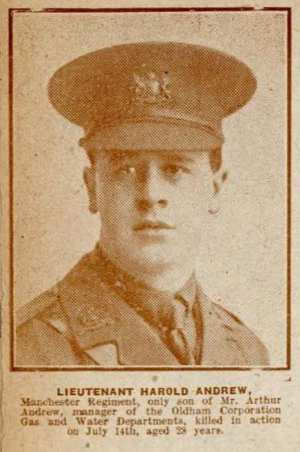
Photograph from the "Oldham Chronicle,
4th War Supplement", 23rd December 1916.
Harold Andrew was born in Oldham on 14th February 1888, the only son of Arthur Andrew, general manager at the Oldham Gas Works. Prior to coming to Oldham Hulme Grammar School in September 1896 he had been educated privately. He remained at school until Easter 1902. In 1911 he was living with his parents and two sisters in Chadderton and working as a draughtsman in gas engineering at the Oldham Gas Works.
Shortly after the war started, he enlisted on 21st November 1914 with the 24th (service) Battalion, also known as the Oldham Pioneers or Pals Battalion, of the Manchester Regiment. He was soon discharged to take up a commission and from 1st January 1915 served as 2nd lieutenant, later lieutenant, and commander of Platoon XV of 'D' Company, departing for France in November 1915.
He was killed in action on 14th July 1916 at the Somme when a shell exploded in front of him, fatally wounding him in the leg. He was 28 years of age. He is commemorated at Thiepval, the memorial to the missing of the Somme.
Harry Ashton was born in Oldham on 15th August 1886, the son of James Ashton, a building contractor of Hollinwood. He attended Werneth Board School before coming to Oldham Hulme Grammar School in September 1895. After leaving school at Easter 1903 he worked in his father's company as a clerk.
He enlisted as a private on 8th December 1915 with the 3rd Battalion of the South Lancashire Regiment. He does not appear to have served overseas and on 4th October 1917 was declared fit for indoor sedentary work only. He was transferred firstly to the Royal Field Artillery 7th Reserve Battery on 11th November 1917, and then on 29th November 1917 to the 1129th Battery at Bacton on Sea (possibly as a driver). On 26th October 1918 he was transferred to the Army Service Corps at Romsey and was demobilized on 23rd October 1919.
He later became a poultry farmer with his brother James in Oswestry, where he died on 30th June 1954.
Herbert Ashton was born in Oldham on 29th December 1887, the son of Alfred Ashton, an accountant. He attended Derker Board School before coming to Oldham Hulme Grammar School in September 1901. After leaving school at the end of 1904 he worked as a bank clerk.
On 12th December 1914 he enlisted at Heaton Park as a private with the 16th Battalion of the Manchester Regiment. He was sent to France on 8th November 1915 and, a few months later on 18th February 1916, received gunshot wounds to his left arm and left leg. He was admitted to hospital for 46 days followed by ten days leave.
After officer training he was granted a commission to the York and Lancaster Regiment on 1st March 1917. He served as 2nd lieutenant with them in France and was killed in action at the battle of Cambrai on 27th November 1917. He was 29 year of age. He is commemorated at Cambrai Memorial in Louverval.
John Ashton was born in Blackpool on 2nd June 1891, the son of James Ashton, a building contractor of Hollinwood. He was educated privately before attending Oldham Hulme Grammar School from September 1901 to Easter 1907. On leaving school he joined his father's company.
He enlisted as a private with the 24th Battalion of the Manchester Regiment on 23rd November 1914 and was promoted to sergeant on 1st January 1915. He was discharged to take up a commission with the same regiment on 22nd February 1915 and, according to the history of the Battalion, he served as 2nd lieutenant at the depot and as commander of Platoon XIII, 'D' Company. There is no evidence that he served overseas.
Thomas Vincent Ashton was born in Oldham on 15th October 1895, the son of Alfred Ashton, an accountant. After attending Hollinwood Council School he came to Oldham Hulme Grammar School from September 1908 to the end of the school year in 1911.
He initially enlisted on 15th May 1916 as a private with the Lancashire Fusiliers but at some point was transferred to the Liverpool Regiment. He served overseas but further details are not available. On 27th March 1917 he transferred to the Royal Flying Corps as a driver in the motor transport division. At this time he gave his civilian occupation as 'stripper and grinder'. He was discharged to the reserve on 15th October 1919.
Thomas Vincent Ashton married Mabel Rawstron Sladen in 1929 and their daughter Anna was born the following year. On 9th March 1940 the family boarded the Orient Line ship Orcades in London and headed for Australia. At this time he gave his occupation as 'textile mill manager'. They lived in Williamstown, a suburb of Melbourne, Victoria, before moving between 1954 and 1958 to Wentworth, a town on the border between the states of Victoria and New South Wales.
He died in 1978 at the age of 82.
Charles Frederick Backhouse was born in Oldham on 2nd June 1883, the son of John James Backhouse, a county court clerk. After attending Coppice Board School he came to Oldham Hulme Grammar School in November 1896, leaving at the end of the 1897 school year. He became a clerk with the Manchester and County Bank in Oldham.
Before the war he had served as a volunteer with the 6th (territorial) Battalion of the Manchester Regiment. On 10th September 1914 he enlisted as a private with the 19th Battalion of the Manchester Regiment and was deployed to France in November 1915.
He was listed as missing in action while serving at the Somme, and was later declared to have died on 23rd July 1916. He was 33 years of age. He is commemorated at Thiepval, the memorial to the missing of the Somme.
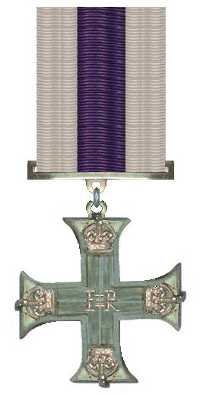
The Military Cross,
awarded to officers for gallantry during
active operations against the enemy.
Alec Joscelyne Bamford was born in Shanghai, China, on 9th April 1885, the son of the Reverend A J Bamford. Much of his education was undertaken privately and he came to Oldham Hulme Grammar School for a very short time in 1897. He graduated MA (Cantab) and BSc (London) before being appointed in January 1913 as Superintendent of the Colombo Observatory in Ceylon (Sri Lanka).
He was mobilised in Ceylon early in the war and was granted a temporary commission as 2nd lieutenant with the Motor Machine Gun Corps, serving in East Africa. He was awarded the Military Cross in 1917 (the citation for which cannot be found). He was transferred to the Survey Company of the Royal Engineers and, on 12th June 1918, promoted to acting Captain. When he relinquished his commission on 11th July 1919 he was granted the rank of Captain.
After the war he married and returned to Ceylon where, in 1931, he wrote a brief history of the Colombo Observatory. He died in England on 19th November 1957 at the age of 72.
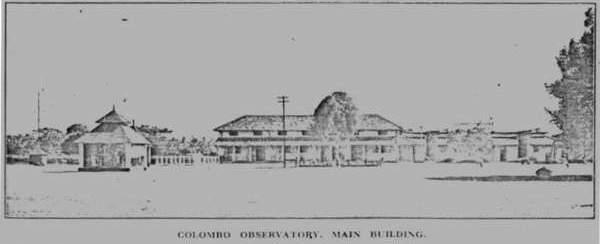
Sketch from The Transactions of the Engineering Association of Ceylon: Colombo Observatory, by A J Bamford, 1931.
Frank Bamford was born in Oldham on 21st June 1893, the son of J E Bamford, a builder's clerk. He attended Waterloo Council School before coming to Oldham Hulme Grammar School from September 1906 for three years. After leaving school he worked as a clerk.
Bamford claimed exemption from military service on conscientious grounds as a member of the Christadelphian Church. At a tribunal in Oldham on 6th March 1916 it was decided that he must go on non-combatant service. His appeal at the Manchester Appeal Tribunal of 29th March 1916 was dismissed. There are no surviving records of his service.
In 1939 he was working as a schoolmaster in Stockport and died there in 1971 at the age of 77.
Frederick James Bancroft was born in Hyde, Cheshire, on 3rd November 1890, the son of Thomas Bancroft, a schoolmaster. After attending the Central Board School in Royton he came to Oldham Hulme Grammar School from September 1903 to December 1906. In 1911 he was working as a bank clerk for the Union Bank of Manchester.
During the war he served in Egypt as a private with the Manchester Regiment. After being wounded by a gunshot to the leg in March 1917 he recuperated at Number 17 General Hospital in Alexandria.
In 1939 he was working as a bank accountant in Crompton. He died in Ormskirk in 1967 at the age of 76.
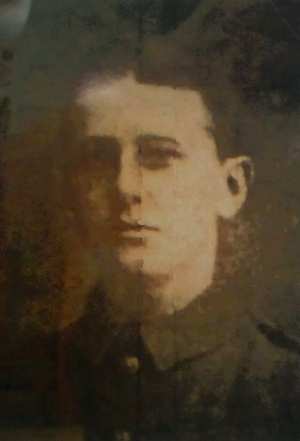
Photograph from a display at Fairfield Moravian Village.
Norman Barber was born in Ashton-under-Lyne on 9th October 1894, the son of Harry Barber, a solicitor. After early private education he came to Oldham Hulme Grammar School at the age of nine in April 1903 and remained for one year. He later attended Manchester Grammar School. In 1911 he was a music student but later worked for the Lancashire and Yorkshire Bank, and played for Ashton Cricket Club.
He enlisted, probably in 1916, as a private with the 2/6th Battalion of the Manchester Regiment. It is not known when he was sent overseas but the Manchester Evening News of 9th May 1917 reports that he was wounded after being shot in both legs and was in hospital in Aberdeen. However, he appears to have recovered and returned to the front line in Flanders.
He was reported missing in action on 10th October 1917 and later assumed to have died on that day. He was 22 years of age. He is commemorated at the Tyne Cot Memorial in Belgium.

The Military Cross,
awarded to officers for gallantry during
active operations against the enemy.
Ralph John Bardsley was born in Stalybridge on 3rd August 1891 but lived in Ashton-under-Lyne. He was the son of George Henry Bardsley, a solicitor. After private primary education he came to Oldham Hulme Grammar School in September 1902, remaining until Easter 1908. He worked as a bank clerk after leaving school and was well known in Ashton for his cricketing skills. In 1915 he married and a daughter was born the following year.
He was granted a commission with the Royal Field Artillery on 7th July 1915 and served as 2nd lieutenant in France from 31st December 1915. He was later promoted to the rank of lieutenant. On 27th May 1918 his unit was involved in the 3rd Battle of the Aisne. His conduct on that day earned him the Military Cross.
Citation: "For conspicuous gallantry and devotion to duty. This officer manned an observation post close to the front line, maintaining communication with the batteries throughout the day, though the telephone line was repeatedly cut. The information sent in by him enabled many parties of the enemy to be engaged and dispersed, a trench full of them having to be evacuated. Although heavily shelled towards evening, he continued to send back useful messages."
However, he was captured by the Germans and initially held at the local village of Craonne. He was then taken as a prisoner of war to the German city of Karlsruhe, and later to Stralsund on the Baltic coast. He was finally repatriated in December 1918.
In 1939 he was working as a bank clerk and living in Blackburn. He died in 1952.
Alan Ffarington l'Anson Barlow was born in Oldham on 26th September 1898, the son of Robert Barlow, a commercial traveller for textile machinery makers, and his wife Caroline, a baker and confectioner. He was educated privately before coming to Oldham Hulme Grammar School in January 1909. He left school in summer 1914 and (according to his army papers) continued his education as an art student.
He enlisted at Oldham on 11th September 1916, days before his 18th birthday, as a private (764529) with the Artists Rifles, the 2/28th Battalion of The London Regiment and was held in reserve until January 1917 when he was posted.
He served in France from January 1918 and was injured (although details are illegible). He finished his service on 25th April 1919.
After the war he became an advertising artist. He and his wife appear to have spent much of their time in Bombay, India, between 1929 and 1956, making trips back to England every few years. From 1937 he was working as an advertising manager for the British India Corporation. He finally returned to England during or after 1956 and resided in Northumberland until his death on 15th March 1990.
Buckley Hanson Barlow was born in Oldham on 17th February 1888, and was brought up by his mother while his father worked away from home. He was educated privately before spending a year at Oldham Hulme Grammar School from April 1902. In 1911 he was a music student.
He was a conscientious objector to the war and from the little information available it would appear that he was told to find work of national importance. His case at the Manchester Appeal Tribunal in April 1917 was adjourned on more than one occasion.
In 1939 he was working as a general labourer in Oldham and died there in 1963 aged 75.
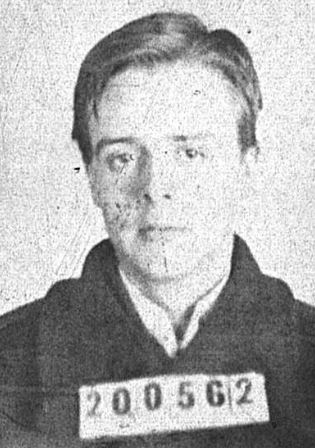
Photograph from Merchant Marine Records.
James Cheetham Barnes was born in Oldham on 31st October 1900, the son of J R Barnes, a commercial clerk. After attending Werneth Council School he received a Hulme Scholarship to Oldham Hulme Grammar School in 1912. He remained at school until July 1915.
Merchant Marine records list him as an assistant wireless operator in 1918.
In 1939 he was a cotton mill secretary living in Saddleworth. He died in Garstang in 1981 aged 80.
William Barratt was born in Hollinwood on 31st May 1899, the son of Richard Barratt, a police sergeant. He attended Waterloo Council School before receiving an Oldham Education Scholarship to attend Oldham Hulme Grammar School in September 1911. He remained in school until summer 1915 when he joined the Union Bank of Manchester as a bank clerk at their Oldham branch.
He enlisted as a private with the King's Own Royal Lancaster Regiment shortly after his 18th birthday on 30th June 1917.
He was posted to the 51st Graduated Battalion of the Welsh Regiment on 13th November 1917, but returned to the King's Own Royal Lancaster Regiment on 6th April 1918.
On 9th September 1918 he was reported missing in the field in France. He had been taken by the Germans as a prisoner of war. He was repatriated on 29th November 1918, arriving at Dover and being conveyed to London. It was noted that he was suffering from a fever of unknown origin and diarrhoea; he was treated in hospital until 23rd December.
He was transferred to the 1st Battalion of the King's Own Regiment on 16th May 1919. At some point during 1919 he had attended a course for the Army School Certificate; it is noted in his file that his was "by far the best paper in the examination".
He returned to banking after the war and died in Hazel Grove in 1960 aged 61.
George Barrett was born in Lees on 22nd May 1899, the son of William Barrett, an engineer. He attended Leesfield Church School and in September 1911 was awarded a Lancashire County Council exhibition and a foundation scholarship to attend Oldham Hulme Grammar School for three years. After leaving school he became a clerk in the office of the Hope Spinning Company in Failsworth. He was assistant secretary of Salem Moravian Sunday School.
He enlisted shortly after his 18th birthday on 23rd June 1917 as a private with the Royal Fusiliers and was later transferred to the 9th Battalion of the Royal Sussex Regiment. He went on active service on 3rd April 1918.
He was killed in action in the Pas de Calais area of France on 31st May 1918 at the age of 19. He is commemorated at Bully-Grenay Communal Cemetery, France.
James Harold Beaumont was born in Oldham on 22nd April 1885, the son of Jonathan Beaumont, a schoolmaster. He attended St James' School, Hollinwood, and came to Oldham Hulme Grammar School in September 1896. He remained at school until the end of the school year in 1900, after which he secured a position with the Post Office in Manchester as a 'learner'.
Over the years he progressed in his career, moving with his family to London at some point. In 1907 he was appointed to the post of assistant examiner at the Patent Office.
We know from his medal card that he was sent to France on 22nd September 1914 and was granted a commission with the Army Service Corps six days later. It therefore seems likely that he was or had previously been a member of the territorial force before the war. He was promoted to captain on 1st August 1915 and to major on 25th December 1917. He is believed to have worked in the Abbeville area of France but the type of work he was undertaking is unknown.
He appears to have returned to the Post Office after the war and died on 20th May 1932 at the age of 47.
Thomas Elliott Beaumont was born in Carrington, Cheshire, on 11th December 1894, the son of Hubert Beaumont, a bank clerk. The family moved to Delph where Thomas attended Delph Wesleyan School. He came to Oldham Hulme Grammar School in September 1908 and remained for three years. He worked for some time at Glodwick Road Station, and then as a grounds-man at Diggle Rifle Range.
He enlisted as a private with the 10th Battalion of the Manchester Regiment, probably in late 1914. He was deployed to the Dardanelles on 15th May 1915 and was wounded shortly thereafter. He is listed as being evacuated from Gallipoli.
Almost two years later he joined his Battalion in France. He was killed in action at the Somme on 26th June 1917 at the age of 22. He is commemorated at Thiepval, the memorial to the missing of the Somme.
Albert Beech was born in Heaton Chapel on 3rd July 1894 the son of Handel Beech, a cotton spinner. After attending Werneth Council School he came to Oldham Hulme Grammar School in 1908, leaving in 1910 to start work as a clerk.
When he joined the Royal Flying Corps as an air mechanic on 28th October 1915 he gave his civilian occupation as motor cyclist. He embarked with the 40th Squadron to France on 18th August 1916. He was promoted to class 1 air mechanic on 1st February 1917 and to corporal on 1st October of that year. He returned to England on 24th September 1918.
In 1939 he was a filling station proprietor in Ashton-under-Lyne. He died there on 15th March 1949 at the age of 54.
John Herbert Bentley was born in Cornwall on 15th November 1886, the son of Joseph Bentley, a Methodist Minister. After attending Bury High School he came to Oldham Hulme Grammar School in September 1899. He left school in July 1903 when the family moved from Oldham. In 1911 he was working for the National Provincial Bank in Islington, London.
He was granted a commission and served as 2nd lieutenant with the Gloucestershire Regiment in France in 1918. No further information is available.
After the war he worked as a bank clerk in Cardiff. In 1939 he was a bank manager in Bristol. He died there on 30th January 1963 at the age of 76.
William Thomas Billington was born in Moorside, Oldham, on 30th November 1898, the son of John Holt Billington, a cotton weaving manager. The family moved to High Crompton where he attended High Crompton School. He came to Oldham Hulme Grammar School in September 1910 and remained for three years, after which he became a clerk.
He enlisted as a private with the Royal Army Medical Corps on 30th October 1915, a month before his 17th birthday; he gave his age as 19. It was noted on his report that he had an upper pair of false teeth. It would seem that someone realised he was not of age and placed him on home service only; he appears to have worked at a hospital in Oxford.
On 8th December 1916, shortly after his 18th birthday, he volunteered to serve overseas; he was posted to Mesopotamia on the 25th December. In 1919 he was discharged to the army reserve.
In 1939 he was a chartered secretary in textile manufacturing, living in Milnrow. He died in 1968.
Percy Hall Birch was born in Oldham on 27th October 1889, the son of Thomas Birch, an accountant. He attended Werneth Board School before coming to Oldham Hulme Grammar School in January 1899. He left at the end of the school year in 1905 and in 1911 is shown on the census as an accountant. He married Gladys Knott Hammersley, an old-girl of the school, in 1915.
Although his service records no longer exist we know he joined a Cadet Training Corps and was granted a commission on 17th December 1917 as 2nd lieutenant with the Royal Garrison Artillery 199th Siege Battery.
He was killed in action in the Pas de Calais area of France on 21st March 1918 at the age of 28. He is commemorated at the Arras Memorial in France.
Raymond Bisset-Smith was born in Ashton-under-Lyne on 20th May 1891, the son of John Bisset-Smith, a general medical practitioner.
After being educated at home he came to Oldham Hulme Grammar School in 1902 for a year. Although it is not known where he continued his education he is listed on the 1911 census as an arts student living at a boarding house in Brighton. He qualified MA in 1911 before entering Edinburgh University to study medicine.
He had joined the Officer Training Corps (Infantry) in 1908 and, from 1912 to 1917 was a cadet in the Royal Army Medical Corps (Special Reserve). He qualified MB ChB in 1917 and was commissioned as a lieutenant surgeon in the East African Carrier Corps, serving overseas from 19th May 1917. He was promoted to captain in 1918.
During the 1930s he served aboard the Aguila and Alca, merchant marine passenger ships sailing between Liverpool and Lisbon, Madeira and the Canary Islands. By 1939 he was working in the family medical practice in Ashton-under-Lyne. He died in Leicester in 1978 aged 87.
Albert Knott Blackburn was born in Oldham on 20th April 1883, the son of Ambrose Blackburn, a wheelwright. After attending Waterloo Board School he came to Oldham Hulme Grammar School for two terms from May 1897. He became an engineer with the Post Office.
He served overseas during the war with the Royal Engineers Signals. There is no further information.
After the war he worked as an engineer for the Post Office in Preston and later in Blackpool.
Francis Whitehead Booth was born in Crossbank, Ashton-under-Lyne, on 28th January 1895, the son of William Needham Booth, a commercial clerk and manager. After attending St Cuthbert's School in Lytham he came to Oldham Hulme Grammar School in 1908 for three years. He became a clerk and later a secretary at a cotton spinning mill.
He attested as a private with the 27th Reserve Battalion of the Manchester Regiment in January 1916 but was discharged on 29th March 1916 as he was "not likely to become an efficient soldier" due to suffering from chorea.
He transferred to the Royal Flying Corps on 28th December 1917 as an air mechanic and driver in the UK.
He died in Ashton-under-Lyne in 1938 at the age of 43.
Frederick Kenneth Booth was born in Crossbank, Ashton-under-Lyne, on 14th July 1899, the son of William Needham Booth, a commercial clerk and manager. After attending St John's School, Hey, he came to Oldham Hulme Grammar School in 1909 for a term less than four years. He continued his education at Taunton School.
While still a student there he enlisted as a private with the Royal Field Artillery at Taunton on 10th July 1917. He joined the Cadet School on 18th February 1918 and was recommended for a commission in the Indian Army by his commander although this appears to have been refused. He was transferred as a gunner to the Tank Corps on 26th August 1918 and served in France from 20th October 1918 to 25 December 1918. He was transferred to the reserve on 9th March 1919.
In 1939 he was an estate and insurance agent living in Lees. He died in 1955 in Oldham aged 55.
Robert Sykes Booth was born in Oldham on 5th November 1882, the son of Samuel Booth, a bank cashier. After attending Waterloo Board School he came to Oldham Hulme Grammar School in 1896 for three years. He became a clerk in a cotton mill.
He emigrated to Canada in 1908, working as an accountant in Ontario. He enlisted with the 33rd Reserve Battalion of the Canadian Expeditionary Force on 11th January 1915. On arrival in England on 26th March 1916 he was appointed warrant officer 2nd class and later promoted to quartermaster sergeant. He served in England with the 33rd Battalion which later became the 36th Battalion.
He had suffered from pleurisy in 1910 and from phlebitis of the left leg of unknown cause in 1911, resulting in many healed varicose ulcers which became a problem after eighteen months in England.
After the war he returned to Canada, living in London, Ontario, working as an assessor. He died there in 1955.
William Seville Booth was born in Oldham on 28th September 1890, the son of William Needham Booth, a manager at Platts. After attending Kirkham Grammar School he came to Oldham Hulme Grammar School in 1903, leaving in 1908 to study medicine at Manchester University. He graduated MB ChB in 1914.
Whilst at university he joined the Officer Training Corps. He served during the war as a lieutenant and later captain with the Royal Army Medical Corps in Salonica.
After the war he worked as a general practitioner in Oldham.
On 1st March 1960 he emigrated with his wife to South Africa. He died at Wynberg, Cape Province, on 17th May 1975.
Harry Bradbury was born in Saddleworth on 3rd September 1893, the son of Bennett Bradbury, a book-keeper. After attending Derker Council School he spent four years at Oldham Hulme Grammar School from September 1906. He left school in 1910 to become a student at Manchester University, graduating MSc in Chemistry with first class honours in 1914.
It is likely he joined the Officer Training Corps while at university as he was granted a commission in August 1914. He served with the 7th Battalion of the King's Own Royal Lancaster Regiment on the Western Front from July 1915. He later transferred to the Royal Engineers and served in Egypt where he was assigned to the Special Brigade as an 'anti-gas' officer, his knowledge of chemistry being usefully employed.
He died of heart failure in Alexandria on 3rd December 1918 just weeks after the end of the war. He was 25 years of age. He is commemorated at the Hadra Memorial in Alexandria, Egypt.
John Bradbury was born in Ashton-under-Lyne on 14th March 1888, the son of Mrs Bradbury, the widow of a schoolmaster. He attended Leesfield Church School before coming to Oldham Hulme Grammar School in September 1899. After leaving school at Easter 1903 he became a designer for printed textiles.
He married Frances Annie Nield on 14th August 1915 and in the following December attested with the Royal Regiment of Artillery. He served at home until 14th August 1917 when he was posted as a gunner with the Royal Garrison Artillery to France.
Shortly before the war ended he was admitted to hospital suffering from influenza and died there on 22nd November 1918.
He was buried at St Sever Cemetery Extension at Rouen, France.
Joseph Bradley was born in Oldham on 20th May 1898, the son of Frank Bradley, a pawnbroker. He attended Werneth Council School before coming to Oldham Hulme Grammar School in 1911 for three and a half years.
His occupation, given in 1917, was farm pupil.
He was called up for service as a private with the Royal Garrison Artillery on 18th June 1917 and appears to have served in the UK.
In 1939 he was working as a salesman of canteen equipment in Manchester.
Thomas Bradley was born in Oldham on 26th September 1899, the son of Frank Bradley, a pawnbroker. He attended Werneth Council School before coming to Oldham Hulme Grammar School in 1911 for five and a half years.
On his RAF form he gave his occupation as a designer. He also claimed to have served as a private with the Lancashire Fusiliers from 26th October 1917 to 5th February 1919 although this cannot be proven. He joined the RAF on 7th October 1920 as an aircraftsman second class. He was discharged on 26th November 1920 at his own request.
In 1939 he was manager of a textile printing firm in Cheadle. He died in 1993 at Barrow in Furness aged 93.
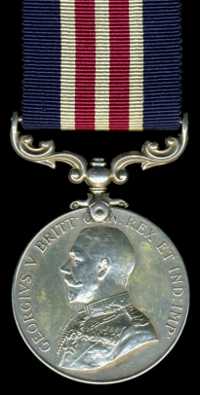
The Military Medal,
awarded to non-commissioned personnel
for acts of bravery in battle.
Harry Illingworth Bradshaw was born in Saddleworth on 22nd May 1895. His father Herbert Bradshaw, a clerk from Uppermill, died in 1901 and his mother remarried in 1907. Harry attended Saddleworth Parochial School before coming to Oldham Hulme Grammar School for three years from September 1907. After leaving school he started as an 'office boy' and, in 1914 was a cotton salesman for S F Fitzroy and Company, Manchester.
He enlisted on 21st March 1915 as a corporal with the Royal Engineers and embarked to France as a despatch rider with the 30th Signal Company on 7th November 1915. He received two periods of leave, the first in December 1916 and the second in February 1918, during which he was allowed to return to the UK. According to notes held in our archive, he was awarded the Military Medal for bravery.
On 12th August 1918 he was wounded in a motor cycle accident. He was initially treated at a field hospital before being sent to the 13th American Base General Hospital in Boulogne, and then on to the Canadian General Hospital in Orpington, Kent. He was suffering from cellulitis of his injured leg and underwent surgery. After discharge from hospital on 4th October 1918 he is believed to have served at a depot in Bedford. When examined prior to discharge from the army on 7th February 1919, he complained of pain on walking and of pain preventing sleep. His injuries were assessed as being in a final stationary condition and it was declared that he had suffered a 20% disability due to war service.
In 1939 he was the manager of a furniture shop in Derbyshire. He died in 1989 at the age of 93.
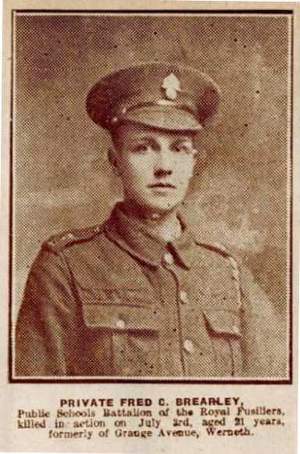
Photograph from the "Oldham Chronicle,
4th War Supplement", 28th October 1916.
Fred Crossland Brearley was born in Oldham on 14th October 1894, the son of Joseph Edward Brearley, a skip manufacturer. He was educated privately before coming to Oldham Hulme Grammar School in January 1906. He remained at school until Easter 1911 after which he became a clerk in a mill office.
He enlisted as a private with the 20th Battalion of the Royal Fusiliers and was deployed to France on 14th November 1915.
He was wounded in action in the Pas de Calais area of France and died on 3rd July 1916 at the age of 21. He is commemorated at Bethune Town Cemetery.
Eric Brierley was born in Oldham on 24th July 1892, the son of John Brierley, a chartered accountant. He attended Waterloo Council School before coming to Oldham Hulme Grammar School in 1906 for three years. From 1910 he studied for a bachelor of commerce degree at Manchester University.
He attested to the Royal Garrison Artillery on 10th December 1915 and was placed on reserve. His civilian occupation appeared to be acting paymaster for the Army Pay Corps. He was mobilised as a gunner on 30th July 1917 but then transferred on 14th December 1917, possibly due to his health, to the Labour Corps where he joined an agricultural company. At some point after this he was transferred to the Army Pay Corps at Nottingham and demobilised on 4th February 1919. He served in the UK.
In 1939 he was working as a chartered accountant in Oldham. He retired to Conwy and died there in 1976 at the age of 84.
Herbert Brierley was born in Oldham on 10th April 1882, the son of Benjamin Brierley, a grocer who died two years later. After attending Waterloo Board School he came to Oldham Hulme Grammar School in September 1897 for two years. At the age of 17 he joined the Civil Service as a postal clerk at the Oldham Office, later transferring to the Manchester Office.
He married Bessie Dora Warwick in 1909 and had a son the following year.
At the outbreak of war he joined the Royal Engineers Postal Section and took up his duties at the Base Postal Section in Salonika on 29th October 1914.
He died there of typhoid fever on 1st October 1916 at the age of 34.
John Isaac Brierley was born in Saddleworth on 26th July 1894, the son of George Isaac Brierley, a gentleman of Delph. After attending St Thomas' School, Friarmere, he came to Oldham Hulme Grammar School in January 1907. He became a draper's assistant after he left school in summer 1909.
From his medal card it appears that he originally attested as a private with the 16th Battalion of the London Regiment and served in France from 27th June 1915. He was granted a commission with the 2/7th Battalion of the West Riding Regiment in March 1917 and continued to serve in France as 2nd lieutenant. After being wounded in May 1917 (no details) he was treated at Dawpool Hospital, Wirral. It is not known if he returned overseas after this date.
In 1939 he was a radio and cycle dealer in Urmston. He died in the Barton area in 1955 aged 61.
Frank Broadbent was born in Ashton-under-Lyne on 8th March 1888, the son of Newton Broadbent, a mill manager. After attending St John's School, Hey, he came to Oldham Hulme Grammar School in January 1899. In 1911 he was a law student.
When he attested with the Army Pay Corps at Shrewsbury on 7th June 1915, a few weeks before his marriage, he gave his occupation as clerk although the attestation form makes mention of him being a law student. It also mentions that he had previously served with the 22nd Battalion of the Manchester Regiment, for which no records have been found.
He was posted as a private with the Army Pay Corps, promoted to temporary lance corporal on 20th October 1915, to temporary corporal on 21st February 1916 and to acting unpaid lance sergeant on 19th October 1918. He was discharged on 26th January 1919 to take up an appointment as acting civilian paymaster. He served in Shrewsbury as his deficient eyesight precluded him from overseas service.
In 1939 he was an assistant schoolmaster in Surrey. He died in Croydon in 1961 aged 73.
John Newton Broadbent was born in Oldham on 4th November 1898, the son of Fred Broadbent, a superintendent registrar. After attending Werneth Council School he came to Oldham Hulme Grammar School in 1910 for three years.
We do not have a record of his occupation after leaving school or of his military service. He is listed as a private with the 9th Battalion of the South Lancashire Regiment and his medal card shows that he served overseas.
In 1939 he was a secretary of a spinning mill in Oldham. He died at St Annes on Sea in 1973 aged 74.
George Frederick Brook was born in Holmfirth on 13th June 1898, the son of Herbert Henry Brook, a master tailor. After attending Waterloo Senior School he came to Oldham Hulme Grammar School in 1910 for three years. He worked as a clerk when he left school.
On 24th June 1916 he enlisted as a private with the Royal Marine Light Infantry, Plymouth Division. He served at the Recruit Depot at Deal until he moved to the Plymouth Division on 4th January 1917. At Plymouth he passed a number of courses: Infantry, Gunnery (Sea Service), Musketry, Field Training and Bombing. Both his general character and qualification results were considered very good.
He embarked on 11th June 1917 on the Cumberland, a Kent Class Heavy Cruiser, to sail in convoy with the 6th CS Grand Fleet between Britain and North America. During the next six months the ship made four return trips to Halifax, Nova Scotia, Canada.
After 26 days at Plymouth he was then assigned to the Victory V (which was a shore establishment) from 27th January 1918 until 23rd March 1918 when he returned to the Plymouth Division. On 12th June 1919 he embarked on the Caesar which, at this time, was a depot ship in the Mediterranean. From 12th October 1919 to 8th January 1920 he was back at Plymouth.
In 1939 he worked as an insurance broker in Preston. He died in the Garstang area in 1971 at the age of 72.
Oswald Broome was born in Oldham on 2nd June 1882, the son of James Cheetham Broome, a company secretary. After attending Waterloo Board School he came to Oldham Hulme Grammar School in September 1896 for a year.
By 1911 he was a professor of music.
During WW1 he served overseas as a lance corporal with the Duke of Cornwall's Light Infantry. No further records are available.
In 1939 he was working as a musician in Blackpool where he died in 1964 aged 82.
Charles Herbert Broomhead was born in Oldham on 12th May 1884, the son of Charles Broomhead, a medical practitioner. After attending Waterloo Board School he came to Oldham Hulme Grammar School for five years from 1897. He qualified MBBS (London) and, in 1908, MB ChB in Manchester. By 1911 he was working as a doctor, married and living in Salford.
During WW1 he served overseas as a captain with the Royal Army Medical Corps. No further records are available.
In 1939 he was working for the Ministry of Health in Crosby. He died there in 1942 at the age of 58.
Edwin Broughton was born in Oldham on 29th December 1896, the son of Edwin Broughton, a cast sheet manufacturer. He attended Werneth Council School before coming to Oldham Hulme Grammar School for two years from September 1909. His occupation after leaving school is not known.
He served overseas during the war from sometime after January 1916 as a private with the Army Service Corps. There is no further information.
He died in 1974 at the age of 78.
William Broughton was born in Oldham on 19th June 1891, the son of Edwin Broughton, a cast sheet manufacturer. He attended Werneth Council School before coming to Oldham Hulme Grammar School for two years from January 1905. After leaving school he joined his father's company.
He enlisted as a private with the Army Service Corps on 23rd October 1915 and was assigned to the motor transport division. He was deployed to France on 30th October 1915 and remained there for almost three years before receiving leave at the end of August 1918. He then returned to France until 3rd July 1919.
In 1939 he was a company manager living in Oldham.
Arthur Buckley was born in Ashton-under-Lyne on 14th November 1893, the son of Joseph William Buckley, a commercial traveller. He attended Albion School in Ashton before coming to Oldham Hulme Grammar School in September 1905. He remained at school for six years before studying at Manchester University for a Bachelor of Commerce degree.
Whilst at university he joined the Officer Training Corps and was granted a commission with the 14th Battalion of the Manchester Regiment. He served as 2nd lieutenant in Salonika from 22nd November 1915. In July 1918 he transferred to the Royal Air Force to train as an observer. He was deployed to France a day before the war ended.
He died in 1981 aged 87.
Cyril Buckley was born in Oldham on 17th January 1883, the son of George Buckley, a cotton spinner. After attending Coldhurst National School he came to Oldham Hulme Grammar School when it first opened in May 1895. He left after three and a half years to become a cotton spinner. By 1911 he was living with his parents in Blackpool (at the time the census was taken).
He enlisted as a class 2 air mechanic with the Royal Flying Corps on 20th September 1916. He was promoted to class 1 air mechanic on 1st March 1918.
He died in 1939 in Middleton at the age of 56.
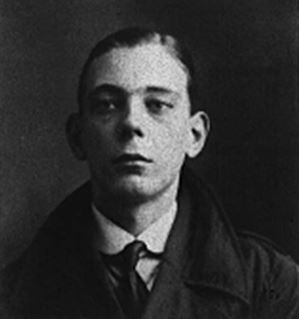
Photograph from Merchant Navy records.
Douglas Hermann Buckley was born in Oldham on 11th August 1897, the son of Dr C H Buckley, a surgeon. He was educated privately before coming to Oldham Hulme Grammar School in January 1907 for a little over a year. He later attended Brighton House School, a private school in Oldham.
In September 1911 he joined the Merchant Navy as a cadet on HMS Conway, a training ship berthed at Liverpool, remaining until August 1913. A note on his file mentions that he was going to take up engineering.
He served overseas with the Merchant Marine during WW1.
In 1939 he was a marine engineer living in Torquay. He died at sea on 15th May 1956 at the age of 58.

The Military Cross,
awarded to officers for gallantry during
active operations against the enemy.
Henry Buckley, known as Harry, was born in Ashton-under-Lyne on 7th February 1891, the son of Joseph William Buckley, a commercial traveller. After attending Albion School in Ashton he came to Oldham Hulme Grammar School in September 1903. He left in 1907 to study history at Manchester University, graduating MA with first class honours. He then attended a teacher training course at Bangor Normal College in North Wales.
He became an assistant master at Hollinwood Council School in 1911 and at Watersheddings Council School in 1912.
While at Manchester University he attended the Cadet Training Corps and, at the start of the war, was granted a commission with the 12th Battalion of the Manchester Regiment. He was deployed to France as 2nd lieutenant on 15th July 1915.
He was awarded the Military Cross, gazetted 7th March 1918.
Citation: "For conspicuous gallantry and devotion to duty in marking out the forming-up ground in No Man's Land for an extensive raid. This was well done, and demanded several hours' exposure in front of our wire on several nights under enemy machine-gun activity."
He was promoted to captain before the end of the war.
He returned to civilian life, becoming an assistant master at Leyton County High School for Boys in London in 1921.
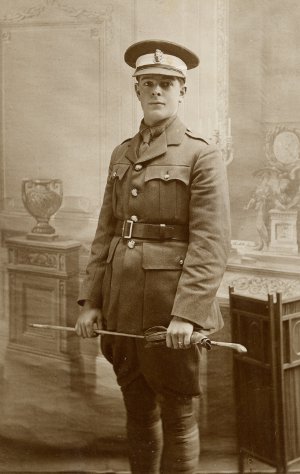
Joel Buckley. Photograph from the collection of P M Buckley.
Joel Buckley was born in Denshaw on 23rd October 1889, the second son of Bennet Buckley, a calico cloth printer. He attended Waterloo School before coming to Oldham Hulme Grammar School for four years from September 1904. While a pupil in form IV he won 1st prize in the end-of-year examinations and, as a keen sportsman, won a silver cup for his achievements on the athletics field in 1908. After leaving school he worked as a supply teacher for West Riding County Council before taking the teacher training course at Carmarthen in 1910 - 1911. From 1913 he was assistant master at St Luke's School, Chadderton. He married in 1915.
He joined the Army Officer Cadet Unit and was granted a commission as 2nd lieutenant with the Duke of Wellington's West Riding Regiment on 30th May 1917. Shortly thereafter he was posted to the Somme area of France, and was later promoted to the rank of captain.
He was awarded the Military Cross for his actions during a raid on an enemy trench: "When in charge of a party taking part in a raid on the enemy trenches he skilfully led his men to the second objective, bombed a dugout, captured a prisoner and held up a strong counter attack which the enemy were attempting down a communication trench. He afforded his men a fine example of resource and initiative."

The Military Cross,
awarded to officers for gallantry during
active operations against the enemy.
In 1920 he was invited to officiate at the unveiling of the War Memorial in Denshaw Churchyard, a monument that contained among the 23 names listed, that of his younger brother who had been killed in action in 1918.
He remained in the army for a short time after the war, transferring to the Army Educational Corps until 1922 when he returned to civilian life as a master at Boothstown Church School. In 1926 he became headmaster of Denshaw Village School where he remained until retirement in 1954.
Active in local affairs he was a churchwarden of Christ Church at Denshaw from 1941 to 1951, an independent Councillor for Saddleworth Urban District Council and a JP for the West Riding. During WW2 he was second in command of the Saddleworth Home Guard. He died on 12th March 1981 at the age of 91.
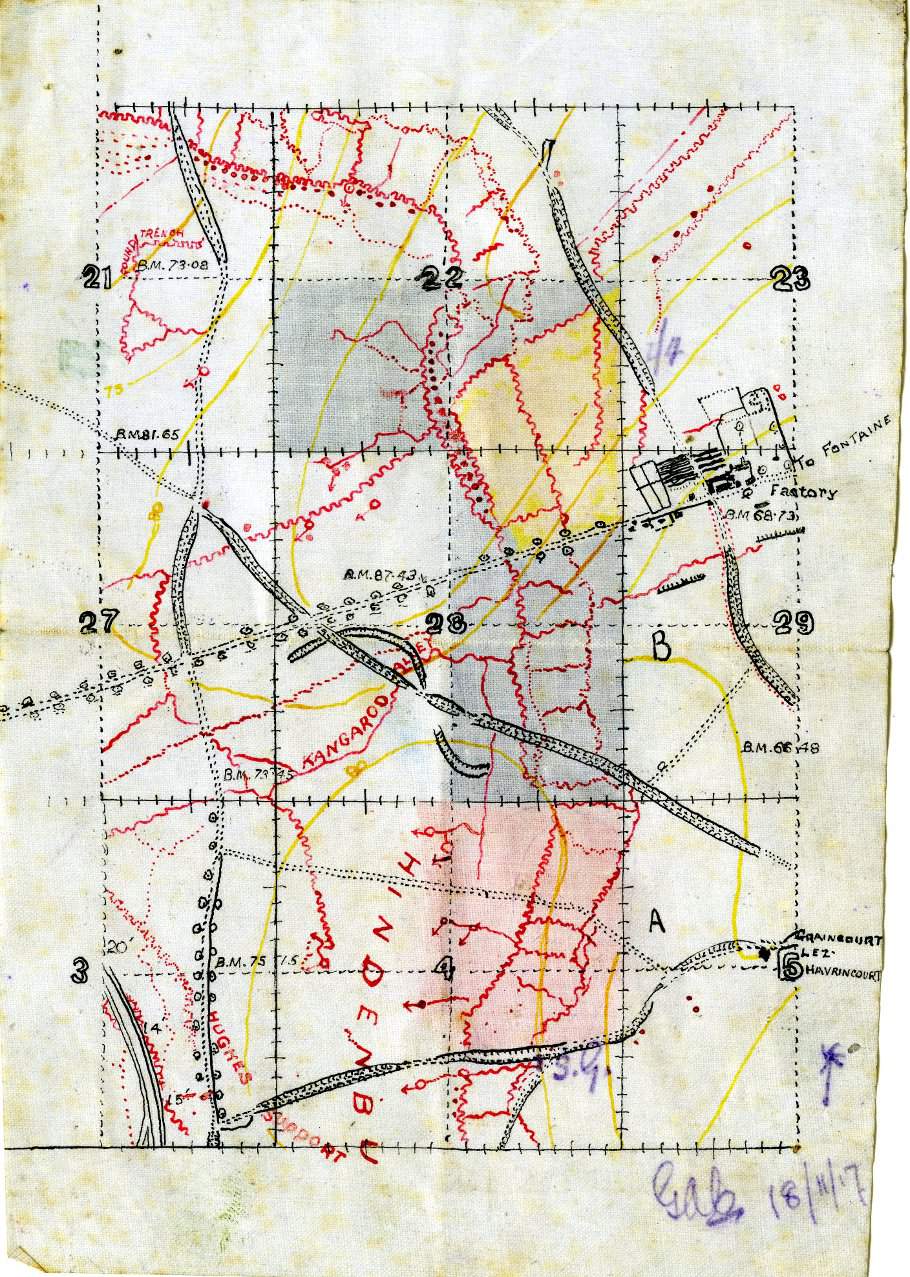
A Trench Map belonging to Joel Buckley from November 1917. From the collection of P M Buckley.
Wilfred Ward Buckley was born in Saddleworth on 22nd August 1892, the son of Thomas Wild Buckley, a cotton spinner of Diggle. He attended Kiln Green School, Diggle, before coming to Oldham Hulme Grammar School in September 1905. He left after six years to pursue a career in teaching.
Within days of the declaration of war he left his position as a teacher at St Mary's School, Greenfield, to enlist with the 7th Battalion of the Duke of Wellington's West Riding Regiment. He sailed from Southampton on 13th May 1915 as a private with his battalion.
On 18th September 1915 it was reported by the Oldham Chronicle that his parents had received a letter from him at the base hospital; he had been wounded when his battalion, which had been resting away from the front line for a few days, were on their way back and had come under fire. He had suffered shrapnel wounds to the head and thigh after a shell exploded near him. His wounds were not severe but would keep him out of action for some weeks.
Once he had recovered he re-joined his battalion on the front line. He was promoted to the rank of sergeant on 10th August and, a few weeks later on 3rd September 1916, he was killed in action at the Somme at the age of 24.
He is commemorated at Thiepval, the memorial to the missing of the Somme. He is also commemorated on memorials at Wrigley Mill Methodist Church in Diggle, St Chad's Church in Uppermill and at Pots and Pans Memorial.
Charles Geoffrey Bullough was born in Oldham on 4th June 1896, the son of C G Bullough, a confectioner. After attending Waterloo Secondary School he came to Oldham Hulme Grammar School for two years from January 1911. On leaving school he took an apprenticeship as a motor mechanic.
He enlisted with the Royal Flying Corps on 14th June 1916 as an air mechanic 2nd class and was sent to France on 18th September 1916 with the 19th kite balloon section where he is listed as a 'winch D F'. He was promoted to air mechanic 1st class on 1st March 1917 and to acting corporal on 20th August 1917. He served in France until 5th February 1919.
In 1939 he was an engineer's fitter living in Oldham. He died in Blackpool in 1980 aged 84.
James Arnold Bunting was born in Oldham on 5th September 1895, the son of James Henry Bunting, an accountant. After attending Werneth Council School he came to Oldham Hulme Grammar School in 1906 remaining until the summer of 1913. By 1915 he was working as a cotton broker.
He attested on 30th October 1915 as a private with the Royal Army Service Corps, Motor Transport Division. He was called for service on 16th February 1916 when he was posted with the 495 Company in France. He embarked on the SS Lydia from Southampton to Rouen on 19th February 1916.
He served in France until 9th January 1919 with leave in the UK from 14th to 24th January 1917 and 9th January 1918 to 2nd March 1918. He also spent 23 days at the 2nd Western General Hospital in Manchester suffering from influenza in February 1917. He was awarded a good conduct badge on 30th October 1917, and demobilised on 9th January 1919.
In 1939 he was a cotton salesman. He died in Ulverston in 1972 at the age of 76.
Harry Burton was born in Oldham on 11th November 1889, the son of John Burton, a frame fitter. After attending Westwood Board School he came to Oldham Hulme Grammar School in September 1902 for five years. He became a technical clerk with Messrs Platt Brothers and Co.
Probably shortly after his marriage in 1916 he enlisted as a corporal with the 11th Battalion of the Manchester Regiment.
He was killed in action in Belgium on 16th August 1917 at the age of 27. He is commemorated at Poelcapelle British Cemetery.
Edmund Butterworth was born in Saddleworth on 15th May 1887, the son of William Henry Butterworth, an under-manager. After attending Denshaw National School he came to Oldham Hulme Grammar School in April 1901 for two years. In 1911 he was working as a calico printer's clerk.
Although no service records exist his medal card shows that he initially served as a private with the 18th Royal Fusiliers in France. He was granted a commission with them on 27th November 1917 and later transferred to the Loyal North Lancashire Regiment.
In 1939 he was a textile printing manager in Saddleworth. He retired to the south coast and died at Christchurch, Hampshire, in 1967 at the age of 80.
Percy Butterworth was born in Shaw on 27th October 1898, the son of John Butterworth, an auctioneer. After attending Shaw British School he came to Oldham Hulme Grammar School in 1911 for three years. On leaving school he probably took an apprenticeship as a fitter.
He joined the Royal Flying Corps as an air mechanic class 2 on 12th February 1917 and was promoted to 1st class on 13th May 1918, reclassified as aircraft engine fitter on 1st January 1919. He served with the 74 Squadron which proceeded to France in April 1918 but he was invalided to England (possibly suffering from influenza) on 23rd January 1919.
He was placed on reserve on 9th March 1919 but recalled on 11th April 1921. In 1923 his request for permission to reside in America was granted and he travelled from Liverpool to Boston on 10th February 1923. His occupation was listed as a machine tool fitter.
He made another trip to Boston on 1st May 1926 and is listed as intending to become a permanent resident of the USA. Although he returned to the UK briefly in 1928 and 1929 he is listed on the US Census for 1930 living in Worcester, Massachusetts, with his wife (who was born locally). This document shows that he worked as a mechanic in a machine shop.
He returned to work in England sometime before 1939. The 1939 register shows him as an engineer living in Crompton. He died in Oldham in 1982 at the age of 83.
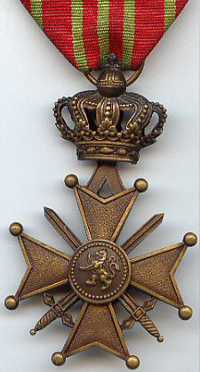
The Belgian Croix de Guerre,
awarded to Belgian and allied soldiers who
distinguished themselves by acts of heroism.
William Leonard Caldwell was born in Clayton-le-Moors on 26th July 1895, the son of the Reverend Stuart Caldwell. After moving to Windsor Road, Oldham, he attended Werneth Council School. He came to Oldham Hulme Grammar School for three years from September 1907. On leaving school he became a junior clerk for a textile company.
Although it is not known when he enlisted with the Lancashire Fusiliers, he was granted a temporary commission with them in 1916. He served in France from 28th January 1916. During his time overseas he was promoted temporarily at various times to acting lieutenant or acting captain when he took command of a trench mortar battery.
He was awarded the Military Cross at the end of the war (the citation for which cannot be found) and also the Croix de Guerre presented by the King of Belgium. Records in our archives mention that he was a prisoner of war, but no evidence has yet been found. When he completed his service on 9th February 1920 he was granted the rank of captain.
In 1939 he worked for the Ministry of Transport. He died in 1982 at the age of 86.
Noel Carrington was born in Ashton-under-Lyne on 10th December 1898, the son of Thomas Carrington, a commercial clerk. He attended Werneth Council School before coming to Oldham Hulme Grammar School in September 1911. He was still at school when the war started.
He left school in the summer of 1916 and enlisted as a private with the 12th Battalion of the King's Liverpool Regiment, probably after his 18th birthday in December of that year.
He died from wounds received at the Somme on 15th May 1918 aged 19. He is commemorated at Aubigny Communal Cemetery, France.
Fred Carter was born in Chadderton on 7th March 1896, the son of James Edwin Carter, a registrar of births and deaths. He attended Eustace Street Council School before coming to Oldham Hulme Grammar School for two years from September 1908. After leaving school he worked as a junior clerk at a cotton mill and by 1915 was an assistant secretary at the mill.
He enlisted as a private with the 24th Battalion of the Manchester Regiment on 3rd June 1915 and was deployed in the Etaples area of France from 8th November 1915. In September 1916 his unit moved to the Abbeville area. He suffered a dental abscess on 30th April 1917 but after treatment was able to re-join the field four days later. He was wounded in action on 13th July 1917, treated locally for two weeks and then given ten days' leave after which he returned to his battalion for the remainder of the war, finally arriving back in England in January 1919 after more than three years in France.
He died in 1972.
Isaiah Harold Cartwright was born in Armley, Leeds, on 2nd January 1884, the son of J Cartwright, a painter and colour manufacturer. After attending Waterloo Board School he came to Oldham Hulme Grammar School in 1895. He left school in 1900 to work initially as a pupil teacher and, from 1905 to 1907 as assistant master at Moston Lane Council School in Manchester. He moved to London in 1907, working at St Paul's Road School in Bow until 1911, then at Duncombe Road London County Council School in North Islington until 1929 when he became headmaster of Monteith Road London County Council Senior Boys' School at Bow.
However, when he enlisted with the Royal Naval Air Service on 23rd November 1915 he gave his occupation as motor engineer. He was assigned on 1st August 1916 as an air mechanic to RNAS Mullion in Cornwall, a frontline airship station. From 12th October 1917 he was assigned to RNAS Pulham, another airship station in Norfolk. From 1st April 1918 this became an RAF station. At some point he also served in France.
He was promoted to a leading mechanic on 1st August 1916, to leading mechanic hydraulic winchman on 21st January 1918 and to RAF sergeant mechanic on 1st April 1918.
He returned to teaching sometime after the war and in 1939 was an elementary schoolmaster at Banstead in Surrey. He died there in 1944 at the age of 60.
Arthur Roland Cave was born in Saddleworth on 7th November 1894, the son of E Cave, a book-keeper. He attended Delph Council School before coming to Oldham Hulme Grammar School in 1908. After leaving school in 1910 he became a railway clerk.
During WW1 he served from 2nd December 1915 in France as a sergeant with the Royal Army Service Corps. He was placed on reserve on 19th March 1919.
In 1939 he worked for the Ministry of Labour in Sale, Cheshire. He died there in 1979 at the age of 84.
Ellis Chadwick was born in Hyde on 31st January 1900, the son of W Chadwick, a salesman. After a private education he came to Oldham Hulme Grammar School in 1912 for three years. He worked as a clerk after leaving school.
He enlisted as a private with the Royal Air Force on 11th June 1918 and was appointed acting sergeant on 20th November 1918. He was given the highest medical rating and trained at a School of Aeronautics. However, the war was over by the time he had finished training and he was transferred to the reserve on 28th January 1919.
He died in 1930 in the Fylde area, aged 30.
Francis William Chadwick was born in Oldham on 30th September 1891, the son of Frank Chadwick, a cotton yarn salesman. After a private education he came to Oldham Hulme Grammar School in April 1902 for two years. In 1911 he was working as an assistant cotton yarn salesman.
According to his attestation papers he had served prior to the war as a territorial with the Officer Training Corps of the Loyal North Lancashire Regiment at Rochdale.
He attested on 7th February 1916 as a private with the Lancashire Fusiliers. On 31st March 1916 he was posted with the 22nd Reserve Battalion and promoted to lance corporal on 17th April 1916. He was transferred to the 2/1st Battalion of the Herefordshire Regiment on 27th May 1916 and, as a medal card exists, appears to have served overseas with them. However, in August of that year he was found to be suffering from valvular heart disease (often caused by childhood rheumatic fever). He was discharged as unfit and "not likely to become an efficient soldier" on 9th August 1916. His commanding officer reported that he was "honest, sober and trustworthy".
He then joined the 2/28th Battalion of the London Regiment; known as the Artist's Rifles, this battalion was an Officer Training Corps stationed at Bailleul in France. When he was posted as a private with this regiment on 10th August 1917 he was deemed to have been enlisted for general service on 11th August 1916. He served at home until he was posted to the 1/17th Battalion of the London Regiment and joined them in the field on 3rd April 1918.
In 1939 he was working as a yarn salesman in Fulwood, Lancashire.
Sam Richard Chaloner was born in Germany on 28th July 1898, the son of John Richard Chaloner, a carpet loom erector, and his German wife. He attended Dobcross National School before receiving a Hawkyard & Whitehead Scholarship to Oldham Hulme Grammar School for four years from September 1911. In 1915 he continued his education at Manchester University where he studied for a Bachelor of Commerce degree.
Whilst at university he joined the Officer Training Corps and was granted a commission with the 5th Battalion of the Yorkshire Regiment on 31st May 1917. He does not appear to have served overseas.
In 1939 he was Publicity Officer for the Ministry of Labour in Richmond, Surrey. He died in Canterbury, Kent, in 1980 at the age of 82.
Willie Cheetham was born in Marsden, Yorkshire, on 5th May 1894, the son of Tom Bates Cheetham, an iron moulder. After attending Derker Council School he came to Oldham Hulme Grammar School for two years from September 1906. He later took an apprenticeship as a tool fitter.
He attested as a private with the Army Ordnance Corps on 25th January 1915 and was promoted to staff sergeant at that time. He embarked for France on 15th May 1915 and was posted to the 41st Brigade of the Royal Field Artillery on 31st May 1915. He was mentioned in despatches on 29th May 1917 and served in France until 9th May 1919 when he was posted to the Rhine Army in Cologne. After 17 days leave in the UK in June 1919 he was stationed at number 1 Concentration Camp in Cologne on 22nd August 1919 and a month later placed on reserve.
In 1939 he was a foreman fitter working in Oldham. He died there at the age of 79 in 1973.
George Henry Chetwynd was born in Sheffield on 9th June 1888, the son of Thomas Chetwynd, a Civil Service Inland Revenue officer. After attending school in Much Wenlock, Shropshire, he came to Oldham Hulme Grammar School from September 1901 until Easter 1903. In 1911 he was working as a Post Office clerk in Bournemouth.
He attested at Stockport on 9th December 1915 as a sapper with the 68th Division Signal Company of the Royal Engineers.
When called up for service in October 1916 his employer, the Post Office, stated that he could not be released as he was employed as a wireless operator at Holyhead Wireless Station. Similarly, in July 1917, he was again exempted as he was working as a wireless operator at Caister Wireless Station. On 10th May 1918 he was transferred to the reserve and discharged on 14 December 1918.
In 1939 he was a Post Office sorting clerk in Margate. He died in Kent in 1969 at the age of 81.
Thomas Newton Church was born in Oldham on 13th February 1893, the son of Fielding Church, an engine fitter. His father died two years later and he was brought up by his mother Sarah and his older sisters. He attended Blue Coat School until September 1907 when he came to Oldham Hulme Grammar School for three years. He left in 1910 and began work as a printer's clerk.
During the war he served as a warrant officer class 2, quartermaster sergeant, firstly with the Manchester Regiment and later with the Labour Corps and the Worcestershire Regiment. There is no further information available.
In 1939 he was a cashier at a calico printer in Saddleworth. He died in 1975 at the age of 82.
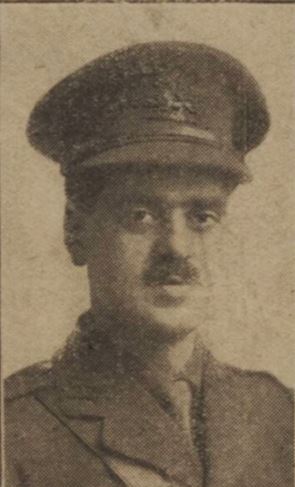
Photograph from the Rochdale Observer,
28th November 1917.
Alfred Matthew Clark was born in Oldham on 17th May 1892, the son of Francis Clark, an insurance superintendent of 324 Park Road, Oldham. After attending Waterloo Council School he came to Oldham Hulme Grammar School for two years from September 1904. Prior to the war he was working as a yarn agent for Messrs James Boyd and Sons of Manchester and was a member of the Manchester Exchange. He later moved to Castleton and was known for his fast bowling at the local cricket club.
He joined the Inns of Court Officers' Training Corps in July 1915 and was granted a commission in December of that year as a lieutenant with the King's Own Royal Lancaster Regiment. After serving six months overseas he was wounded in August 1916. He returned to the front in June 1917 and was later appointed commandant in a Prisoner of War Company before rejoining his regiment in action.
He was killed in action on 20th November 1917 at the age of 25 and is commemorated at Thiepval, the memorial to the missing of the Somme.
Walter Claughton was born in Oldham on 24th May 1892, the son of James Claughton, a mechanic. After attending Freehold Council School he came to Oldham Hulme Grammar School in September 1904 for four years. He later became an assistant school teacher for Oldham Council.
He attested at Ashton-under-Lyne on 27th November 1915 as a private with the 25th Reserve Battalion of the Manchester Regiment and was posted on 28th April 1916. He was transferred to the Number 7 Reserve Brigade of the Royal Field Artillery on 29th December 1916 and to their headquarters staff on 30th March 1917.
He joined the British Expeditionary Force in France as a gunner with the RFA on 17th May 1917 and was discharged to base on 31st August 1917.
In 1939 he was a head teacher at an Elementary School in Oldham. He died there in 1960 aged 67.
James Wallace Rennie Clegg was born in Oldham on 12th August 1894, the son of James Clegg, an engineer. He attended St Thomas' School before coming to Oldham Hulme Grammar School for two years from September 1906. His occupation was given as cotton dyer on the 1911 census but he was later a goods clerk at Shaw station.
He enlisted in Royton as a private with the Royal Army Service Corps and, sometime after January 1916, was sent to a base mechanical transport depot in Greece.
He died from pneumonia on 23rd October 1918 at the age of 24 and was buried at the Mikra British Cemetery in Kalamaria.
Albert Mountain Cleverley was born in Saddleworth on 5th August 1898, the son of John Cleverley, a stone mason from Greenfield. He attended St Mary's School in Greenfield before coming to Oldham Hulme Grammar School in September 1909. He spent seven years at Hulme, receiving a school leaving exhibition of £30 in 1916, to be taken when the end of the war permitted him to commence his university course.
The school magazine The Oldham Hulmeian of February 1917 reported that he had received an appointment at a government chemical laboratory.
He enlisted with the West Riding Regiment on 11th June 1917 but before he had finished training he was transferred to the Royal Engineers; he was given the rank of pioneer and attached to the Special Brigade - Gas, due to his experience in chemistry.
He joined his unit in France on 21st September 1917. A year later he was wounded on duty and received leave in the UK from 11th September until 26th October 1918, after which he re-joined his unit.
After the war he completed his degree at Manchester University, graduating with first class honours in Metallurgy in 1921. He became managing director of an enamelling company in Greenfield before 1939.
He died on 17th April 1962 at the age of 63.
Herbert Allan Clough was born in Oldham on 1st June 1887, the son of John Clough, a manufacturing chemist. After attending Waterloo Board School he came to Oldham Hulme Grammar School in 1899 for four years. In 1911 he was working as a clerk in the cotton spinning industry but prior to the war had become a designer.
He enrolled with the Royal Field Artillery Reserve and was called up for service as a gunner on 10th November 1916. On 22nd November 1917 he was posted to France until 28th December 1917. No further records are available.
In 1939 he was a master sign writer living in Colwyn Bay. He died there in 1962 at the age of 74.
John Harper Clynes was born in Oldham on 4th June 1894, the son of John Robert Clynes, Member of Parliament and Trade Union Secretary. After attending Waterloo Council School he came to Oldham Hulme Grammar School from September 1907 until 1912 when, it is believed, he proceeded to university.
He is listed in the discharge book of the Oxford University Number 6 Officer Cadet Battalion as a private with the 10th Manchester Regiment being discharged to take up a commission with the 5th Battalion of the Middlesex Regiment on 21st November 1916. He served as 2nd lieutenant with this regiment in France. On 8th March 1917, while serving in France with the 1st Middlesex Battalion he suffered from pyrexia of unknown origin (fever) and was admitted to 31 Ambulance Train to Rouen. No further information is available.
Clynes had been an active member of the school debating society and in 1922 he stood as the Labour Party Candidate for the Constituency of Hemel Hempstead in the general election. He lost to the Unionist Party Candidate. His father John Robert Clynes was the Member of Parliament for Manchester Platting from 1906 to 1931 and 1935 to 1945, and had been Leader of the Labour Party immediately before this election.
He decided to settle in South Africa and left the UK in 1927 to become a tobacco farmer in Southern Rhodesia. He was still there in 1939 although he appears to have maintained a base in London.
He died in London in 1953 at the age of 58.
Frederick Harold Cockell was Classics Master at Oldham Hulme Grammar School from 1908 until his retirement in 1939.
He was born in London on 26th August 1883 and educated at the Merchant Taylor's School. In 1902 he went to Queen's College, Cambridge, passing the Classical Tripos and graduating BA in 1905. He taught at Forest School, Walthamstow, for three years before coming to Hulme and, during his time there, was a member of the 1st Volunteer Battalion of the Essex Regiment. He was commissioned to the rank of 2nd lieutenant in 1907.
When the war started he was married with two children. He enlisted at the end of 1915 with the Royal Garrison Artillery and was trained with the Officer Cadet Unit. He was commissioned with the Royal Garrison Artillery on 10th December 1916 and deployed to France on 12th February the following year.
He was promoted to lieutenant and acting captain on 10th June 1918 and, when he relinquished his commission on 1st April 1920, he retained the rank of lieutenant. He then returned to his duties at school.
He died on 24th October 1966 aged 83.
Thomas Bernard Cocker was born in Royton on 12th May 1898, the son of Alphonso Cocker, a grocer. After attending Byron Street Council School he received a Hulme Scholarship to attend Oldham Hulme Grammar School in September 1910. He left school in the summer of 1916.
He joined the Royal Navy before July 1918 and is listed as a Cambridge undergraduate. He appears to have served from 17th July 1918 to 13th January 1919 at 'Pembroke', the Chatham Shore Base, and then at 'Pekin', the Grimsby Shore Base until March 1919.
On 2nd July 1921 he left the UK to take up a post as a Civil Service Cadet in Singapore. He died in London in 1931 aged 33.
George Frank Colley was born in Chadderton on 19th November 1881, the son of James Colley, a farmer. After attending St Mary's School, Moston, he came to Oldham Hulme Grammar School in September 1897 for two terms. After leaving school he worked on the family farm.
In 1902 he served in South Africa with the 3rd Volunteer Service Company of the Lancashire Fusiliers.
He emigrated to New Zealand before 1911; in that year he was listed as a sheep farmer at Foxton in the Wellington West Coast area with 1324 sheep.
It is thought that he may have served with the 7th Reinforcement Section of the Canterbury Infantry Battalion during WW1 and was wounded in October 1916; there is insufficient information to definitely confirm these details.
In 1927 he wrote an article for The Oldham Hulmeian (the School's magazine) on Sheep Farming in New Zealand. In 1938 he wrote from a PO Box address in Palmerston North, a letter to the Lancashire Fusiliers requesting a copy of his discharge papers because the original had been lost in the post between Lyttelton and Wellington, New Zealand.
He died at Hawke's Bay, New Zealand, in September 1978 at the age of 96.
Cecil Aubrey Cooling was born in Shaw on 3rd January 1897, the son of James Edward Cooling, a loom overlooker. After attending Shaw Wesleyan School he came to Oldham Hulme Grammar School for two years from September 1908.
He worked as a grocer's assistant for a while before becoming an officer with the Labour Exchanges and Unemployment Insurance in Warrington. When he enlisted, his employer wrote to the recruiting officer advising that, should he be accepted for military service, he could not be released from civil duty until 3rd January 1916.
He enlisted at the age of 18 with the 4th Battalion of the Manchester Regiment on 9th December 1915 and was posted to the battalion on 31st March 1916. He was promoted to acting corporal on 1st May 1916, and to corporal and acting sergeant on 30th December 1916. He qualified on the 7th Musketing Course and gained a distinction on the 35th Rifle and Lewis Gun Course in early 1917.
On 12th November 1917 he was promoted to sergeant and embarked from Folkestone to join the 21st Battalion of the Manchester Regiment. He served with them in France and later in Italy before returning to France.
He was listed as missing in action between the 4th and 11th October 1918 and was later listed as killed in action on 8th October 1918 in the Aisne area of France. He was 21 years of age. He is commemorated at Beaurevoir Communal Cemetery, France. He is also commemorated on the memorial to staff of the Ministry of Labour at Caxton House, London.
George Robert Cooper was born in Royton on 5th October 1897, the son of James William Cooper, a spinner in a cotton mill. After attending Royton Council School he came to Oldham Hulme Grammar School in January 1910 for three years. He later became a clerk in a cotton mill.
He enlisted with the Royal Regiment of Artillery shortly after his 18th birthday and was placed on reserve until 2nd April 1917 when he was sent to France as a lance bombardier with the 301 Siege Battalion of the Royal Garrison Artillery.
He was wounded on 25th March 1918 by gunshot to the right shoulder and right eye. After initial treatment at Etaples he was transferred to the temporary military hospital at Sheffield where, four months later, a glass eye was fitted. However, shortly after this he complained of severe headache and was found to have some intercranial pressure. He underwent surgery on 30th August 1918 when it was found that the dura had adhered to scar tissue in the eye socket and had caused a large abscess.
After surgery he was progressing favourably until November 1918 when he started having convulsions. These continued for some months until 12th March 1919 when, due to continuous convulsions, further surgery was undertaken during which a large amount of cerebrospinal fluid escaped. Over the next few days he became weaker, was semi-conscious but unresponsive. He died on 16th March 1919 at the age of 21 almost a year after being wounded. He was buried at Royton Cemetery and is commemorated on Royton Memorial.
William Randolph Cooper was born in Bolton-le-Moors on 21st April 1897, the son of Ernest Cooper, an engineer. He attended Friern Barnet Grammar School in London before coming to Oldham Hulme Grammar School in January 1910.
In 1915 he became a student of textile industries at Manchester University and the following year joined the university Officer Training Corps. He was granted a commission as 2nd lieutenant with the 4th Battalion of the Loyal North Lancashire Regiment on 25th October 1916 and was deployed to France at the end of the year.
He was killed in action in the Pas de Calais area of France on 13th May 1918 at the age of 21. He is commemorated at the Post Office Rifles Cemetery at Festubert, France.
James Crowther was born in Bury on 26th August 1897, the son of Edward Crowther, a publican of the Star Hotel, Rochdale Road, Shaw. After attending Shaw British School he came to Oldham Hulme Grammar School in January 1909, leaving in July 1911. By 1915 the family had moved to Blackpool where he worked as a grocer.
He attested in December 1915, a few months after his 18th birthday, and was placed on reserve. From 22nd December 1916 he served as a private with the King's Own Royal Lancaster Regiment in France.
He died of wounds received in action on 29th June 1917, aged 19, and was buried at Etaples Military Cemetery in France.
James Davenport was born in Oldham on 14th January 1892, the son of James Henry Davenport, a pawnbroker. After attending Eustace Street School in Chadderton he came to Oldham Hulme Grammar School in 1903. He joined his father's business when he left school in 1908.
He attested on 18th January 1916 for work at the Manchester Regiment's depot and was placed on reserve until 31st January 1917 when he was transferred to the Royal Flying Corp's Cadet Wing. He was granted a commission as 2nd lieutenant with the RFC on 26th September 1917. He qualified as a pilot of the Caudron Biplane on 26th February 1918 and in November 1918 was listed as a pilot / observer for the RAF. It is not known if he served overseas.
In 1939 he was a pawnbroker in Oldham.
Albert Whittaker Davoll was born in Oldham on 10th May 1895, the son of John William Davoll, a foreman pattern maker. He attended Stanley Road School before coming to Oldham Hulme Grammar School in 1907 for four years.
In 1916 he was head of the insurance and calculating department of Messrs James Stott Ltd of Werneth Mills. Davoll claimed exemption from military service because he had a conscientious objection to undertaking combatant service. He was an office-bearer at Cowhill Wesleyan Church and his religious and moral convictions pointed out to him the sanctity of human life. He did not wish to undertake any service which might be contributory to the war.
When he was brought up before the tribunal in Chadderton on 13th March 1916 as a conscientious objector he lost because he was working for an employer who was involved in doing government work in connection with the war. The verdict was that he should be sent to a non-combatant corps.
He was instructed to report for duty on 17th April. Instead he surrendered at Chadderton Police Station as being an absentee under the Military Service Act. At Chadderton Police Court on 29th April he was fined 40 shillings and detained in custody to await an escort. He was posted to Kinmel Park on 3rd May but, after disobeying an order was court martialled resulting in him being sentenced to 2 years with hard labour. On 16th May he was sent to Wormwood Scrubs Prison. After an appeal his sentence was mitigated to 112 days with hard labour and he was released on 15th August. On 22nd September 1916 he was discharged from the army 'having been irregularly enlisted'.
He died in 1934 in Middleton at the age of 39.
Harold Ambler Dearnaley was born in Glossop on 7th October 1892, the son of Abel Dearnaley, a cotton mill manager and salesman. After attending Howardtown Wesleyan School in Glossop he came to Oldham Hulme Grammar School in January 1904 for five years. He then became an apprentice to a motor car builder.
He enlisted at the start of the war as a private with the Army Service Corps and served in the motor transport service at the 8th division ammunition park in France.
He married in 1920 after returning from France. In 1939 he was a commercial traveller for steel shelving, living in Buxton.

The Military Cross,
awarded to officers for gallantry during
active operations against the enemy.
George Barlow Dempsey was born in Halifax on 15th January 1890, the son of Mrs Mary Ann Dempsey (father deceased). After attending Crossley School in Halifax he came to Oldham Hulme Grammar School in 1905 for one year. In 1911 he was working as an assistant teacher at an elementary school.
He was granted a commission with the 24th (Oldham Pals) Battalion of the Manchester Regiment on 8th January 1915 and served in France as 2nd lieutenant and later lieutenant and platoon commander of platoon XIV in D Company. While a temporary captain with the 20th Regiment he was awarded the Military Cross: The citation states "He carried out his duties as Adjutant during all the operations from 4th to 10th October 1918 in the most efficient manner at Beaure-voir-Ponchaux and Sonia Farm. He took charge of the battalion when the C.O. was wounded on the 4th, and handled a most difficult situation with great skill and coolness. He showed great gallantry and ability to command. His work was carried out under the most trying conditions and frequently under fire of all sorts."
In 1939 he was the Director of Education for Birkenhead. He died there on 8th May 1959 at the age of 69.
John Herbert Desden was born in Oldham on 27th August 1896, the son of J R Desden, an operative cotton spinner. After attending Clarksfield Council School he received a United Charities Scholarship to attend Oldham Hulme Grammar School in September 1909. He remained at school for three years.
He served overseas during the war as a gunner with the Royal Garrison Artillery. No further information is available.
In 1939 he was working as the Director of Education for Batley. He died in the Spen Valley area on 8th June 1948 at the age of 51.
Walter Lloyd Doyne was born in Oldham on 14th July 1891, the son of Walter Doyne, a caretaker. After attending Waterloo Board School he came to Oldham Hulme Grammar School for two years from September 1903. In 1911 he was an assistant teacher at an elementary school. He attended Goldsmith's College from 1912 to 1914.
He enlisted on 2nd November 1915 as a private with the 10th Reserve Battalion of the Manchester Regiment and joined his battalion in France on 16th August 1916. He was transferred to the 4th Battalion of the Loyal North Lancashire Regiment on 8th September 1916.
A day later, and less than a month after arriving on the front line, he was killed in action at the Somme on 9th September 1916 at the age of 25.
He is commemorated at Thiepval, the memorial to the missing of the Somme, and on the memorial at Goldsmith's College, New Cross, London.
Franklin Dyson was born in Oldham on 21st August 1888, the son of Benjamin Franklin Dyson, a cotton waste dealer. After attending Northmoor Wesleyan School he came to Oldham Hulme Grammar School in September 1900 for three years. In 1911 he was working as an accountant.
He attested on 9th December 1915 and was mobilised on 30th April 1917 as a private and gunner with the Royal Horse Artillery and Royal Field Artillery. He served in France and, at the end of the war, in Germany from 9th October 1918 until 1st September 1919. He was placed on reserve on 17th November 1919.
In 1939 he was working as an estate agent and accountant in Oldham. He died there in 1948 at the age of 59.
Fred Dyson was born in Springhead on 11th January 1898, the son of James Dyson, a minder. After attending St John's School, Hey, he received a Davenport Scholarship to attend Oldham Hulme Grammar School from September 1910. He remained at school for three years. He then worked as a railway goods clerk.
He attested as a private with the King's Liverpool Regiment 29th Infantry Labour Company on 18th May 1916 and was placed on reserve until 31st October 1916 when he was mobilised and posted to the depot. On 1st May 1917 he was transferred to the Labour Corps and posted to Kinmel Park before proceeding to Boulogne as part of the 231st Division Employment Company. He was promoted to corporal on 11th August 1917 and received additional pay as company accountant from 5th January 1918. On 1st May 1919 he was promoted to the rank of sergeant and the position of company quartermaster sergeant.
After the war he returned to his employment as a railway goods clerk in Saddleworth. He died in the Oldham area in 1975 aged 77.
George Dyson was born in Shaw on 4th October 1888, the son of Friend Dyson, a building contractor who died in 1896. After attending High Crompton National School he came to Oldham Hulme Grammar School for four years from September 1900. In 1911 he was working as a clerk in a cotton mill and later became assistant secretary at the Duchess Mill, Shaw. He married in 1913 and had a daughter in 1917.
He enlisted as a private with the 9th Battalion of the Manchester Regiment and is believed to have served in Salonika before the battalion moved to the Western Front.
He was killed in action in the Aisne area of France on 8th October 1918 at the age of 30. He is commemorated at Serain Communal Cemetery, France.
Clifford Eatough was born in Mossley on 11th November 1897, the son of Robert Eatough, a medical practitioner. After attending Hyde's House School in Stalybridge, he came to Oldham Hulme Grammar School for five years from September 1909. He left school to attend Manchester University just before the start of the war, graduating in 1917 with a technical BSc.
While at university he joined the Officer Training Corps. However, it would appear that he enlisted sometime during or after 1917 as a private with the Army Service Corps Motor Transport Services. He served overseas but further details are not available.
In 1939 he was working as an engineer in Coventry and during the 1940s he was involved in some engineering patent applications. He died in 1982 at the age of 84.
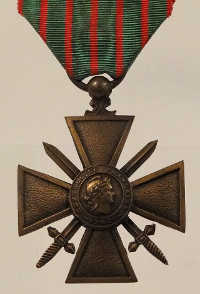
The French Croix de Guerre,
awarded to French and allied soldiers who
distinguished themselves by acts of heroism.
Reginald Thomas Ebrey was born in Wrexham on 1st January 1892, the son of the Reverend Alfred Ebrey. After attending Derker Council School he came to Oldham Hulme Grammar School for three years from September 1905. He then became a student with the Civil Service.
Prior to the war he was a member of the Prince of Wales' Volunteers (South Lancashire Regiment). He was commissioned on 1st December 1915. He served in France with the 4th Battalion and, while attached to the 5th Battalion of the King's Own Yorkshire Light Infantry, was awarded the French Croix de Guerre. He was promoted to lieutenant on 1st July 1917 and to acting captain on 20th June 1919. On resigning his commission on 19th October 1921 he was granted the rank of captain.
After the war he became company secretary of Holden, Burnley and Co of Cumberland Works, Bradford, Manchester. In 1935 he was the general manager of East Yorkshire Motor Services, a bus company based near Hull. He died in 1952 at the age of 60.

The French Croix de Guerre,
awarded to French and allied soldiers who
distinguished themselves by acts of heroism.
Frank Entwistle was born in Oldham on 26th May 1883. His father Albert, a book-keeper at a cotton mill, died in 1886 and although his mother remarried the following year, in 1891 Frank and his mother were living as lodgers in Oldham. He attended Bluecoat School prior to coming to Oldham Hulme Grammar School in 1897. After leaving school in 1899 he worked as a clerk in an excursion booking office and boarded with a family in Werneth. In 1911 he worked as a traffic assistant for Oldham Municipal Tramways.
He enlisted on 9th November 1914 as a private with the newly formed 24th Battalion of the Manchester Regiment and was immediately promoted to quartermaster sergeant. Two months later he was promoted to company quartermaster sergeant with 'C' Company.
He trained with his battalion, firstly in Chadderton and then in Llanfairfechan. During his time in North Wales he returned to Oldham to marry Bessie Thompson. From May to September 1915 the battalion trained at Grantham, and were then stationed at Larkhill until they embarked for France on 8th November 1915.
On 20th August 1916 he was promoted to warrant officer class 2, regimental quartermaster sergeant. He appears to have served in France for over three years, being granted two ten-day periods of leave to England in January and September 1917. He was transferred to the army reserve on 7th February 1919.
Frank Entwistle was mentioned in despatches for "great devotion to duty on the Somme, at Bullecourt, and east of Ypres", and was also awarded the French Croix de Guerre.
In 1939 he was a parcels superintendent at Oldham. He died on 30th March 1953 aged 69.
Fred Etchells was born in Chadderton on 31st March 1888, the son of William Etchells, a salesman for a cotton mill. After attending Drury Lane Board School he came to Oldham Hulme Grammar School in January 1900 for two and a half years. In 1911 he was working as an operative cotton spinner.
When he enlisted with the Royal Army Medical Corps on 3rd August 1915 it was noted that he held a nursing qualification. He embarked from Southampton on 24th September 1916, arriving at Alexandria on 7th October 1916 before travelling from Suez to Bombay and then on to Basra. He served in Mesopotamia as a medical orderly and stretcher bearer with the rank of private from 21st November 1916 to August 1918. He then served for a short time in Persia and Russia. He returned to the UK and was placed on reserve in May 1919.
In 1939 he was working as a painter and decorator at Colwyn Bay. He died in Middleton in 1974 at the age of 86.
Ernest Everington was born in Oldham on 27th August 1898, the son of John Everington, a cotton warper. He attended Derker Council School before coming to Oldham Hulme Grammar School in September 1911. He left school shortly before the start of the war, becoming assistant secretary at Ravens Mill in Hollinwood on 1st January 1916.
He enlisted in the army in February 1917, soon after his 18th birthday; no details of the regiment are shown. In January 1918 he was granted a probationary commission with the Royal Flying Corps.
His training as a pilot started with an intensive technical course at the 2nd School of Aeronautics based at Oxford. He then learnt to fly at the 35th Training Depot Station where his commission as 2nd lieutenant was confirmed. This was followed in September 1918 by four months at the 1st School of Navigation and Bomb Dropping at Stonehenge. By the time he had completed this course the war was over.
He returned to Oldham and married Annie Halliwell in 1924. In 1939 he was secretary of a spinning company in Oldham. He died in 1967 at the age of 69.
Thomas Wild Faulkner was born in Oldham on 14th December 1891. His father, John James Faulkner, a clerk with Oldham Corporation, died in 1896 and his mother remarried; his step-father William Edward Granville Taylor was an engineer of Hollinwood. He attended Werneth Board School before coming to Oldham Hulme Grammar School in September 1903 for three years. After leaving school he worked as a commercial clerk.
He enlisted with the Army Service Corps and was later transferred to the 2nd Battalion of the Northampton Regiment. He served in France, probably from 1917.
He was killed in action at the Somme on 24th March 1918 aged 26. He is commemorated at Pozieres, the memorial to the missing of the Somme in 1918.
William Ward Fielding was born in Newton Heath, Manchester, on 3rd November 1897, the son of J B Fielding, a printer. After attending New Moston Municipal School he came to Oldham Hulme Grammar School in February 1910 for almost two years. On 17th April 1915 at the age of 17 he emigrated to Australia giving his intended occupation as farmhand.
When he attested as a private with the Australian Imperial Force in Sydney on 1st July 1918 he gave his occupation as clerk and mentioned that he had served previously for 5 months with the 11th Battalion of the Manchester Regiment although no evidence can be found.
He was promoted to lance corporal on 14th August 1918 and served in the UK. There is no evidence that he served overseas during the war.
He later returned to Australia and died in 1943 in New South Wales.
Jack Fletcher was born in Oldham on 24th May 1896, the son of John Fletcher, a hotel manager. After attending St Thomas' School, Werneth, he came to Oldham Hulme Grammar School in November 1910 for one year. He worked as a fitter after leaving school.
He joined the Royal Air Force as an air mechanic on 18th April 1918 and was posted to Antwerp on 1st August 1919.
In 1939 he was a textile fitter in Oldham where he died in 1951 aged 55.
Eric Lionel Ford was born in Brixton, Surrey, on 29th June 1896, the son of Isaac L Ford, a baker and confectioner of Hathershaw. After attending Werneth Council School he came to Oldham Hulme Grammar School in 1908 for two years before continuing his education at Manchester Grammar School.
When he joined the 63rd Royal Naval Division on 17th March 1915 he gave his occupation as motor engineer. This was an infantry division made up of Royal Navy and Royal Marine reservists and volunteers who were not needed for service at sea; it became part of the army in 1916.
He served in Gallipoli and after suffering from dysentery in September 1915 was admitted to hospital locally before being invalided home to the UK. He then served in France, taking courses in 'Stokes' guns and at the Army School of Mortars. On 17th March 1917 he returned to England for admittance to Cadet School.
He was granted a commission as 2nd lieutenant with the 4th Battalion of the Lancashire Fusiliers on 15th October 1917. He returned to France but was reported as a prisoner of war on 26th April 1918. On 28th May 1918 he sent a message to his father stating that he was well and requesting that food be sent via the Red Cross. There are no further details concerning where he was held or when he was released.
He later went into the family business and in 1939 was a master baker in Rochdale. He died in Blackpool in 1967 at the age of 71.

The Military Cross,
awarded to officers for gallantry during
active operations against the enemy.
Charles Wainwright Fort was born in Oldham on 4th May 1888, the son of Dr Thomas Fort, a surgeon. After a private education he came to Oldham Hulme Grammar School in 1897 for six years. In 1905 he entered Manchester University to study medicine and qualified MB ChB before the war.
He was granted a commission as lieutenant with the Royal Army Medical Corps on 4th November 1915 and served with the East Lancashire Field Ambulance Division in Egypt. He was later promoted to captain and awarded the Military Cross: "For conspicuous gallantry and devotion to duty during several days when acting as bearer officer. The conditions under which the wounded had to be collected and evacuated were particularly difficult owing to the fact that the troops were executing a withdrawal. By his total disregard of danger, and initiative in bringing forward his bearers, often under heavy shell fire, he succeeded in clearing large numbers of the wounded."
In 1939 he was a medical practitioner living in Manchester. He died there in 1959 at the age of 70.
Harold Mellor Fort was born in Lancaster on 25th January 1887, the son of James W Fort, a dental surgeon. After his father died in 1902 his mother returned to her native Oldham. He had previously been educated at Lancaster Grammar School before he came to Oldham Hulme Grammar School in 1902 for two terms.
He joined the Manchester Regiment as a cadet and was granted a commission with them on 23rd November 1916. He transferred to the Sussex Regiment as a lieutenant and later to the Royal Engineers. He served in France from 11th April 1918.
In 1939 he was working as a solicitor in Oldham. He died on 6th October 1958 at the age of 71.
Vincent James Fowweather was born in Oldham on 26th October 1896, the son of Edward Fowweather, an iron grinder. He attended Smith Street Council School before coming to Oldham Hulme Grammar School for two years from September 1908. After leaving school he took an apprenticeship as a fitter.
He attested as a private with the 24th Battalion of the Manchester Regiment on 18th November 1914 and was promoted to lance corporal on 3rd July 1915. From 3rd September 1915 he was attached for duty to Messrs Haigh Gruban & Co, Oldham, for essential munitions work. He was discharged on 7th February 1919.
In 1939 he was working as a billiard hall manager in Oldham where he died in 1966 at the age of 69.
Charles Hyde Fray was born in Oldham on 25th April 1890, the son of John B Fray, a hosier and draper, later a mill manager. He attended Waterloo Council School before coming to Oldham Hulme Grammar School in September 1904 for two years. In 1911 he was working as an assistant secretary for a cotton spinning mill.
During the war he served overseas as a private with the Army Service Corps. No further records are available.
In 1939 he was working as an auctioneer's clerk in Chadderton. He died in Middleton in 1955 aged 65.
Maurice Bardsley Fray was born in Oldham on 11th April 1895, the son of John B Fray, a mill manager. After attending Waterloo Council School he came to Oldham Hulme Grammar School in September 1909 for two and a half years. He then worked as a shop assistant.
He enlisted on 17th February 1916 with the Royal Flying Corps as 2nd class air mechanic and served in France from 22nd May 1916. He was promoted to 1st class air mechanic on 1st January 1918. He returned from France on 17th February 1919 and, on 23rd March 1919, was posted to the reserve.
In 1939 he was working as a clerk at the Ministry of Labour in Oldham. He died in Middleton in 1974 aged 78.
Charles Edward Garfitt was born in Chadderton on 7th July 1884, the son of Mark Garfitt, an electrician. After a private education he came to Oldham Hulme Grammar School in September 1895 for five years. He then worked as a bank cashier for the Union Bank of Manchester, becoming an Associate of the Institute of Bankers in 1913.
He served in Western Europe, probably France, as a private with the Lancashire Fusiliers. He was promoted to lance corporal with the Machine Gun Corps and commissioned as 2nd lieutenant with the Tank Corps on 28th December 1917. In 1918 he suffered a non-serious gunshot wound to the face.
In 1939 he was working as a bank manager in Nelson, Lancashire. He died there in 1949 at the age of 65.
Saxon Garlick was born in Hollinwood on 7th February 1893, the son of Dr Saxon Garlick, a surgeon. He was educated privately before coming to Oldham Hulme Grammar School in 1903. After he left school in 1908 he became a cotton mule spinner.
He enlisted with the Royal Army Service Corps as a private and was deployed to France at the end of June 1915. He appears to have remained in France until he was placed on reserve on 26th May 1919.
He died in 1972 aged 79.
William Hunt Garlick was born in Hollinwood on 26th June 1889, the son of Dr Saxon Garlick, a surgeon. He was educated at Blackpool Collegiate School before coming to Oldham Hulme Grammar School in 1902 for three years. After leaving school he became a cotton mule spinner, and later a haulage contractor living in Monton, Manchester.
He enlisted as a corporal with the Royal Engineers and served in France with the 30th Division Signal Company from 9th November 1915. It would appear that he served throughout the war until he was placed on reserve in 1919.
However, he died on 28th May 1921 as a result of either injuries received or illness contracted during the war. He was 32 years of age and is commemorated on Hollinwood War Memorial.

The Military Cross,
awarded to officers for gallantry during
active operations against the enemy.
James Brewer Gartside was born in Royton on 14th May 1897, the son of Thomas Edmund Gartside, the manager of a cotton mill. After attending Launderbrook School, Royton, he came to Oldham Hulme Grammar School in 1907 for six years.
He initially enlisted as a private with the Manchester Regiment but then became a cadet in the Officer Training Corps. He was granted a commission on 10th March 1917 with the 6th Battalion of the Lancashire Fusiliers. He served as 2nd lieutenant on the Western Front.
He was awarded the Military Cross on 24th June 1918: "For conspicuous gallantry and devotion to duty. He led forward a fighting patrol through two belts of the enemy's wire and succeeded in cutting a passage through the third belt. Though the alarm was raised in the enemy's trenches and an enemy machine gun opened fire, he entered the trench and pushed forward towards the machine gun, which he bombed, and then he skilfully withdrew his patrol. He showed magnificent courage and resource."
After the war he became a cotton broker and in 1932 was working for Melladew and Clarke of Liverpool. The Brooklyn Daily Eagle of 8th May 1932 reported that he had been elected as a member of the New York Cotton Exchange.
He also served during WW2 as lieutenant colonel with the Lancashire Fusiliers (territorial) and was awarded a Distinguished Service Order in 1940. He retired from the territorials in 1957.
He died on 20th January 1964 at the age of 76.
John Travis Gartside was born in Royton on 2nd March 1892, the son of Thomas E Gartside, secretary at a cotton mill. After attending Launderbrook School in Royton he came to Oldham Hulme Grammar School in January 1903 for five years. He began work as a clerk in a cotton mill and from 1913 to 1916 was works manager at a spinning mill.
He joined the Officer Cadet Wing of the Royal Flying Corps on 8th March 1917 and was assigned to the 48th Training Squadron on 8th June 1917, followed by the 15th and 36th Training Squadrons. He served in France from sometime before 15th September 1917 and was injured when his plane crashed due to the loss of the engine on or before 19th September 1917.
Despite being declared unfit for further service on 12th November 1917, he returned from sick leave to join the School of Photography on 22nd September 1918. However, when he was declared permanently unfit for further service on 21st October 1918 he relinquished his commission on account of ill health and was granted the honorary rank of lieutenant.
In 1939 he was the director of a cotton mill in Royton. He died in 1963 in the Fylde region at the age of 71.
Victor Horatio Gartside was born in Saddleworth on 11th March 1892, the son of Arthur Assheton Gartside of Denshaw. After attending Waterloo Secondary School he came to Oldham Hulme Grammar School in September 1907 for two years. In 1911 he was working as an insurance agent.
His medal card shows that he served overseas as a pioneer with the Royal Engineers during the war. However, he is listed as an absent voter for the Parish of Upton on the Wirral in 1918 and 1919 while he was serving as a private in the 3rd Indian Army Corps.
In 1939 he was living in London. He died in Somerset in 1960 at the age of 68.
Percival Gilbert was born in Milnsbridge, West Yorkshire, on 5th October 1898, the son of Mark Gilbert, a labourer. After attending Dobcross National School he was awarded a West Riding Scholarship to Oldham Hulme Grammar School in September 1910. After leaving school three years later he worked as a clerk.
He attested shortly before his 18th birthday as a private with the Yorkshire Dragoons on 3rd October 1916 but was compulsorily transferred on 31st May 1918 to the Royal Engineers as part of the 7th Cyclist Brigade Signal Section at Fenny Shalford Signal Depot. He served in the UK.
In 1939 he was company solicitor for the Sheffield Public Utility Company. He died in Leicester in 1949 at the age of 51.
Cyril Illingworth Gill was born in Oldham on 18th June 1893, the son of Dr Hugh Gill. After being educated privately he attended Oldham Hulme Grammar School for nine years from January 1904. In 1912 he went to King's College, Cambridge, graduating BA in the Natural Science Tripos in 1915.
He would appear to have become a member of the Officer Training Corps while at Cambridge and was granted a commission with the 10th Battalion of the Manchester Regiment on 1st October 1914. Although he was promoted twice during the war, to lieutenant and then to captain on 1st June 1916, he seems to have finished his degree at Cambridge before taking an active part. It is not known if he served overseas but there is no indication of this.
He relinquished his commission on 30th September 1921. He returned to Cambridge to study medicine and qualified MB BCh 1930, MA 1931.
He died in 1947 at the age of 53.
Percy Gillespie was born in Oldham on 24th July 1889, the son of William Gillespie, a mill manager. After attending Derker Board School he came to Oldham Hulme Grammar School in January 1901 for three years. In 1911 he was assistant manager for a cotton velvet manufacturer.
He was granted a commission to the 10th Battalion of the Manchester Regiment on 5th September 1914, and was promoted to lieutenant before serving with them in Gallipoli from 23rd October 1915. On 20th December 1915 he was admitted to hospital suffering from mumps. After convalescence he served in Egypt and France. On 19th June 1917 he was sent to a sick convoy suffering from trench fever. No further records are available. At some point he had been promoted to captain when he was attached to the East Lancashire Regiment.
In 1939 he was a retired cotton spinner living in Saddleworth. He died in the Pwllheli area in 1953 aged 64.
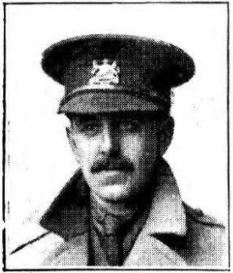
Robert Vincent Gilliat.
Photograph: De Ruvigny's Roll of Honour, 1914 - 1918.
Robert Vincent Gilliat was born in Oldham on 23rd August 1890, the son of Joseph William Gilliat JP, a cotton merchant. He was educated at home before attending Oldham Hulme Grammar School for a year from September 1901 in preparation for secondary education at Harrogate College. From there he went to Leeds University before becoming a cotton merchant.
While at Leeds University he joined the Officer Training Corps in November 1915 after twice being rejected as medically unfit. In January 1916 he enlisted as a private with the Artists' Rifles (28th Battalion, London Regiment) and was commissioned in July 1916 with the 10th Battalion of the Manchester Regiment.
He served in France and Flanders from October 1916 and was attached to the 8th Battalion of the Loyal North Lancashire Regiment. He was wounded at Ypres on 3rd August 1917 and invalided to England.
He was promoted to lieutenant in January 1918 and returned to France in April of that year. On 27th May, in action near Rheims and while attached to the Royal Berkshire Regiment, he was wounded and captured. He was taken to a German field hospital suffering from abdominal wounds and died the following day (28th May 1918, aged 27) as a prisoner of war. He was buried at the Military Cemetery at Savigny which was in German hands.
On 18th July 1923 his body was exhumed, identified by his identity disk, and reinterred at Rethel French National Cemetery in the Ardennes area.
Fred Goldthorpe was born in Oldham on 5th September 1889, the son of William Goldthorpe, a cotton twister. After attending Watersheddings Board School he came to Oldham Hulme Grammar School in September 1902 for four years. In 1911 he was working as a calico cotton weaver.
He enlisted on 2nd March 1916 as a private with the Royal Army Medical Corps and was called for service on 4th April 1917. He served in Salonika with the 68th General Hospital and then at a refugee camp at Karaissi. In September 1917 he was admitted to hospital three times suffering from diarrhoea. The following month he was admitted to the 43rd General Hospital suffering from malaria and on 1st February 1918 was transferred to the UK under medical classification "affected by malaria, not to be sent to a theatre of war other than France or Italy."
On 13th July 1918, having recovered, he was posted to RAMC Cherry Hinton where he was treated for syphilis which he said had been contracted in Oldham. A letter on his file indicates that he had been practically deaf all his life and had problems with speech, and that his hearing had been worse since contracting malarial fever in Salonika. He was placed on reserve on 9th December 1919.
In 1939 he was working as a loom overlooker in Oldham. He died there in 1949 aged 59.
Herbert James Gorbutt was born in Hollinwood on 16th August 1884, the son of Robert Gorbutt, a manager. He attended Bourne Street Board School before coming to Oldham Hulme Grammar School in September 1895. He remained at school for four years. In 1911 he was a colliery clerk and had married the previous year.
He enlisted on 6th December 1915 as a gunner with the Royal Garrison Artillery but was not called to duty until 21st November 1916. After attending signal school at Southampton in January 1917, he was promoted to signaller and posted overseas (possibly to Italy) on 1st May 1917.
He was slightly wounded on 11th August 1917 but remained on duty. During 1918 he was twice granted extended leave to deal with urgent private affairs. He was transferred to the army reserve on 17th May 1919.
In 1939 he was a company secretary in Oldham. He died in 1968 aged 84.
Albert Gray was born in Manchester on 30th April 1898, the son of Albert Gray, a mill manager. After attending Eustace Street Council School he received an Assheton Scholarship to attend Oldham Hulme Grammar School from September 1911. He left three years later to take up an apprenticeship as a chemist.
He attested shortly after his 18th birthday on 29th May 1916 at Oldham as a private with the Manchester Regiment. He served in the UK until 26th June 1917 when he joined the 2nd Battalion in the field in France. He was injured on 3rd October 1918 by a gunshot wound to the left shoulder which chipped the scapula, requiring surgery on 5th and 23rd October. He was repatriated to the UK and recovered at Berrington War Hospital in Shrewsbury from 9th to 30th January 1919.
In 1939 he was a pharmacist working in Ashton-under-Lyne. He died there in 1983 at the age of 85.
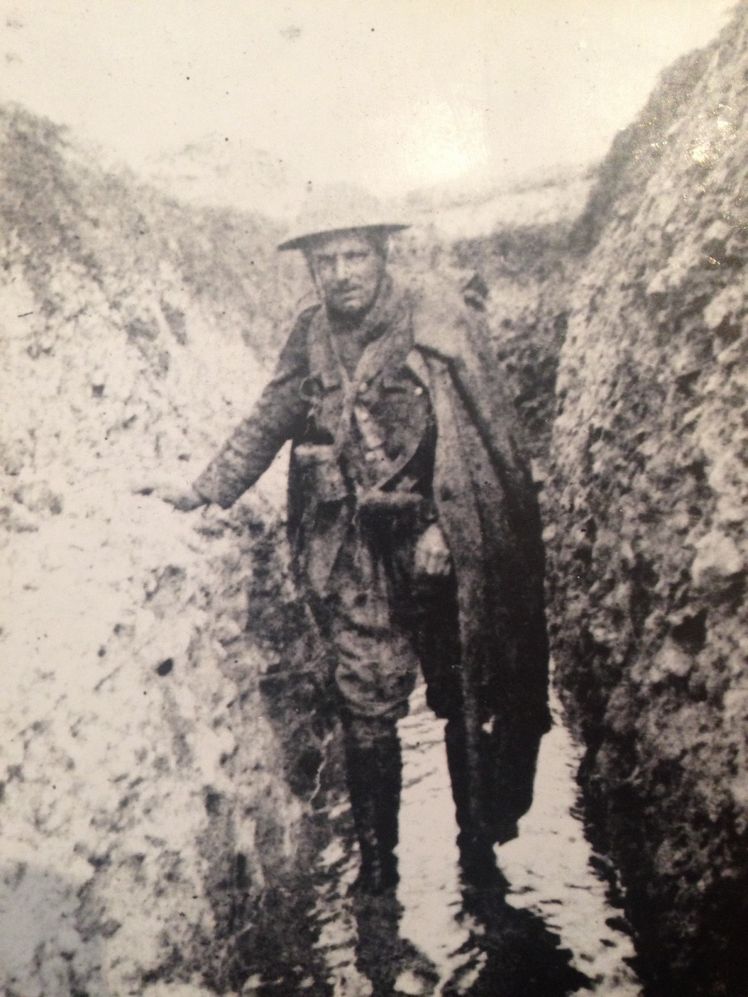
John Greaves.
Photograph from collection of Alasdair Greaves.
John Greaves was born on 19th October 1889, the son of Joseph Greaves, a schoolmaster. After attending Waterloo Board School he came to Oldham Hulme Grammar School for two years in January 1906.
He attended Manchester University after leaving school and graduated BSc Tech. While at university he joined the Officer Training Corps as a cadet and was granted a commission as a special reserve officer with the 2nd Battalion (regular army) of the Lancashire Fusiliers on 22nd July 1914, shortly before the war started.
He joined his battalion in Flanders in April 1915 and shortly afterwards on 2nd May he was gassed north-east of Ypres. He was taken to Woolwich Hospital. After convalescence he returned to the front and was wounded by a bullet through the leg in October 1915. He again returned to the front line but a gunshot wound to the chest in the spring of 1917 invalided him out of the army. During the war he was promoted to lieutenant and then to acting captain, and was twice mentioned in despatches.
After recovery in 1917 he joined the 'JATS', the Lahore Division of the Indian Army, and was promoted to captain on 5th May 1919. The Jat people are a community of traditionally non-elite tillers and herders, mainly Hindu, from the Punjab region; they are well-known for their military capabilities and earned many decorations during the war. He remained with them, becoming their adjutant, until he resigned his commission on 3rd October 1921.
While with the Lancashire Fusiliers he kept a diary, a short extract of which appears in the March 1916 issue of The Oldham Hulmeian, the school magazine of the period. He writes briefly of leaving Southampton, the novelty of the food - biscuits and bully beef - and of arriving at the muddy trenches. However, much of the double-page excerpt is about the events in Minden in 1759 and the traditions of the Lancashire Fusiliers.
John Chadwick Greaves was born in Oldham on 6th January 1890, the son of John Greaves, a tailor. He attended Waterloo Board School before coming to Oldham Hulme Grammar School for two years from April 1900. After leaving school he became a mechanic.
Prior to the war he was a territorial member of the Duke of Wellington's West Riding Regiment and on 14th October 1914 was granted a commission with the 7th Battalion. He served in France from April 1915 and was promoted to lieutenant on 1st June 1916. He relinquished his commission on 26th February 1919 on account of ill health contracted on active service.
In 1939 he was the London manager of a gas and oil company. He died in 1950 at the age of 60.
Harry Greenall was born in Oldham on 5th June 1890, the son of Thomas Greenall, a provision merchant. After attending Arnold House School in Blackpool he came to Oldham Hulme Grammar School in September 1903 for two years. In 1911 he was working as an assistant in the family business.
He attested at Oldham as a private with the 24th Battalion of the Manchester Regiment on 28th November 1914. He served overseas for 3 years and 3 months, firstly in France from 8th November 1915 where, in 1916, he was involved in the Battle of the Somme. He was granted ten days' leave in June 1917 and moved with his battalion to Italy in November 1917. After two weeks' leave in the UK in October 1918 he returned to Italy and served until 10th February 1919.
In 1939 he was working as a grocer in Oldham. He died at Liverpool Sanatorium on 30th December 1942 at the age of 52.
James Herbert Greenall was born in Oldham on 8th March 1894, the son of Thomas Greenall, a provision merchant. After attending Arnold House School in Blackpool he came to Oldham Hulme Grammar School in September 1903 for almost 5 years. In 1911 he was working as an assistant in the family business.
He was a conscientious objector during the war due to his beliefs as a member of the Christadelphian Church. At a hearing he said that he was willing to do national service so long as it was not military service. From 1916 he did work of national importance under the Home Office scheme, working on Goodmayes Farm in Ilford.
In 1939 he was a works' manager in Blackpool and died there in 1964 at the age of 70.
William Philip Gregg was born in Salford on 14th October 1900, the son of H Gregg, a chartered secretary. After attending Werneth Council School he came to Oldham Hulme Grammar School for four years from September 1912. In 1918 he was working as a draughtsman.
He joined the Royal Air Force on 30th October 1918, shortly after his 18th birthday, as an air mechanic class 3. He was assigned to a training repair depot in the UK.
After the war he became a mechanical engineer and in 1939 was living in Newton-le-Willows. He emigrated with his wife and daughter to Australia in 1952, and is listed as an engineer on electoral registers in New South Wales for the years 1954 to 1968, living at Turramurra and later Eden.
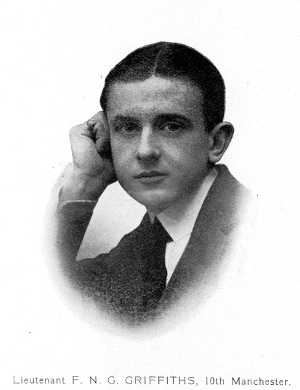
Photograph from "The Oldham Hulmeian", July 1915.
Francis Noot Gifford Griffiths, known as Frank, was born in Oldham on 12th November 1887, the son of David Griffiths, a solicitor. After attending Werneth Board School he came to Oldham Hulme Grammar School in 1900 and remained until the age of 16. In 1911 he was secretary to a cotton spinning company.
Prior to the war he was a territorial officer in the 10th Battalion of the Manchester Regiment, and was promoted to 2nd lieutenant on 14th June 1912. The battalion were mobilised as soon as war was declared, sailing from Southampton to Alexandria on 22nd September 1914.
After seven months in the deserts of Egypt, the battalion moved to Gallipoli where they found themselves in the midst of battle almost immediately. Within three weeks the battalion had lost 14 men and over 40 had been wounded. Griffiths died from his wounds on 2nd June 1915 at the age of 27.
He is commemorated at the Lancashire Landing Cemetery in Turkey.
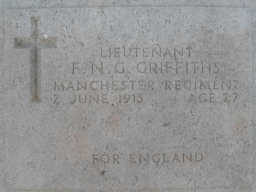
Memorial Stone.
The Oldham Hulmeian, the school magazine of the period, printed in the July 1915 issue the following obituary:
Roll of Honour: F N G Griffiths: Lieutenant F N G Griffiths entered the school in April 1900 and left in December 1903. He adopted a business career and became secretary of the Rutland Spinning Company, Shaw. At school he took a prominent part in the Shakespearian plays, and afterwards became well known for amateur theatricals both in Oldham and Manchester. He had been an officer in the 10th Manchesters for some time before the outbreak of war. He went with his regiment to Egypt, and afterwards to the Dardanelles, and received in the Gallipoli Peninsula the wound from which he died on 2nd June 1915 aged 27 years.
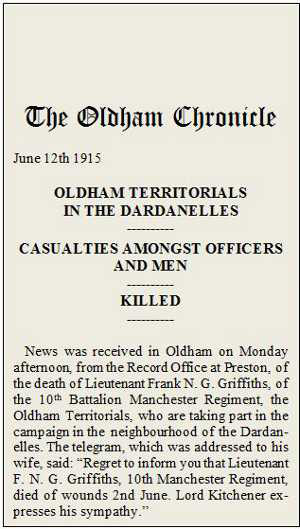
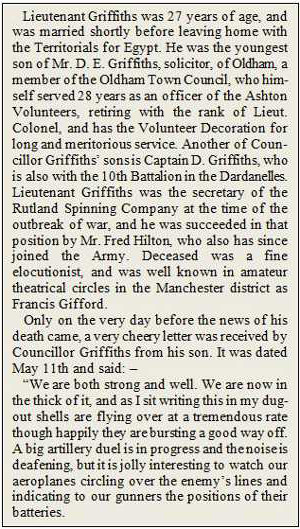
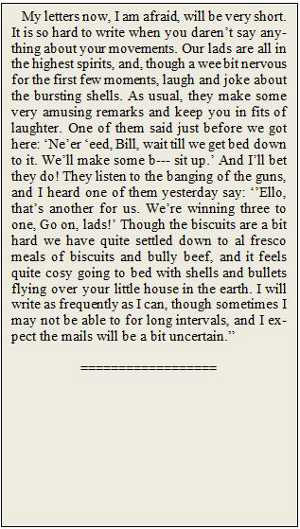
Richard Townend Grime was born in Oldham on 27th August 1889, the son of John Townend Grime, a railway accountant. He attended New Moston School before coming to Oldham Hulme Grammar School in 1901 for four years. After leaving school he worked as an insurance clerk.
He attested on 29th November 1915 with the Manchester Regiment and was placed on reserve. He appears to have been transferred to the King's Shropshire Regiment on 29th February 1916 and, following a number of further transfers, was posted with the Labour Corps as a lance corporal on 22nd May 1917. On 1st November 1917 he was appointed acting sergeant and, six weeks later, to company quartermaster sergeant, reverting to corporal at his own request on 22nd December 1917. In February of the following year he was again promoted and demoted in a similar way.
He was compulsorily transferred as a corporal to the 30th Battalion of the London Regiment on 3rd July 1918. He appears to have served in France with both the Labour Corps and the London Regiment; letters on his file give overseas service dates as 19th May 1917 to 3rd April 1918 when he was wounded.
In 1939 he was working as an insurance clerk in Manchester. He died in Eastbourne in 1969 aged 79.
Reginald Sidney Haigh was born in Saddleworth on 28th April 1893, the son of Walter Lee Haigh, a fitter. After attending Dobcross National School he came to Oldham Hulme Grammar School in January 1907 for four years before leaving to become a clerk.
He enlisted as a private with the Border Regiment and was later promoted to lance corporal. He served in France from 26th June 1917 but was wounded in the leg on 14th August 1917. It is not known if his discharge on 19th March 1918, when he was deemed to be no longer physically fit for war service, was due to this, or another, injury.
In his discharge records his military character was described as "very good, a steady, reliable and well-conducted man with a good record." It was also noted that he was entitled to wear one gold stripe.
In 1939 he was a railway clerk living in London. He died in 1976 at the age of 83.
Harold Hall was born in Oldham on 24th June 1893, the son of John Hall, a cotton spinner. He attended Derker Council School before coming to Oldham Hulme Grammar School in September 1906 for four years. After leaving school he became a pupil teacher in an elementary school. He qualified as a teacher at Chester Diocesan Training College and in 1914 accepted a post as assistant master at Stanley Road Senior School in Chadderton.
At the end of 1915 he joined the Royal Navy, possibly because at 5'1" in height he was not tall enough to serve in the Army. He served as a waiter at HMS Pembroke and HMS Actaeon, both training establishments at Chatham.
When discharged on 10th April 1919 he returned to teaching. In 1923 he became headmaster at Middleton Junction School and was later headmaster at Mills Hill and Christ Church schools in Chadderton.
He died in 1972 at the age of 79.

The Military Cross,
awarded to officers for gallantry during
active operations against the enemy.
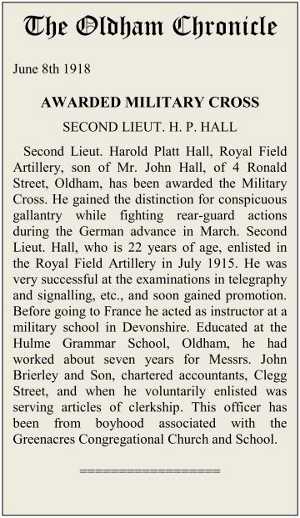
Harold Platt Hall was born in Oldham on 12th June 1895, the son of John Hall, a fitter. After attending Derker Council School he came to Oldham Hulme Grammar School in September 1907 for three years. He started his career with chartered accountants Messrs John Brierley and Son of Clegg Street, and when he enlisted, was serving articles of clerkship.
He enlisted in July 1915 with the Royal Horse Artillery but was discharged to the Officer Training Corps. He was granted a commission with the Royal Field Artillery Special Reserve on 2nd July 1917.
While serving in France in June 1918 he was awarded the Military Cross: "For conspicuous gallantry and devotion to duty. He fought his guns continuously for sixteen hours under heavy fire. During the last six hours the enemy made many determined attempts to rush the guns, but by his fine example and great coolness in handling the guns they were beaten off."
He was killed in action in France on 9th November 1918 at the age of 23. He is commemorated at St Sever Cemetery, Rouen.
William Holden Hall was born in Royton on 21st April 1889, the son of William Hall, a veterinary surgeon. After attending Brook House School he came to Oldham Hulme Grammar School in 1900. He remained at school until 1908 when he went to Keble College, Oxford. He was called to the bar in 1914 and was a barrister-at-law, Oxford Middle Temple in 1916.
He joined the Officer Training Corps as a cadet in 1916 and was granted a commission as 2nd lieutenant with the Royal Field Artillery on 1st October 1916. He was deployed to Flanders on 19th January 1917 with the 'D' Battery, 51st Brigade.
He was killed in action on 26th September 1917 at the age of 28. He is commemorated at Vlamertinghe New Military Cemetery and on Royton War Memorial.
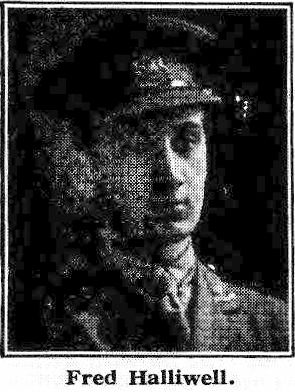
Photograph: De Ruvigny's Roll of Honour.
Fred Halliwell was born in Oldham on 14th April 1898, the second of three sons of John Edward Halliwell, an accountant's clerk, and later estate agent. After attending the Municipal Secondary School he came to Oldham Hulme Grammar School for three years from 1910. He gained some accountancy experience working with his father before joining the staff of the Manchester and Liverpool District Bank.
He enlisted in December 1916 as a private with the Artist's Rifles (the 28th Battalion of the London Regiment), and was granted a commission as 2nd lieutenant with the 11th Battalion of the Manchester Regiment on 29th August 1917. Seven weeks later he was deployed to France.
He was killed in action on 22nd April 1918 at the age of 20. He is commemorated at the Philosophe British Cemetery at Mazingarbe.
A memorial window in St Thomas' Church, Werneth, commemorates both Fred and his elder brother George, who died just two months later. The youngest and only remaining son Walter, who died in a climbing accident at Betws-y-Coed in 1921, is also commemorated on the window.
The inscription reads: To the glory of God and in loving memory of three brothers. Pte. George Halliwell aged 22. Lieut. Fred Halliwell aged 20. Walter Halliwell aged 20. The gift of their parents, May 1930.
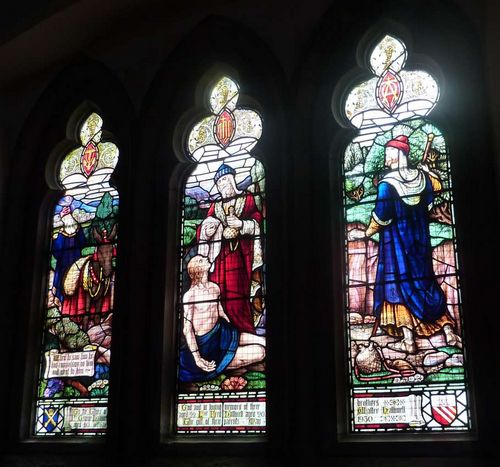
Photograph: Margaret Castleton,
Oldham Hulme Grammar School Archive Team.
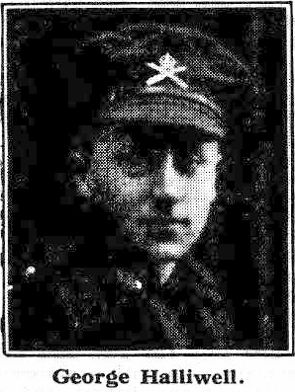
Photograph: De Ruvigny's Roll of Honour.
George Halliwell was born in Oldham on 16th May 1896, the eldest son of John Edward Halliwell, an accountant's clerk, and later estate agent. After attending Waterloo Secondary School he came to Oldham Hulme Grammar School for four years from 1908. When he enlisted he was employed by the Union Bank of Manchester Ltd.
He enlisted on 16th August 1915 as a private with the Public Schools Battalion of the Royal Fusiliers and was transferred to the Machine Gun Corps on 28th February 1916. He served in France from 25th April 1916 and took part in the battle of the Somme and many other engagements.
On 10th May 1917 he was invalided home to England suffering from bronchitis and deafness. After some time in hospital he recovered sufficiently to be posted for home duty and joined the staff at the Headquarters Tracing Office in Grantham. However, his illness persisted and on 25th June he was sent home to his parents to await discharge from the army. He died there within hours of arrival on 28th June 1918 from illness contracted while on active service. He was 22 years of age. He was buried at Chadderton Cemetery and commemorated at St Thomas' Church, Werneth (see above).
Jonathan Leach Halliwell was born in Oldham on 22nd March 1894, the son of W H Halliwell, a manager. After attending Werneth Council School he came to Oldham Hulme Grammar School in September 1906 for two years. He then worked as a railway clerk.
He attested as a private with the Royal Army Medical Corps on 5th December 1915 but was classified by the medical board as group C2 meaning that he could not serve overseas. He served in the south of England and was admitted to hospital at Woking suffering from influenza at the end of October 1918. He served in the UK until 20th March 1919.
In 1939 he was a district supervisor in Hove, Sussex. He died in 1953 in Crewe at the age of 58.
Samuel Schofield Hammersley was born in Oldham on 22nd December 1892, the son of John S Hammersley, a draper. After attending Waterloo Council School he came to Oldham Hulme Grammar School in September 1905 for six years. He studied natural science at King's College, Cambridge, prior to the war.
He was a member of the Officer Training Corps and was granted a commission as 2nd lieutenant with the East Lancashire Regiment on 18th December 1914. While serving in Gallipoli he was wounded (no further details available). He was promoted to lieutenant and then to captain while he was employed as workshop officer with the Machine Gun Corps, later the Tank Corps. He continued in this role with the Tank Corps Engineering Branch until 6th March 1919.
When he returned to civilian life he joined his father on the board of his cotton mills. As an industrialist he was convinced that manufacturing was the backbone of national prosperity. In 1924 he was elected as Member of Parliament for Stockport representing the Conservative Party, stepping down at the 1935 general election. In 1938 he won a by-election and served as member of parliament for Willesden East until he was defeated in 1945. He was chairman of the Parliamentary Palestine Committee from 1943 to 1945 and executive chairman of the Anglo-Israel Association from 1951 to 1963.
During WW2 he worked with the Ministry of Supply on tank production. He built up the company of S Noton Ltd, one of the world's largest manufacturers of luggage and handbags and, in 1946, was listed as managing director of twelve companies.
He died on 28th March 1965 in London at the age of 72.
Albert Leonard Hardie was born in Linthwaite, West Yorkshire, on 10th July 1899, the son of John B Hardie, a woollen spinner. After attending Delph Council School he received a West Riding Scholarship to attend Oldham Hulme Grammar School from September 1911. He remained at school until July 1915 and by November 1917 had qualified as a music teacher.
He attested as a private with the Bedford Regiment on 1st November 1917 and served in France from 16th November 1918.
In 1939 he was a music teacher living in Saddleworth where he died on 2nd August 1958 at the age of 59.

The Military Cross,
awarded to officers for gallantry during
active operations against the enemy.
William Eric Harding was born in the Kendal area on 10th September 1896, the son of the Reverend A Harding, Congregational Minister. He attended Harrogate Secondary School before coming to Oldham Hulme Grammar School for three years from September 1910.
Although it is not known where or when he served during the war, it appears he initially joined the Army Cyclist Corps. Information suggests that he was granted a commission with the Machine Gun Corps and later transferred to the Manchester Regiment.
He was awarded the Military Cross at the beginning of 1918: "For conspicuous gallantry and devotion to duty. After capturing his objective he noticed that the succeeding waves which were coming up had been checked by hostile machine gun fire. He thereupon collected a party of twenty-five men, and after opening a burst of rapid fire, rushed the machine gun, which was eventually captured."
Little is known about his career; he followed his father into the church and, in 1931, wrote a book about Park Congregational Church in Ramsbottom where he was the incumbent. He died on 8th April 1957 at the age of 60.
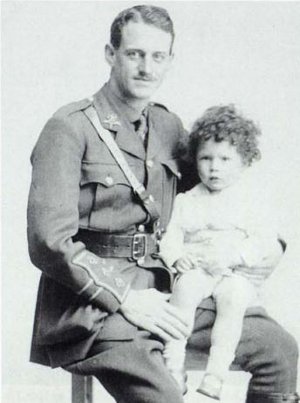
Fred Hardman in 1917.
Photograph from "Amateur Soldiers" by K W Mitchinson.
Fred Hardman was born in Heywood on 2nd August 1890, the son of Charles Hardman, a rope manufacturer. He attended Waterloo Board School before coming to Oldham Hulme Grammar School for four years from January 1901. He then joined his father's company as a rope manufacturer, becoming after the war a director of Hardman, Ingham and Dawson Ltd of Bankside Mill, Oldham, and Diamond Rope Works, Royton.
He married in 1913 and his first son was born in 1914, probably shortly before war started.
Hardman was already a member of the territorial 10th Battalion of the Manchester Regiment (his father was a major in the battalion) and he was granted a commission on 12th August 1910. He was promoted to lieutenant on 8th June 1912 and continued to rise through the ranks to captain (1915), major (before 1926) and lieutenant colonel before relinquishing his command of the battalion in 1932. During the war he was a prolific writer of letters to his wife and his father; these letters and their replies now form part of the Hardman Collection at the Imperial War Museum. The following notes about his war activities are taken from the book Amateur Soldiers by K W Mitchinson, which itself used the letters as a source.

The Military Cross,
awarded to officers for gallantry during
active operations against the enemy.
It is reported that at 18.00 hours on 4th August 1914 the order to mobilise was received. Telegrams were sent to all men of the 10th Manchesters and the majority reported to the drill hall for duty at 06.00 hours the next morning. During the following two weeks they were examined by a doctor, supplied with their kit, took part in daily parades and training exercises, and spent time requisitioning horses and carriages.
On 20th August they marched to Bury for further training, and on 8th September their families visited them to say goodbye. The following day they embarked by train to Southampton where they boarded the RMS Avon. The 29 officers (9 of the original 26 officers were OHGS old-boys) and 980 other ranks had little idea of their destination.
After arriving in Alexandria, Egypt, they moved to temporary accommodation near Cairo; their sojourn here allowed them the opportunity to explore the pyramids. Their training, which continued here and later at Abassia barracks, was completed in March 1915 when they moved to Kantara and divided into detachments to man guard posts along 27 miles of the east bank of the Suez Canal.
Two months later they were again aboard a ship with no knowledge of their destination. They arrived at the Dardanelles on 9th May 1915, managing to disembark and reach land without loss of life despite continuous gunfire. They found the muddy conditions here very different from the hot desert of Egypt.
On 4th June the battalion made its first assault against heavily entrenched and defended Turkish positions at Krithia. Fred Hardman, concealing little of the truth in the privacy of his letters, gave the following account of the battle: "As our first companies endeavoured to climb out of the trenches, the parapet was swept by withering machine gun and shrapnel fire... back rolled the men of the first two companies, dead and dying on top of we waiting men of Z Company. In five minutes the trench was simply jammed with the maimed and dying... Major Brandreth (2nd Royal Fusiliers) came along brandishing his revolver and ordered me and my men forward at once. The task seemed a hopeless one... I went forward at a steady trot and, taking a glance either side of me, found that I was crossing No Man's Land alone. Many of the men who had tried to get over with me had gone down and I stood and waited as all around me in the undergrowth and brushwood seemed to be dead and dying men."
Hardman managed to gather a dozen men and they battered their way through the uncut wire into the Turkish trenches. Counter attacks left them unable to move for two days when finally they were rescued; only four of them remained alive. Hardman was deeply upset by the loss of so many friends and men he had come to know well. Six officers and 88 men died, and 320 were wounded. By August, Hardman and three others were all that remained of the original 29 officers who had shipped out of Southampton. At the end of December, the remainder of the 10th Battalion returned to Egypt although it seems that Hardman had been injured and appears to have returned to England.
In December 1916 he re-joined his battalion in Egypt and in the following March they once again boarded a ship, this time headed for Marseilles, from where they would eventually join the battles of the Somme area.
Later in the war, after a particularly brutal night in the frozen trenches with gunfire and shells raining down on them, Hardman wrote to his wife assuring her that "when victory is won I will come back" but two nights later he wrote to his father that "I wonder sometimes how it all comes about and why it is my lot to continuously see my friends go down while I come through. Sooner or later my luck must change." Shortly thereafter, the morning after a gas attack, he realised he had not secured his mask promptly enough; his eyes were closed and weeping, his throat and chest wracked with pain and his heart feeling it was about to leap through his rib cage. Blindfolded against the light he was evacuated to hospital in Boulogne. Once recovered he re-joined his battalion to find only six of its original 1914 members still serving, and all of his officers not from Oldham. The entire battalion was no longer made up of Oldhamers. He was again evacuated in September 1918, suffering from the effect of mustard gas.
Hardman was awarded the Military Cross for his actions during the Gallipoli campaign (citation not available); the presentation was made some years later at a wood in France.
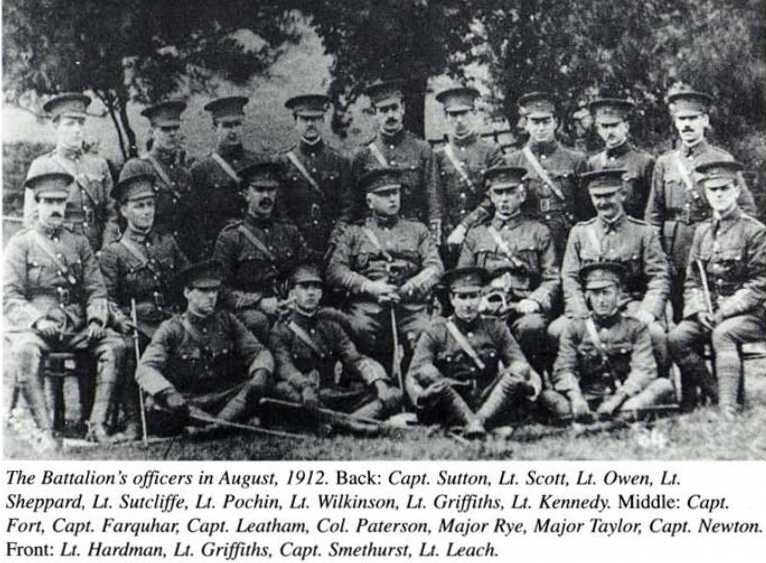
Officers of the 10th Manchester Regiment, August 1912. Photograph from "Amateur Soldiers" by K W Mitchinson.
James Shepherd Harrison was born in Oldham on 9th April 1894, the son of John Harrison, an elementary schoolmaster. After attending Freehold Council School he came to Oldham Hulme Grammar School in September 1904 for seven years. He later became a cotton mill secretary.
He joined the Royal Flying Corps on 31st August 1917 as an air mechanic 3rd class. He initially trained at a repair depot before being moved to the Corps Siege Park. He was placed on reserve on 20th January 1919.
He died in 1932 at the age of 37 in Eastbourne.
Samuel Evelyn Harrop was born in Oldham on 3rd May 1883, the son of William Harrop, a cotton doubler. After attending Manchester Grammar School he came to Oldham Hulme Grammar School in September 1895 for three and a half years. By 1911 he was working as a cotton doubler living in Failsworth with his wife and children.
From his WW1 medal card we know that he served overseas as a private with the Army Service Corps. No further details are available.
In 1939 he was working as a cotton yarn merchant in Sale, Cheshire. He died in the area in 1946 aged 63.
Edgar Hartley was born in Oldham on 28th August 1893, the son of the Reverend L Hartley, Pastor at Waterhead Congregational Church. He attended Derker Council School before coming to Oldham Hulme Grammar School in September 1906 for four years. Known as a promising cricketer, he played for the school's 1st XI. After leaving school he became a bank clerk with the London, City and Midland Bank in Oldham. He was also a teacher at the Ashton Road Congregational Church and a member of the choir.
It appears that he enlisted with the Manchester Regiment and was among the draft of men sent to replenish the 1st Battalion in the Tigris area in early 1916.
The history of the 1st Battalion describes the battle which took place near the town of Kut on 9th January 1917: "January 1917, on the 9th an attack by the division across the river near Kut, the battalion got in to the Turkish trenches and consolidated their position, the Turks counter attacked (like a football crowd) and a furious fight ensued. The trenches were held but with severe casualties (87 killed and 141 wounded)."
He was killed in action in Mesopotamia on 9th January 1917 at the age of 23. He is commemorated at the Amara War Cemetery in Iraq.
William Sadler Hartley was born in Shaw on 12th October 1893, the son of William C Hartley, a dental surgeon. After attending Fairford Preparatory School in Gloucestershire, he came to Oldham Hulme Grammar School for two years from 1903. In 1905 he completed his secondary education at Lucton Boarding School in Herefordshire. From 1910 he studied at Manchester University to become a dental surgeon.
He enlisted in September 1914 as a private with the 7th Battalion of the Royal Fusiliers and was deployed to France on 14th November 1915. It is noted that he was mentioned in despatches and was wounded at some time.
He was killed in action at Beaucourt on 14th November 1916 at the age of 23. He is commemorated at Thiepval, the memorial to the missing of the Somme, and on Shaw War Memorial.
Charles Henry Haslam was born in Oldham on 25th January 1883. He studied at the Werneth Mechanics Institute and at Manchester Technical School. In 1906 he became woodwork master at Oldham Hulme Grammar School. He was also responsible for keeping the stores for the chemistry and physics laboratories. He was married with one daughter at the start of the war.
He enlisted on 9th December 1915 as a private with the Canteens section of the Army Service Corps and served with them, probably in France, from July 1917. On 9th April 1918 he was discharged from the army as no longer fit for service due to illness. He returned to school at that time and remained a member of staff until 1921.
He died on 22nd January 1961 at the age of 77.
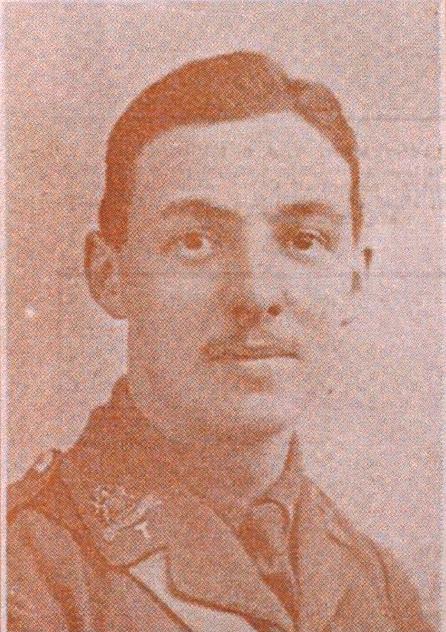
Photograph from the "Oldham Chronicle,
War Supplement", 15th April 1916.
Handel Hassall was born in Oldham on 5th March 1890, the son of James H Hassall, an artisan iron dresser. After attending Westwood Board School he came to Oldham Hulme Grammar School in September 1901 for six years. He received a BA degree in Theology from Manchester University before the war.
As a member of the Officer Training Corps he was granted a commission as 2nd lieutenant with the 10th Battalion of the Manchester Regiment on 14th October 1914. He joined his regiment in Gallipoli in July 1915. He was admitted to hospital in Malta suffering from typhoid on 26th October 1915. After re-joining his unit, he was mentioned in despatches on 11th December 1915 and shortly thereafter promoted to lieutenant. He was awarded the Military Cross in February 1916 while serving in Egypt. Later that year he received a month's leave in the UK from June to July.

The Military Cross,
awarded to officers for gallantry during
active operations against the enemy.
In early 1917 his battalion moved to France. He was sent back to the UK on 5th June suffering from illness and received his Military Cross from King George V on 30th June. He was promoted to captain in August 1917 and seriously wounded in the head in May 1918.
After relinquishing his commission on 28th May 1919 he studied at Moravian House in Gomersal near Leeds to become a Moravian Minister. In 1939 he was working as a minister in Droylsden. He died in Ashton-under-Lyne in 1953 at the age of 63.
Vernon Hepworth was born in Oldham on 3rd July 1900, the son of Frank Hepworth, a yarn agent. After attending Werneth Council School he was awarded a Hulme Scholarship to attend Oldham Hulme Grammar School from September 1912. He left school in the summer of 1916 to work as a commercial clerk.
He joined the Royal Air Force on 26 July 1918 as a private and appears to have served as an aircraftman second class at a training depot until 24th October 1919.
In 1939 he was an insurance agent living in Blackpool and died there in 1951 at the age of 50.
Joseph Higginbottom was born in New Mills, Derbyshire, on 26th July 1888, the son of George Higginbottom, a mill manager. After attending Newtown Board School he came to Oldham Hulme Grammar School in April 1901.
After leaving school in 1903 he took up a 7-year apprenticeship with Messrs Pickup and Knowles Ltd of Pendleton, Manchester. During this time he studied at the Technical Institute in Salford, gaining passes in 1906 in applied mechanics, geometry, mathematics (1st class) and machine drawing. He then spent two years with Messrs Lankesters and Sons Ltd, Engineers of Southampton, before returning as an engineer to Messrs Pickup and Knowles of Pendleton.
In 1914 he enlisted with the University and Public Schools Battalion of the London Regiment but was released by order of the War Office in 1915 to work at the Royal Torpedo Factory at Greenock. In 1916 he was promoted to Inspector and engaged solely on research work. In 1917 he was promoted to the position of experimental draughtsman to the Assistant Superintendent and was responsible for all experimental work in the machine factory.
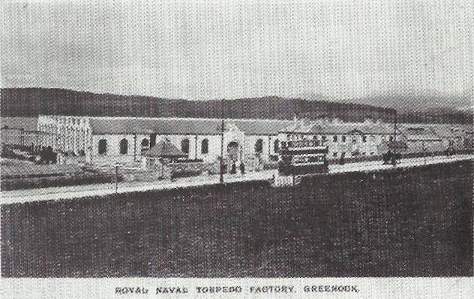
Greenock Torpedo Factory in WW1, from a postcard. www.shopinverclyde.com
After being discharged in 1919 he became the chief draughtsman with Messrs William Kenyon and Sons Ltd, Dukinfield, before moving to John Roscoe and Company of Hyde. He was accepted as a member of the Institution of Mechanical Engineers in 1922. He died in 1973 at the age of 84.
Christopher Entwistle Hill was born in Holcombe, Lancashire, on 20th June 1893, the son of James H Hill, a cotton merchant. After attending Stand Grammar School he came to Oldham Hulme Grammar School from January 1905 to July 1907. In 1911 he was a cotton waste salesman living with his parents in Southport.
Although no service records remain, an entry in The London Gazette shows that he was granted a commission with the Manchester Regiment on 27 July 1915. His medal card shows that he served overseas.
After the war he became a cotton merchant travelling frequently during the 1930s between the UK and Quebec, Canada. By 1939 he had retired to Southport and died there in 1946 at the age of 53.
Frank Arnold Hilton was born in Oldham on 20th August 1895, the son of Samuel Hilton, a butcher. After attending Derker Council School he received a scholarship from Oldham Education to Oldham Hulme Grammar School from September 1908. He left school in July 1911 to work as a clerk.
He attested as a private with the 24th Battalion of the Manchester Regiment on 27th November 1914 and was promoted twice, to corporal on 16th January 1915 and to lance sergeant in July 1915. He was posted to France on 8th November 1915, where some weeks later he was admitted to hospital on 31st December 1915 suffering from tuberculosis and swollen glands of the neck. He was repatriated to the UK on 26th January 1916, consequently being discharged from the army on 23rd August 1916 as no longer physically fit for service.
In 1939 he was working as a bus ticket inspector at Whitehaven. He died there in 1941 at the age of 46.
George Hilton was born in Oldham on 31st October 1892, the younger son of George Collins Hilton, a clothier. He attended Werneth Council School before coming to Oldham Hulme Grammar School in 1905 for three years. He left school at 15 to take up an apprenticeship with a cotton spinner.
He enlisted at Oldham on 21st November 1914 as a private with the 24th (Oldham) Battalion of the Manchester Regiment. He was initially trained at Oldham before the battalion moved to Llanfairfechan in North Wales for two months. During further training at Grantham, he was discharged on 30th July 1915 having been accepted for the Inns of Court Officer Training Corps.
He was granted a commission on 31st December 1915 as 2nd lieutenant with the King's Own Royal Lancaster Regiment and deployed to France.
He was killed in action on 8th August 1916 at the age of 23 and is commemorated at Thiepval, the memorial to the missing of the Somme. His only brother died suddenly in 1922.
John Broughton Hilton was born in Oldham on 11th November 1890, the elder son of George Collins Hilton, a clothier. After attending Werneth Board School he came to Oldham Hulme Grammar School in 1905 for three years. He later became an accountant's articled clerk.
He enlisted on 30th November 1915 as a private with the Artists' Rifles, the 28th Battalion of the London Regiment. Although he was considered fit for service in the territorial force, it appears that he served for four years as an accountant and auditor in the UK. During this time he was promoted to lance corporal on 29th April 1916, to corporal on 22nd September 1916, and later to sergeant.
He was discharged after the war on 31st March 1920 and returned to his parents' home. He died there suddenly on 4th January 1922 at the age of 31. His younger brother had been killed at the Somme.
Henry Holden was born in Oldham on 13th October 1899, the son of Herbert Holden, a cotton merchant. After attending Werneth Council School he came to Oldham Hulme Grammar School for just over two years from September 1911.
When he joined the Royal Naval Air Service on 29th November 1917 he gave his civilian occupation as motor driver. He served as an aircraftman at an aircraft repair depot, probably in the UK.
He died in Blackpool in 1956 at the age of 57.
Isaac Prockter Holden was born in Oldham on 11th November 1898, the son of John Holden, a mill manager. After a private education he came to Oldham Hulme Grammar School for two years from September 1907. He continued his education at Arnold House School in Blackpool.
When he joined the Royal Flying Corps on 26th February 1917 he gave his civilian occupation as clerk.
He worked as an aircraft mechanic and transferred to the Royal Air Force as a corporal mechanic. It is not known where he served.
In 1939 he was a cotton spinning manager in Oldham. He died in Sussex in 1970 at the age of 71.
Frederick Thomas Holt was born in Winnipeg, Canada, on 2nd August 1893, the son of Charles A Holt, manager of the Hudson Bay Company in Winnipeg. Although we do not know when he was sent to England, he was a pupil at Oldham Hulme Grammar School for a little over one term from November 1906. He later returned to Canada.
On 23rd September 1914 he attested with the Canadian Overseas Expeditionary Force. He sailed to the UK as a sapper and driver with the 4th Company of the Canadian Engineers. His occupation was given as civil engineer. He served for two separate periods in France. During the first, from 21st March 1915 to 22nd May 1915, he was wounded by shrapnel to the forearm and treated at hospital in Sheffield. He was promoted to sergeant during his second period of service in France from 12th February 1917 to 26th March 1919. Later in 1919 he requested that he be discharged from the army and waived the right to be repatriated to Canada by the government. He appears to have returned to Canada in February 1922.
He died in Vancouver on 11th April 1966 at the age of 72.
John Brookfield Alban Hope was born in Matlock, Derbyshire, on 30th August 1895, the son of George Alban Hope, a mill manager. He attended Cavendish School in Matlock before coming to Oldham Hulme Grammar School for two terms from September 1909. He became an accountant's clerk when he left school.
He initially enlisted with the Liverpool Scottish Regiment but was transferred to the Officer Training Corps and was granted a commission on 25th October 1916 as 2nd lieutenant with the 11th Battalion of the Border Regiment. He was deployed to France with 'D' Company on 8th December 1916.
On 10th July 1917 he was shot, injuring his right lung and liver. He was captured by the Germans and taken as a prisoner-of-war firstly to Limburg and then transferred to Fürstenberg. He was treated in a German field hospital on 1st October 1917. He remained a prisoner-of-war until 17th December 1918. In 1919 he received a promotion to temporary lieutenant, backdated to 25th April 1918, and in May of that year was given command of a prisoner-of-war camp. He relinquished his commission on 17th October 1919 on completion of service and was granted the rank of lieutenant.
He died in 1969 aged 75.
Frank Horrobin was born in Hollinwood on 29th September 1898, the son of Albert Horrobin, a commercial traveller and agent. After attending Freehold Council School he received a Foundation Scholarship to Oldham Hulme Grammar School in September 1911. He remained at school for two years before working as a clerk.
He attested as a private with the 28th Battalion of the Manchester Regiment on 19th September 1916 shortly before his 18th birthday and was placed on reserve. He was mobilised on 19th February 1917 and posted to France on 29th December 1917. On 1st June 1918 he was compulsorily transferred to the Labour Corps and re-joined them after a weeks' leave from 8th December 1918.
He was transferred to the Royal Engineers as a clerk with the rank of sapper on 15th March 1919 and, after three weeks leave from 18th June 1919, he re-joined his unit. He was promoted to lance corporal on 17th September 1919 and demobilised on 24th November 1919.
In 1939 he was working as a grocer in Manchester. He died in Blackpool in 1977 at the age of 78.
James Arthur Horrobin was born in Hollinwood on 13th February 1888, the son of Albert Horrobin, a wine and spirit merchant. He attended Freehold Council School before coming to Oldham Hulme Grammar School in January 1899 for four years. After leaving school he became the manager of a wine and spirits store.
He attested in Royton on 1st February 1915 as a private with the Royal Army Medical Corps but was transferred to the 3rd Cheshire Regiment on 2nd June 1915 and in August of that year posted to the 1st Garrison Battalion in Gibraltar. He was promoted to lance corporal on 23rd October 1915 and to company quartermaster sergeant on 6th November 1918. He was mentioned in despatches and brought to the notice of the Secretary of State for War for valuable service rendered in connection with the war. He was posted to 535 Labour Corps at Oswestry on 5th May 1919 and demobilised on 15th August 1919.
He died in Oldham in 1926 at the age of 37.
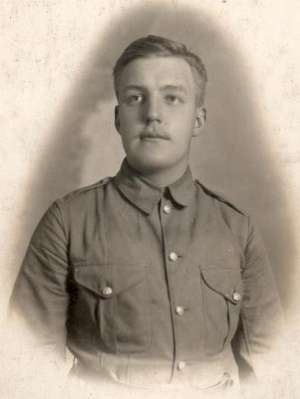
Arthur Cedric Horsfall.
Photograph from the collection of Kathryn Horsfall, with permission.
Arthur Cedric Horsfall was born in Springhead on 8th December 1893, the fourth of five sons (all of whom came to Hulme) of Aquilla Horsfall, a mill manager. After attending Springhead Council School, he came to Oldham Hulme Grammar School in 1906, leaving in 1910 to become a clerk in a cotton mill.
He enlisted during the first days of the war as a private with the 10th Battalion of the Manchester Regiment; it is possible that he was already a member of this territorial unit and that he served in Egypt in early 1915. From May 1915 he served in Gallipoli and was promoted to corporal on 27th July 1915.
On 9th August 1915 he was sent back to England to serve at home and was discharged from the army on 2nd July 1917 as he was no longer physically fit for war service due to illness.
He died on 18th December 1960 at the age of 67.
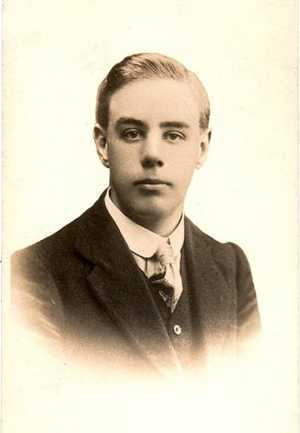
Bernard Horsfall.
Photograph from the collection of Kathryn Horsfall, with permission.
Bernard Horsfall was born in Springhead on 29th April 1896, the youngest son of Aquilla Horsfall, a mill manager. After attending Springhead Council School he came to Oldham Hulme Grammar School in October 1908 and remained until December 1912.
Nine months later, on 30th September 1913, at the age of 17 and apparently unaccompanied, he sailed on the Allan Line Steamship Company's ship 'Mongolian' from Liverpool to Halifax in Canada. He arrived on 12th October 1913 and took the Dominion Atlantic Railway to Kentville on the Bay of Fundy in Nova Scotia, a fruit farming area. He gave his previous occupation as student, and intended to take up farming.
He enlisted as a private in the 40th Battalion of the Canadian Machine Gun Corps on 31st May 1915 and returned to England before being sent to the front lines in France.
Almost two years later on 9th April 1917 he was hit by shrapnel and killed at Vimy Ridge. He was 20 years of age.
He is commemorated at Ecoivres Cemetery and at Springhead.
Herbert Horsfall was born in Springhead on 11th December 1885, the second of five sons of Aquilla Horsfall, a mill manager. After attending Zion School he came to Oldham Hulme Grammar School in September 1897 for four years. In 1911 he was working as a carder in a cotton mill.
An article in the Oldham Chronicle shows that he joined the Worcestershire Regiment as a private and served in France from early in the war. It mentions that when he was seriously gassed on 17th October he had seen a great deal of active service. After recovering at hospital in Brighton he returned to France to act as an interrogator of German prisoners-of-war as he was fluent in the language. The article mentions that locally he was known as a naturalist.
In 1939 he was chief clerk at a cotton mill in Leigh, Lancashire. He died there on 9th October 1956 at the age of 70.
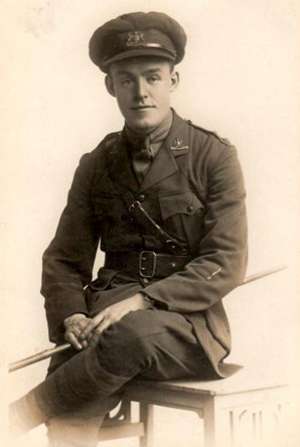
Maurice Horsfall.
Photograph from the collection of Kathryn Horsfall, with permission.
Maurice Horsfall was born in Springhead on 1st January 1889, the third of five sons of Aquilla Horsfall, a mill manager. After attending Zion School, he came to Oldham Hulme Grammar School in January 1901. He left school in 1906 to become a clerk in a shipping office.
Although he enlisted as a private with the Manchester Regiment he was granted a commission on 10th September 1915. He served in Egypt from January 1916 and later in France. He was promoted to lieutenant on 1st July 1917.
In 1939 he was a clerk with the Ministry of Labour, living in Lees. He died in 1973 at the age of 84.
Charley Houlgrave was born in Oldham on 9th September 1899, the son of Arthur Houlgrave, a gas meter index maker. After attending Westwood Council School he received a scholarship from Oldham Education to Oldham Hulme Grammar School in September 1912. He left school in July 1915 and became assistant secretary at the Argyll Mill in Failsworth in March 1916.
He enlisted on 18th September 1917, a week after his 18th birthday as an air mechanic 3rd class with the Royal Flying Corps. He was discharged on 23 February 1918 having been appointed to a temporary commission as 2nd lieutenant on the general list. He trained as a pilot and was sent to France on 14 August 1918. He was declared missing on 9th October 1918 having been taken as a prisoner-of-war in Germany.
He was released and admitted to the 14th General Hospital in Wimereau on 29th December 1918 and, the following day, transferred to the Prince of Wales Hospital. He was later treated at the 2nd Western General Hospital in Manchester before being transferred on 13th July 1919 to Grangethorpe Hospital, a large house in South Manchester owned by the Red Cross during the war and used for orthopaedic patients. He relinquished his commission due to ill health on 2nd December 1919. It is not known if he suffered a permanent injury.
In 1939 he was a hotel keeper in the Lake District. He died in Blackpool in 1979 aged 79.

The French Croix de Guerre,
awarded to French and allied soldiers who
distinguished themselves by acts of heroism.
John Cyril Howard (known as Cyril) was born in Oldham on 31st January 1885, the son of Martin Howard, a medical practitioner from Ireland. After a private education he came to Oldham Hulme Grammar School in September 1896 for a little over two years before leaving to board at Stonyhurst College, Blackburn, where he remained until after 1911.
Information taken from The Stonyhurst College Magazine of 1915 shows that Howard enlisted with the Royal Army Medical Corps as a private. He proceeded to France on 17th May 1915 as an interpreter with the 9th Cavalry Field Ambulance 1st Division. He was granted a commission to the special reserve of officers from Officer Cadet Units on 18th December 1915 and posted to the Royal Garrison Artillery as 2nd lieutenant. In July 1918 he was awarded the French Croix de Guerre while serving as acting captain.
The Stonyhurst College Magazine also notes that Howard wrote an article in 1915 from the front which was published in the Daily Mail; a facsimile of this article appears below.
His medal card shows that he was at the Red Cross Hospital for Officers at Brighton in July 1920 and in February 1922 was living in Southend-on-Sea. However, we have been unable to trace his whereabouts after this time.
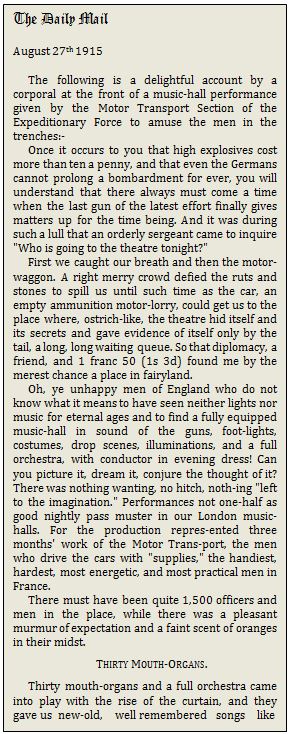
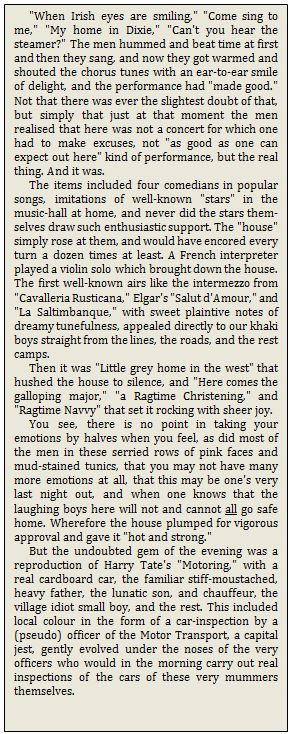
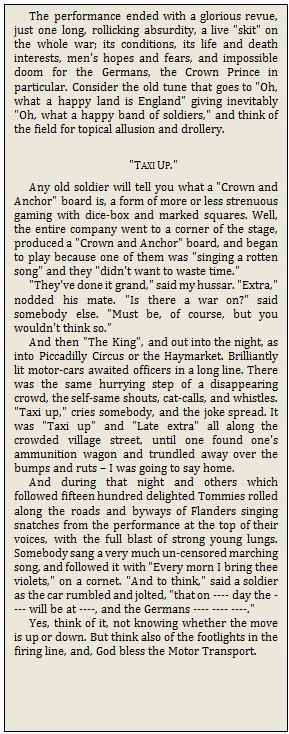
Martin Ernest Howard was born in Oldham on 2nd October 1886, the son of Martin Howard, a medical practitioner from Ireland. After a private education he came to Oldham Hulme Grammar School in September 1896 for a little over two years before leaving to board at Stonyhurst College, Blackburn. In 1911 he was an assistant schoolmaster (preparatory school).
The Stonyhurst College Magazine notes that he enlisted in the PSU Corps when the war broke out but, after some months of military training, he left the army on passing with distinction the examination for the Colonial Civil Service. He was Assistant Commissioner in Southern Nigeria stationed at Calabar during the war years.
In 1939 he was the district officer for Administrative Service Nigeria, living in the UK. He died in the Colchester area in 1949 at the age of 63.
Percy Howarth was born in Oldham on 23rd October 1893, the son of James Howarth, a general manager and secretary to an engineering company. After attending Waterloo Council School he came to Oldham Hulme Grammar School in January 1907 for five terms. In 1911 he was working as an assistant engineering draughtsman and, in 1916, as a motor cycle mechanic.
He enlisted with the Royal Flying Corps as an air mechanic 2nd class on 22nd February 1916 and was promoted to air mechanic 1st class on 24 April 1917. He appears to have been assigned to the School of Aeronautics until 26th February 1919. It is not known if he served overseas.
In 1939 he was a garage proprietor in Sale, Cheshire.
Arnold Sydney Howcroft was born in Oldham on 1st July 1893, the son of Samuel Howcroft, a teacher. After attending Waterloo Council School he came to Oldham Hulme Grammar School in September 1906 for three years. In 1911 he was working as a pupil teacher.
He attended Manchester University where he joined the Officer Training Corps of the 19th Battalion of the Manchester Regiment. He was granted a commission and served in France and Belgium in 1917 until he was wounded. From 23rd April 1918 to 13th July 1919 he was employed under the Ministry of Labour, during which time he was promoted to lieutenant. When he relinquished his commission he was appointed to the Army Educational Corps where he was promoted to captain in 1931 and major in 1941. He appears to have worked overseas, travelling to Singapore in 1921, Bombay in 1924 and Sri Lanka in 1932.
He died in the Fylde area in 1975 at the age of 81.
Bertram Hoyle was born in Oldham on 16th May 1888, the son of Henry Hoyle, a solicitor's clerk. After being educated privately he came to Oldham Hulme Grammar School from January 1899 until July 1904. From 1906 he studied at Manchester University, graduating MSc Technical. In 1911 he was an electrical engineer but appears to have become an assistant lecturer before 1915.
Although no other records survive, his medal card shows that he served in France as a corporal with the Royal Engineers from 3rd September 1915. He was granted a commission on 19th September 1915 as lieutenant with the Royal Naval Voluntary Reserve and posted to the shore-based HMS Excellent Experimental Department.
It is believed that he worked in Southern Rhodesia at one time. In 1939 he was a retired electrical engineer living in Bournemouth. He died in 1965 in Portsmouth at the age of 77.
Harold Bernard Hudson was born in Oldham on 17th March 1898, the son of Albert Hudson, a professor of music. After attending Higginshaw Council School he was awarded a Foundation Scholarship to Oldham Hulme Grammar School in 1910. He remained at school until 1912.
When he attested on 18th May 1916 at Oldham as a private with the Grenadier Guards he gave his civilian occupation as clerk. He was placed on reserve until 26th October 1916 when he was posted to the Caterham Depot before embarking to France on 9th April 1917 with the 4th Battalion of the Grenadier Guards. He joined the 7th Battalion in the field on 30th April 1917, continuing to serve in France until March 1919 with two weeks' leave in England in February 1918, a week in Paris in September 1918 and two weeks in England in January 1919. He was demobilised in March 1920.
In 1939 he was working as a cotton yarn salesman in Royton. He died at Birch Hill Hospital, Wardle, on 4th February 1966 at the age of 67.

The French Croix de Guerre,
awarded to French and allied soldiers who
distinguished themselves by acts of heroism.
Irvine Hughes was born in Ashton-under Lyne on 27th August 1891, the son of Owen Hughes, manager of the Chamber Colliery Company. After attending Hindley Grammar School he came to Oldham Hulme Grammar School in January 1905 for two years. In 1911 he was a mining student living in Hollinwood and was later employed by his father's company.
He attested as a private with the Royal Scots Regiment in January 1915, serving in France until he was wounded at the Somme in July 1916. After recovering he trained for a commission which was granted in March 1917. He was attached as 2nd lieutenant to the Loyal North Lancashire Regiment, serving with them in Palestine until May 1918 and then in France. He was awarded the French Croix de Guerre in July 1918 for gallant conduct during the attack on Hill 205 and the ridge north of Bergneux: 'He repeatedly rallied large parties of straggles who had become leaderless and led them forward again through heavy fire.'
He died in Oldham in 1936 at the age of 44.
Joseph Hughes was born in Stoke Newington, London, on 28th November 1891, the son of Joseph Richard Hughes. After attending Werneth Council School he came to Oldham Hulme Grammar School in 1904 for three years. He worked as a bank clerk before moving as a clerk to Ferranti Brothers Ltd in Hollinwood.
He joined the 4th Battalion of the Liverpool Regiment as a private and was later transferred to the Loyal North Lancashire Regiment. He served in France from 6th April 1915. On 25th November 1918 he joined the Royal Air Force as a Flight Cadet. He was posted to the 19th Training Squadron in El Rimal, Egypt, on 28th December and transferred to the 16th Training Squadron at Abu Sueir, Egypt, on 6th March 1919. He returned to the UK in June 1919 and was granted an honorary commission as 2nd lieutenant on demobilisation on 4th May 1920.
In 1939 he was a company secretary living in Bromley, Kent.
Frank Hynes was born in Oldham on 18th December 1898, the son of Joseph Hynes, a mill manager. After attending Blackshaw Lane Board School he received a Lancashire County Council Scholarship to attend Oldham Hulme Grammar School in September 1911. He remained in school until Easter 1915.
On 9th March 1917 he enlisted with the Royal Flying Corps as an air mechanic 2nd class and was re-classified as a fitter on 1st January 1919. He served at the Central Flying School. He was discharged as no longer physically fit for war service due to 'heart trouble' on 29th April 1921.
In 1939 he was a retired cotton mill carder living in Halsall, Lancashire. He died in Blackpool in 1958.
Alan Ingham was born in Oldham on 19th August 1896, the son of Alfred Ingham, a stock and share broker. He attended Waterloo Secondary School before coming to Oldham Hulme Grammar School in 1908 for four years. His occupation after leaving school in 1912 is not known.
He enlisted with the Public Schools Battalion of the Royal Fusiliers in August 1914 and was deployed to France on 12th November 1915. In March 1916 he was wounded and invalided home. After recovering he joined the Officer Training Corps and was granted a commission in December 1916 as 2nd lieutenant with either the 22nd or 24th Battalion of the Manchester Regiment.
He was then sent back to France where he took part in a major battle on 14th March 1917. He was last seen badly wounded on the battlefield. He died in action on 14th March 1917 at the age of 20. He is commemorated at the Gommecourt Wood New Cemetery at Foncquevillers.
Harold Ingham was born in Heywood on 14th December 1890, the son of George Ingham, a rope and twine maker. After a private education he came to Oldham Hulme Grammar School in January 1901. When he left school at Easter 1905 he joined his father's business as a commercial traveller and salesman.
He enlisted as an air mechanic 2nd class with the Royal Flying Corps on 29th December 1915 and was promoted firstly to air mechanic 1st class on 1st July 1916 and then to corporal on 1st February 1917. On 1st August 1918 he was promoted to sergeant. He served with the Northern Aircraft Repair Depot and was discharged from the Royal Air Force on 30th April 1920.
After the war he continued working in the family business. He died in Oldham in 1976 aged 85.
Edward Bruce Jackson was born in Oldham on 29th August 1895, the son of Joseph C Jackson, an iron master. After attending Middleton National School he came to Oldham Hulme Grammar School in January 1907 for a year and a half. He was not living with his parents in 1911 and cannot be found on the census.
The London Gazette reports that he was granted a commission on 15th April 1917 as temporary 2nd lieutenant with the Labour Corps. However, no further records exist and no medal card has been identified.
In 1939 he was a poultry farmer living in Shropshire. He died at Shrewsbury on 19th December 1957 at the age of 62.
Samuel Arnold Jackson was born in Oldham on 23rd August 1888, the son of Mrs Eliza Ann Jackson and her late husband. After attending Waterloo Board School he came to Oldham Hulme Grammar School from January 1902 for three years. He became a bank clerk after leaving school.
He attested at the beginning of the war on 1st September 1914 as a private with the 1st City Battalion of the Manchester Regiment and was posted to France on 9th November 1915. He was wounded by a gunshot to the right knee on 1st July 1916 and on 9th September 1916 was admitted to hospital in Blackpool with a bullet wound to the thigh. He remained there until the end of the year.
He was promoted to lance corporal on 2nd April 1917 and posted as a cadet to the Officer Cadet Battalion, Household Brigade on 5th July of that year. He was granted a commission as lieutenant in the Special Reserve of Officers and posted to the 4th Battalion of the Manchester Regiment on 30th October 1917.
After the war he returned to banking, working for the District Bank in Windermere in 1923. He retired to Lancaster where he died in 1953 at the age of 64.
Stanley Jackson was born in Oldham on 3rd August 1890, the son of Mark Jackson, a greengrocer. He attended Derker Board School before coming to Oldham Hulme Grammar School for one year in 1901. It is not known where further secondary education took place but in 1913 he became a student of chemistry at Manchester University.
He enlisted as a private with the Public Schools Battalion of the Royal Fusiliers and was deployed to France on 14th November 1915.
He was wounded at the Somme in July 1916. Once recovered he joined the Officer Training Corps and was commissioned as 2nd lieutenant with the 12th Battalion of the Manchester Regiment on 26th April 1917.
He returned to the front lines in France and Flanders where he was killed in action on 10th November 1917 at the age of 27. He is commemorated at Tyne Cot in Belgium, the memorial to the missing of Flanders.
In September 1918 a new chapel at St James' Church, Oldham, was opened in his memory. The chapel and windows were gifts of his parents and sister.
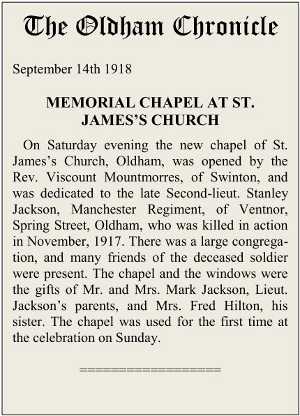
Vernon Jackson was born in Oldham on 20th June 1890, the son of James Turner Jackson, a solicitor. After attending Waterloo Council School he came to Oldham Hulme Grammar School in September 1904 for three years. He worked, after leaving school, as a clerk in a cotton spinning mill, where he was promoted to assistant secretary before 1915.
He attested on 7th December 1915 as a private with the Artist's Rifles, the 28th Battalion of the London Regiment. He was placed on reserve until May 1917 when he was transferred to the Royal Army Service Corps, Motor Transport Division as a lorry driver. He served in France from 12th August 1917 and was once reprimanded for driving at excessive speed. He was demobilised on 1st December 1919.
In 1939 he was working as a printer's clerk in Chadderton. He died in Oldham in 1976 at the age of 86.
Walter Raymond Jackson was born in Hollinwood on 15th August 1898, the son of Abraham Jackson, an accountant. After attending Hollinwood Council School he came to Oldham Hulme Grammar School in 1911 for two and a half years.
He enlisted as a private with the Royal Army Service Corps on 14th August 1916. He appears to have served overseas and was discharged due to sickness on 17th February 1919.
His occupation either before or after the war is not known. He died in the Nantwich area of Cheshire on 15th February 1938 at the age of 39.
Arnold Simkin Jennings was born in Jarrow, County Durham, on 10th February 1893, the son of T S Jennings, postmaster. Prior to coming to Oldham Hulme Grammar School in 1902 he had attended Kilmarnock Academy. He left Hulme in 1907 to board at Bootham School, York, where he was known as a steady half-back, a good speaker and essayist, and a great botanist. He later became a member of the Surveyors' Institute and was employed in the Land Valuation Department.
He enlisted as a private with the Royal Army Medical Corps in June 1915 and in November of that year, after being promoted to corporal, was sent to the 28th General Hospital in Salonika.
After three years there he contracted pneumonia and died on 21st December 1918 at the age of 25. He is commemorated at the Mikra British Cemetery in Kalamaria, Greece.
His commanding officer wrote: "I have been his commanding officer for ten months, and have nothing but praise for him in every way. I always found him most hard-working and reliable. I am afraid his keen sense of duty may have been contributory to his death. He was a great favourite with everyone in the unit."
Joseph Arthur Eddy Jones was born in Manchester on 5th January 1900, the son of the Reverend Joseph William Jones of St Luke's, Chadderton. After attending Ducie Avenue School in Manchester, he came to Oldham Hulme Grammar School in the summer of 1909 and was still in school for the first three years of the war.
Less than a month after his eighteenth birthday and only six months after leaving school, he enlisted as a private with the 3rd Battalion of the South Lancashire Regiment. He was sent with his battalion to train at Rhyl in North Wales, but was transferred to the Officer Cadet Battalion at nearby Kinmel Park. In August 1918 he transferred to the Inns of Court Officer Training Corps.
Before his training was completed, the war was over. He was transferred to the army reserve on 21st May 1919.
After the war he attended Manchester University, graduating BA in 1922. He followed his father into the church and was vicar at Welwick St Mary in East Yorkshire in 1938. He died on 26th June 1955 aged 55.
Percy Colin Jones was born in Oldham on 2nd June 1891. From sometime before 1901 he lived with his uncle Robert Quinn. He attended Werneth Board School before coming to Oldham Hulme Grammar School in 1903 for four years. In 1911 he was listed as an elementary school teacher.
While we have been unable to prove that the following details refer to the same Percy Jones, we are fairly confident that we have the correct person. After attending the University of Manchester Day Training College he became a student teacher at the Fielden Demonstration Schools. These schools, described as "one of the few genuinely creative developments in teacher training" were established with the help of the University of Manchester. Student teachers at the schools worked to a carefully devised programme, while research was undertaken based on controlled experiments, and pupils experienced an innovative curriculum. After three years as a student teacher he secured a position as mathematics and science master at Arnold House School in Blackpool. When he returned to teaching after the war he worked at various schools in the Manchester area before becoming headmaster at Johnson Street Evening School in Manchester.
During the war he enlisted as a bombardier with the Royal Garrison Artillery. He transferred to the Officer Cadet Unit and was granted a commission on 18th August 1917. He served overseas, but further details are not available.
He died on 25th December 1960 aged 69.

The Military Cross,
awarded to officers for gallantry during
active operations against the enemy.
Charles Hall Kelsall was born in Oldham on 25th August 1896, the son of William Henry Kelsall, a commercial clerk. After a private education he came to Oldham Hulme Grammar School from April 1907 until July 1912. His occupation on leaving school is not known.
He attested as a private with the 10th Battalion of the Manchester Regiment but was granted a commission with the Lancashire Fusiliers on 22nd August 1915. He joined his battalion in Gallipoli on 3rd October 1915. He was awarded the Military Cross for bravery at the beginning of 1918 and, later that year, was promoted to captain. No further records are available.
His occupation after the war is not known. He died on 20th October 1937 at Blackpool at the age of 41.
Frank Kempsey was born in Fernilee, Derbyshire, on 1st April 1891, the son of George Kempsey, a mill secretary. After attending Werneth Academy he came to Oldham Hulme Grammar School for four years from April 1903. In 1913 he graduated from Cambridge University, BA 2nd class, Natural Science Tripos.
He was granted a commission on 13th January 1916 with the Royal Garrison Artillery Special Reserve of Officers. After promotion to lieutenant on 13th July 1917 he was deployed to France on 10th February 1918. No further details are available.
In 1939 he was a textiles manager. He died on 15th April 1962 aged 71.
Harold Kempsey was born in Chadderton on 18th January 1890, the son of Ernest Kempsey, a master cotton spinner. He attended Cowhill Board School before coming to Oldham Hulme Grammar School for six years from January 1902. After leaving school he studied medicine at Victoria University, Manchester, graduating MB ChB in 1913.
He was granted a commission with the Royal Army Medical Corps early in the war and served in Malta. On 5th November 1915 he resigned his commission due to ill health. He may later have served as lieutenant or captain with the 24th Battalion of the Manchester Regiment.
In 1939 he was a medical practitioner living in Llandudno. He died on 31st May 1961 at the age of 71.
John Kenyon was born in Oldham on 25th May 1883, the son of Walter Kenyon, a skip-maker. After attending St Thomas' School, Werneth, he came to Oldham Hulme Grammar School on the day it first opened in May 1895. He left school in July 1899 to work as a clerk in a cotton mill becoming, by 1911, a secretary to a cotton spinning company.
He was called up for service on 29th September 1916 and posted as a private to the Manchester Regiment. He was transferred to the Army Pay Corps on 3rd October 1916 and, a year later, promoted to corporal. He was demobilised on 19th March 1919.
In 1921 he emigrated with his wife and family to New Zealand. He died in the Hawkes Bay area in 1949 at the age of 67.
Arthur Kershaw was born in Crompton on 15th February 1889, the son of William Travis Kershaw, a secretary. He attended Launderbrook School in Royton before coming to Oldham Hulme Grammar School from January 1903 for two years. After leaving school he became a yarn salesman and by 1911 was assistant secretary to a cotton mill.
He attested in Ashton-under-Lyne as a private with the 2/7th Battalion of the Manchester Regiment and served in France from 25th June 1916. At some point he was transferred to the Labour Corps. He was granted special leave from 7th to 30th September 1918 after the death of his father.
In 1939 he was working as a cotton yarn salesman in Royton. He died in Oldham on 27th September 1957 at the age of 68.
James Hervey Kershaw was born in Dobcross on 18th November 1897, the son of Arthur Kershaw, a bank cashier. He attended Dobcross National School before coming to Oldham Hulme Grammar School for four years from September 1909.
He may have initially enlisted with the West Riding Regiment but was granted a commission with the Loyal North Lancashire Regiment. He was later promoted to lieutenant and served in Europe from 7th March 1917.
In 1939 he was an insurance broker living in Cheshire. He died in 1988 aged 90.
Joseph Franklin Kershaw was born in Oldham on 2nd May 1884, the son of Joseph Kershaw, an ironmonger. After attending Waterloo Board School he came to Oldham Hulme Grammar School for three years from April 1896.
He became an artist and by 1911 was living with his wife in London, although either before or during the war they moved to the Lake District.
He enlisted as a private with the Border Regiment and was later transferred to the 126th Company of the Machine Gun Corps.
He was killed in action in Belgium on 14th October 1917 at the age of 33. He is commemorated at Coxyde Military Cemetery in Belgium.
Gallery Oldham holds some of his paintings, one of which was recently on display.
Harry Wainwright Knott was born in Saddleworth on 11th June 1886, the son of Ashton Wainwright Knott, a clerk. He attended Waterloo Board School before coming to Oldham Hulme Grammar School in September 1901 for four terms. After leaving school he worked as a bank clerk.
He was granted a commission as 2nd lieutenant with the 21st Battalion of the Machine Gun Corps on 26th September 1917 and served in France shortly thereafter. He was recorded as missing in the field on 27th May 1918. He had been taken prisoner of war and was initially transferred to a transit camp at Rastatt, just over the border from the Strasbourg area. He was then transported to the Stralsund Prisoner of War Camp situated on the Baltic island of Danholm, some 70 kilometres east of Rostock. Here, in late 1918, the prisoners produced a 30-page camp magazine to help maintain their spirits but unfortunately most of the articles and drawings are uncredited so we do not know if Knott was involved in this.
He was repatriated to the UK on 17th December 1918 and was exonerated from having contributed to his capture. He returned to his work as a bank clerk, becoming branch manager in Altrincham before 1939. He died in the Bucklow area of Cheshire in 1971 at the age of 85.
William Arthur Percival Knott was born in Royton on 23rd December 1884, the son of William Arthur Knott, a schoolmaster. He attended Royton Wesleyan School before coming to Oldham Hulme Grammar School for one year from September 1897. He became a schoolmaster.
He enlisted as a private with the Army Service Corps on 30th November 1915 and was placed on reserve until 1st March 1916 when he was mobilised and sent as a driver to the Woolwich depot. He married shortly after this. It would appear that he served at Woolwich until 3rd January 1918 when he was sent to France. Six weeks later he was transferred to the supply branch as a clerk (his eyesight appears to have been a problem) and remained there until 8th September 1918.
In 1939 he was a schoolmaster living in Royton. He died on 19th December 1958 at the age of 73.
James Lawless was born in Oldham on 27th December 1897, the son of Patrick Lawless, a licensed victualler. After attending St Patrick's Roman Catholic School he came to Oldham Hulme Grammar School in April 1910 for three years. In 1915 he was working as a fitter.
He enlisted as an air mechanic 2nd class with the Royal Flying Corps on 18th July 1916. From 5th May 1917 he worked at an aircraft depot in northern France and was promoted to air mechanic 1st class on 1st January 1918.
In 1939 he was a company director for a cotton yarn doubler in Failsworth. He died in the Leigh area in 1970 aged 72.

The Military Cross,
awarded to officers for gallantry during
active operations against the enemy.
Cuthbert Lawton was born in Lees on 13th December 1887, the son of Henry Lawton, the manager of a textile machine works. He received a private education before coming to Oldham Hulme Grammar School in January 1899 for seven years. After leaving school he became a bank clerk.
He was granted a commission with the 7th Battalion of the West Riding Regiment on 19th January 1915. While serving in France as an acting captain he was awarded the Military Cross: "During the attack at Taultain on 1st and 2nd November 1918, by conspicuous gallantry and good leadership of his company he reached his final objective. By personal reconnaissance he maintained touch with the neighbouring unit and sent back reports to battalion headquarters."
In 1939 he was a bank manager in Hazel Grove and died in the area in 1964 at the age of 76.
John Hardy Lawton was born in Lees on 31st August 1893, the son of Henry Lawton, the manager of a textile machine works. After a private education he came to Oldham Hulme Grammar School in September 1903 for four years before continuing his education as a boarder at Ashville College in Harrogate. From 1912 he studied law at Manchester University where he joined the Officer Training Corps.
He was granted a commission in 1914 with the 7th Battalion of the West Riding Regiment serving as 2nd lieutenant and later acting captain in France and Belgium. He was promoted to captain in June 1918.
After the war he worked as a solicitor in Wilmslow. He died in Manchester on 4th April 1966 at the age of 72.
Robert Wild Leach was born in Oldham on 6th March 1885, the son of Dr Leach. After attending Werneth Collegiate School he came to Oldham Hulme Grammar School from January 1896 to summer 1900. He studied law at Cambridge University.
Whilst at Cambridge he became a university candidate for the army and was granted a commission with the Suffolk Regiment on 15th August 1908. He joined the 1st Battalion of regular soldiers and, in 1911, he had been promoted to lieutenant and was serving with them in Alexandria.
At the start of the war he was serving in Khartoum. The battalion returned to England on 23rd October 1914 and shortly before they embarked for France in January 1915 he was promoted to captain. By April 1915 they were fighting at Ypres.
He was wounded in September 1915 and shortly after this in November the battalion was reassigned to Salonika where they remained until the end of the war.
He remained a career soldier and was promoted to major on 4th October 1927. Although he had retired on 6th March 1935 he was re-employed in the army for the first three years of WW2. He died on 11th February 1950 at the age of 64.
Adam Edward Lee was born in Oldham on 17th June 1896, the son of A E H Lee, a coal merchant. After a private education he came to Oldham Hulme Grammar School in January 1906 for one year. The family then moved to St Annes where he continued his education being still in school in 1911.
Although no records survive of his service in WW1 we know that he was granted a commission with the 10th Battalion of the Manchester Regiment on 9th March 1914. He served overseas with them from 15th May 1915. He also served as a captain with the Indian Army but no further details of this are available.
It is not known if he had previously had a connection to India or if he worked there after the war. He cannot be found on the 1939 register. He died in Bangor, North Wales, in 1966 aged 69.

The Military Cross,
awarded to officers for gallantry during
active operations against the enemy.
Charles Henry Lee was born in Oldham on 5th December 1885, the son of Henry Charles Lee, a master printer. He was educated privately before coming to Oldham Hulme Grammar School in September 1898. He left at the end of 1900 to take up an apprenticeship (probably with his father) and by 1911 he was a master printer and had taken over the business from his father. He was active in the Hulme Old-Boys' Association and a member of the Council.
He enlisted on 21st November 1914 with the 24th (Oldham) Battalion of the Manchester Regiment and was discharged two weeks later to take up a commission. In the early years of the war he was promoted to lieutenant, and then to captain. He served in France from November 1915 and possibly in Italy also. He was promoted to the rank of major before the end of the war.
He was mentioned in despatches in 1916 for "gallant and skilful leadership at Bazentin-le-Petit on 14th July 1916" and was awarded the Military Cross in 1918: "He rendered exceptionally good and gallant service during the period February to September 1917 and previously. He always set a high example of coolness and disregard of danger, and thus exercised the best influence on the troops under his command when carrying on work under the most difficult circumstances."
He died at St Annes on 26th February 1920 of cerebral haemorrhage caused by previous war-time injury. He was 34 years of age and married. He was buried in St Annes Churchyard.
John Leech was born in Oldham on 22nd November 1890, the son of George Henry Leech, a flock manufacturer and cotton waste dealer. He was educated privately before coming to Oldham Hulme Grammar School in January 1900 for two years. In 1911 he was a clerk to a cotton waste dealer (probably the family firm). He married Clara Ashton, an old-girl of the school, in 1914 and had children in 1916 and 1917.
He enlisted on 10th December 1915 as a gunner with the Royal Garrison Artillery. As a married man with children he was placed on reserve until 29th January 1917 when he was mobilised to the Inner Defences at Portsmouth. On 30th April 1917 he was posted to reinforce the siege depot at Bexhill.
He was posted to France on 16th May 1917 but became ill within weeks of arriving. He was admitted to the London General Hospital, Chelsea, on 28th June 1917 suffering from myalgia. After almost two months there he was released but then admitted to South Camp, Ripon, suffering from trench fever (caused by contact with infected lice through broken skin). He eventually recovered and returned to the front line in France.
He was killed in action on 20th April 1918 at the age of 27. He is commemorated at Couin New British Cemetery.
Austin Ogden Lees was born in Lindley, West Yorkshire, on 21st January 1883, the son of Joseph Ogden Lees, a cotton mill manager. He attended Hey School before coming to Oldham Hulme Grammar School in September 1895 for three years. After leaving school he worked as a clerk in a cotton mill becoming assistant secretary by 1911 and secretary by 1915.
Prior to the war he had served as a territorial with the 7th Battalion of the West Riding Regiment. He attested as a private with the King's Shropshire Light Infantry on 30th November 1915 and was placed on reserve until 3rd November 1916 when he was transferred to the Army Pay Corps. He was promoted to lance corporal on 14th September 1917 and to corporal on 8th November 1917. As a married man with children he served in the UK, and was discharged on 31st March 1920.
In 1939 he was a cotton spinning secretary and yarn salesman in Lees. He died in 1960 in Ashton-under-Lyne at the age of 78.
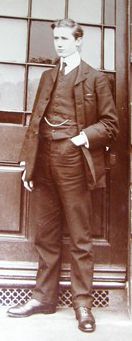
Christopher John Lees.
Photograph from the Maund Family Tree,
Ancestry.co.uk
Christopher John Lees was born in Oldham on 26th June 1883, the son of George Lees, a banker. He attended Werneth Collegiate School before coming to Oldham Hulme Grammar School on the day it opened in May 1895. He remained at school until 1898.
He took up an apprenticeship with Electrical and General Engineers of Oldham and attended evening classes to obtain a Bachelor of Engineering degree. He was also in receipt of a Whitworth Exhibition Scholarship.
He spent two years with the National Gas Engine Company, followed by eight months in the gas engine department of another company and six months with a power plant company. He then went into partnership, working on the design and construction of high speed gas engines.
He applied in 1909 for membership of the Institution of Mechanical Engineers (from which the above information is taken). Between 1909 and 1915 he appears to have travelled and worked overseas, in Canada and the USA, and probably in Australia.
He enlisted in 1915 with the Royal Garrison Artillery and applied to the Inns of Court Officer Training Corps. He was granted a commission on 29th October 1915 and held in the special reserve of officers. He was promoted at some point to lieutenant and then to captain.
He served in France from 1st July 1916. On 3rd May 1918 he was wounded in action by a gunshot to the chin and returned to England. He was treated at the Harold Gillies plastic surgery hospital at Sidcup, Kent, which had been set up the previous year by a surgeon pioneering the use of skin flaps to repair such wounds.
After the war he returned to Australia and in 1923 was the electrical engineer for the New South Wales Government Railways and Tramways in Sydney. He died in New South Wales in 1949.
George Arthur Lees was born in Dobcross on 10th March 1897, the son of J E Lees, a stationer. While at school his mother was his guardian and in 1911 he was living with his grandmother. He attended Dobcross National School before coming to Oldham Hulme Grammar School in 1909 for three years.
He enlisted, probably soon after his 18th birthday, as a private with the Duke of Lancaster's Own Yeomanry and was later transferred to the Royal Engineers. He served in France from 28th October 1915. There is no further information.
In 1939 he was working in engineering in Stockport. He died in 1975 aged 78.
George Thomas Lees was born in Royton on 4th November 1895, the son of John George Lees, a spinning mule overlooker. After attending Stanley Road School he was awarded a Hulme Scholarship to attend Oldham Hulme Grammar School from September 1908. He remained in school until the summer of 1914 when he proceeded to St John's College, Cambridge University to read mathematics.
When called up in March 1916 he refused as a conscientious objector and was brought before a tribunal in Oldham where he stated that as a member of the No-Conscription Fellowship he objected to assisting any nation in the prosecution of war. He also mentioned that his studies at Cambridge University would suffer if he was not allowed to continue his work there. The tribunal decided he must go on non-combatant service.
His appeal to the South East Lancashire Appeal Tribunal on 30th March 1916 was dismissed. On 27th April he was brought before Oldham Magistrates Court having been arrested for not reporting for military duty. He was fined forty shillings and handed over to military authority. At a court-martial he was sentenced to two years imprisonment with hard labour (commuted subsequently to 112 days' hard labour) which he served at Wormwood Scrubs.
The following year, on 2nd July 1917 he was again arrested as an absentee under the Military Service Act having been called up for a second time. He was court-martialled and again received a two year sentence which was commuted when he accepted work of national importance. He was sent to the Knutsford Work Centre.
In 1939 he was a bank officer in Buxton. He died in Stockport in 1967 at the age of 71.
Hamlet Lees was born in Oldham on 24th June 1881, the son of Hamlet Lees, a cotton mill cashier. After attending Waterloo Higher Grade School he came to Oldham Hulme Grammar School when it opened in May 1895 and remained for two years. He then became a student at a cotton mill and later a cotton salesman.
Despite being married with children, he attested on 9th December 1915 as a private with the 4th Battalion of the Manchester Regiment. He was posted in the UK on 7th June 1916 and promoted to lance corporal on 9th February 1918. He was then transferred to the 25th Battalion of the Liverpool Regiment and served with them in France from 7th May 1918. He was admitted to hospital in the field on 23rd June 1918 with a fever of unknown origin.
In 1939 he was working as a cotton salesman in Oldham where he died in 1941 at the age of 60.
Thomas Percival Lees was born in Chadderton on 24th January 1896, the son of Walter Lees, an engineer. He attended Hollinwood Council School before coming to Oldham Hulme Grammar School in 1909 for two years. He became a mechanic, probably in the family firm.
He enlisted as a private with the Royal Fusiliers on 20th November 1914 but was temporarily released on 24th August 1915 to work at Park Foundry and Engineering Works at Hollinwood. He remained there, manufacturing munitions, until 14th April 1918.
Two weeks later he was transferred to the Grenadier Guards 5th Reserve Battalion and, later that year, promoted to lance corporal. On 29th October 1918 he was deployed to France. He returned after an accident in which he fell over some banking on 18th February 1919. He was treated at the 7th Canadian Hospital at Etaples in France before being sent to Eden Bridge, Carlisle.
In 1939 he was an engineering works manager in Oldham. He died in 1965 aged 69.
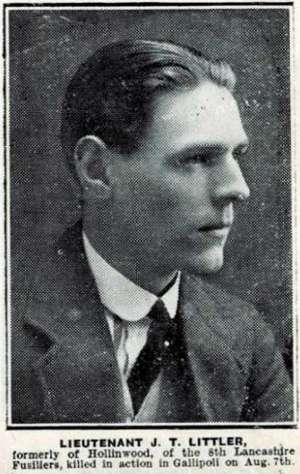
Photograph from the "Oldham Chronicle,
4th War Supplement", 25th September 1915.
James Tatlock Littler was born in Hollinwood on 9th November 1890, the son of James Potter Littler. He was educated privately before coming to Oldham Hulme Grammar School in 1899. After leaving school in 1906 he went into the cotton spinning industry, and later became secretary to the Monton Mills Company Ltd, Cotton Spinners of Eccles.
He was known as a keen sportsman, an ardent motorist and a freemason belonging to the Callander Lodge.
Prior to the war he was a 2nd lieutenant with the Lancashire Fusiliers Territorial Force. He was promoted to lieutenant on 29th August 1914 and volunteered immediately for service overseas. He initially went to Egypt with his regiment on 3rd September 1914, and then to the Dardanelles in May 1915.
He was killed in action on 7th August 1915 at Krithia Nullah and was buried where he fell. He was 24 years of age. He is commemorated at the Helles Memorial in Turkey.
Cloudesley Mallalieu was born in Saddleworth on 14th October 1887, the son of Samuel Mallalieu, a woollen manufacturer. After attending Delph Wesleyan School he came to Oldham Hulme Grammar School in January 1898 leaving in July 1904. He went into the family business.
Prior to the war he had been a member of the territorial 7th Battalion of the West Riding Regiment, and was granted a commission as 2nd lieutenant on 1st January 1909 with promotion to lieutenant on 16th June 1910. He resigned his commission on 25 March 1911 but re-joined in 1915 as a temporary lieutenant. He was promoted to captain prior to serving in France from 6th January 1916. He was wounded in the foot in July 1916 and was treated at a hospital in Rouen.
After the war he returned to the woollen manufacturing business. He died in Oldham in 1978 at the age of 91.
Vernon Mallalieu was born in Saddleworth on 27th February 1886, the son of Samuel Mallalieu, a woollen manufacturer. After attending Delph Wesleyan School he came to Oldham Hulme Grammar School in January 1898, leaving four and a half years later to continue his education at Manchester College of Technology. He then served an apprenticeship as an electrical engineer with Messrs Siemens Brothers Dynamo Company in Stafford, continuing to work for the company both in the UK and in Germany. In 1915 he left to join the textile staff of the Metropolitan-Vickers Company.
During the war he became secretary of the Lancashire Anti-Submarine Committee which advised the admiralty. He was awarded an MBE for his services in January 1921. He also volunteered as an orderly at Bramhall and Cheadle Hulme Red Cross Home from 1916 to 1919.
After the war he returned to work for Metropolitan-Vickers, becoming a respected textile electrical engineer. He was instrumental in setting up the abstracts section of The Journal of the Textile Institute Proceedings (published by Taylor and Francis), and gave lectures to their members.
He died at Nelson in Lancashire on 23rd October 1923 at the age of 37. Having recently entered the service of the English Electric Company, he had visited Duckworth's Mill in Nelson at his own request and while examining an electric motor he had stepped onto a sheet of asbestos which was covering the girders. He fell through, suffering a concussion from which he died. A verdict of accidental death was recorded at the inquest.
Harold Marcroft was born in Oldham on 27th March 1889, the son of John G Marcroft, manager of a cotton mill. After attending Waterloo Board School he came to Oldham Hulme Grammar School in September 1900 for almost 4 years. By 1911 he was a cotton yarn agent.
He served during the war as a warrant officer class 2 sergeant major with the Motor Transport Division of the Army Service Corps. There is no further information.
In 1939 he had retired from work as a manager in the gas industry. He died on 16th March 1952 at the age of 62.
Francis Ernest Marland was born in Oldham on 6th September 1893, the son of Ernest Clegg Marland, a solicitor. He attended Waterloo Council School before coming to Oldham Hulme Grammar School in September 1905 for three years. After leaving school he became an apprentice to a haberdasher.
He served in France during the war as a private with the Army Cyclist Corps and later with the Royal Scots Fusiliers.
In 1939 he was working as a sub-postmaster and newsagent in Leeds. He died there in 1963 at the age of 70.
Harold Marland was born in Hollinwood on 13th October 1892, the son of Robert Marland, a colliery proprietor who had been born in Australia. His father had died by the time he came to Oldham Hulme Grammar School in January 1905 for one year. He had previously been educated at Pembroke House School at Lytham. In 1911 he was working as a cotton mill clerk.
He enlisted as a private with the Royal Fusiliers Public Schools Battalion, probably in early 1915. He was deployed to France on 14th November 1915 and, when his battalion disbanded in April 1916, he was transferred to a general service battalion with the same regiment.
In 1939 he was a retired secretary living in Blackpool. He died on 7th May 1944 aged 51.
Robert William Marland was born in Hollinwood on 23rd October 1888, the son of Robert Marland, a colliery proprietor who had been born in Australia. After attending Freehold Board School he came to Oldham Hulme Grammar School for two years from January 1899. In 1911 he was working as a yarn agent.
He enlisted as a private with the Mechanical Transport Division of the Royal Army Service Corps, probably after 1916. He appears to have served only after 1919 in Kurdistan, an area of minor operations at that time.
He died on 20th October 1955 aged 66.
George Edward Joseph Marriott became a member of staff of Oldham Hulme Grammar School in September 1910. He was born in Lancaster on 21st May 1888 and had been educated at Lancaster Grammar School before going to St Peter's College, Cambridge, from which he graduated in 1910, BA Classical Tripos.
Prior to the war he had been a member of the territorial 6th Battalion of the Lancashire Fusiliers. He had been granted a commission on 6th August 1914 and was deployed soon after, arriving on 25th September in Egypt where the battalion was involved in defending the canals. At some point he was invalided home suffering from heat stroke but insisted on returning.
In May 1915 they moved to Gallipoli where he was promoted to lieutenant on 7th August 1915, and then to captain on 1st September 1916. The battalion moved to France in February 1917. He was killed whilst on active service on 6th July 1917 at the age of 29.
He is commemorated at the Ruyaulcourt Military Cemetery in the Pas de Calais area, and on the memorial at St Thomas' Church, Werneth.
Excerpt from The Oldham Hulmeian, December 1914: In school, as elsewhere, the War has dominated our thoughts. Mr Marriott received a commission early in August as lieutenant in the 6th Lancashire Fusiliers, and is now in Egypt. The good wishes of masters and boys are with him.
Excerpt from The Oldham Hulmeian, September 1917: We regret to hear of the death in France of Mr Marriott, for many years a master at this school, who hastened to join the Army at the beginning of the war. Mr Marriott was invalided home from Egypt after several attacks of sunstroke, but at his own urgent request was allowed to re-join although his health was far from satisfactory.
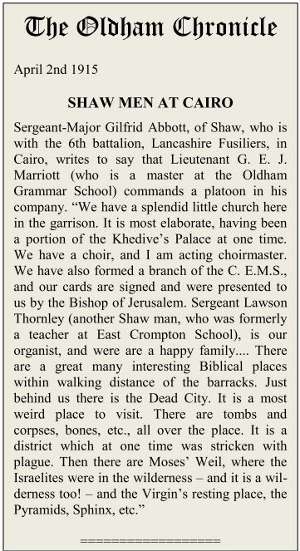
Oscar Anseling Marshall was born in Mossley on 27th August 1893, the son of John Marshall, an oil refiner and merchant. After attending Woodhouse Grove School in Apperley Bridge he came to Oldham Hulme Grammar School in September 1908 for two years. In 1911 he was apprenticed to a chemist.
During the war he served as a private in the Royal Army Medical Corps in Gallipoli from 29th July 1915 until 24th June 1916 when he was discharged. His RAMC records have not survived, only his medal card.
After the war he worked as a tram driver and lived in Dukinfield before emigrating with his wife to the USA. They arrived in New York in June 1920 and settled later that year in Pawtucket, Providence, Rhode Island where he became a car inspector for the New York, New Haven and Hartford Railroad in Providence. He petitioned for naturalisation on 18th May 1927. He died there on 27th February 1960 at the age of 66.
Edward Norman Platt Martland was born in Oldham on 12th July 1894, the son of Dr Edward William Martland, a physician and surgeon. After being educated at home he came to Oldham Hulme Grammar School in September 1903 for four years. He then studied at Epsom College in Surrey, a boarding school with a long-standing association with the medical profession. He left school in 1911 to study medicine at Manchester University. Both of his sisters served in hospitals in France during the war, one as a surgeon, the other as a nursing sister.
During his time at Manchester he joined the University Officer Training Corps and, after qualifying as a doctor, was granted a commission with the Royal Army Medical Corps. He served as a lieutenant and temporary captain in France and Belgium from 29th October 1917. He was taken prisoner in March 1918 and held at prisoner-of-war camps in Parchim and Friedrichsfeld in Northern Germany until he was repatriated in December 1918.
After the war he remained in the army, serving from 1919 to 1920 in Iraq where he had command of a river hospital ship. After his marriage in 1923 he departed with his wife to serve as surgeon in military hospitals at Ishmailia and Alexandria in Egypt. He retired from the Royal Army Medical Corps in 1926 with the rank of major to go into general practice in Norfolk. During the second world war he returned to the RAMC with the rank of lieutenant-colonel and was given command of the 163rd Field Ambulance, part of the East Anglian Division. He was promoted to colonel in 1941 and appointed officer in command of the military hospital in Gibraltar in 1942.
He died in Norfolk on 25th April 1952 at the age of 57.
William Lionel Martland was born in Oldham on 13th March 1899, the son of Dr Edward William Martland, a physician and surgeon. He came to Oldham Hulme Grammar School in January 1908 for five terms. He then studied at Epsom College in Surrey, a boarding school with a long-standing association with the medical profession, from 1909 to 1916.
While studying medicine at Manchester University he joined the Officer Training Corps despite being under age. He served as a cadet and was posted to Gailes Camp, an army hospital in Ayrshire. He was granted a commission with the Royal Welch Fusiliers on 17th December 1917 but appears to have served only in the UK.
After completing his medical training he served for a period as a surgeon on the merchant marine ship Sarpedon in 1923. He married in 1925 and went into general practice in Woking, Surrey. In 1939 he was living (possibly temporarily) in Sutton Coldfield. During WW2 he moved to a practice at Barnard Castle in County Durham, remaining there until his early retirement in about 1947. He died at Barnard Castle on 16th May 1949 at the age of 50.
James Matley was born in Oldham on 9th June 1882, the son of Samuel Matley, a brewer and publican. After attending Union Street Baptist School he came to Oldham Hulme Grammar School in January 1896 but apparently 'ran away' after two terms. By 1901 he was an architectural student and described himself as an architect on his marriage register entries in 1906 and 1909 (his first wife died after the birth of their son). In 1911 he was running the Pitt and Nelson Hotel on Old Street in Ashton-under-Lyne.
At some point he travelled to South Africa. He attested as a medical orderly with the South African Medical Corps at Johannesburg on 9th February 1917 giving his occupation as miner and stating that he was a widower. He was immediately sent to England and from 2nd May 1917 served in France. He returned to England on 30th October 1917 and was discharged no longer fit for duty on 8th January 1918.
He appears to have returned to Africa on 12 August 1918, giving his destination as British East Africa and his occupation as Civil Servant. No further trace of him has been found.
Allan Maw was born in Oldham on 1st April 1889, the son of Walter Maw, a solicitor. After being educated privately he came to Oldham Hulme Grammar School in April 1900 for six years. In 1911 he was a solicitor's articled clerk.
A report in the Manchester Evening News states that he was granted a commission to serve as 2nd lieutenant with the East Lancashire Territorial Force in October 1914 and promoted to captain in the 10th Battalion of the Manchester Regiment in March 1915. However, no medal card has been found and he is not listed among the officers of the 10th Manchester serving overseas in 1914 or 1916. As both he and his brother shared the same initial and both served as officers with the 10th Battalion of the Manchester Regiment it can be difficult to determine which one is being referred to when only a surname and initial is mentioned. A later report in the Manchester Evening News mentions that Captain Allan Maw was wounded on 9th September 1916 so he did serve overseas.
He died in Southport on 27th September 1935 at the age of 46.
Arthur Rogers Maw was born in Oldham on 2nd December 1890, the son of Walter Maw, a solicitor. After being educated privately he came to Oldham Hulme Grammar School in April 1900 for seven years. He studied architecture at Manchester University before becoming an architect's pupil with Taylor and Simister of Oldham in 1911.
The information concerning his military service is contradictory, and no service record has survived. According to all sources, he was a captain in the 10th Battalion of the Manchester Regiment at the time of his death. His medal card confirms that he was a captain in the Manchester Regiment (no battalion specified) and that he was entitled to a 1914-15 star (which shows that he served overseas during those years). However, it gives his place of first overseas service as France.
The 1/10th Manchesters served in Egypt and Gallipoli before their first venture into France in March 1917. The 2/10th Manchesters were not sent overseas until February 1917 when they too went to France. Therefore, the location of his service in 1914-15 is uncertain.
He is mentioned only on the list of the fallen in the book about the 10th Battalion of the Manchester Regiment, Amateur Soldiers by K W Mitchinson. Indeed, this singular mention appears ambiguous and uncertain of the facts, implying that he served in Gallipoli and was invalided home. However, his name is not included in the list of officers in 1914 or 1916, or on the list of those wounded in Gallipoli.
He was killed in action in France on 21st March 1918 at the age of 27 and is commemorated at Pozieres Memorial.

The French Croix de Guerre,
awarded to French and allied soldiers who
distinguished themselves by acts of heroism.
John Travis Mayall was born in Royton on 13th May 1882, the son of Robert Mayall, an oil traveller. He attended Blackshaw Lane Board School before coming to Oldham Hulme Grammar School in September 1896 for two years. After leaving school he became a clerk and cashier.
At the time he attested as a private with the Royal Garrison Artillery in December 1915 he was married and living in Redcar. He was posted as a gunner to France on 5th October 1916. He was appointed acting bombardier on 28th April 1917 and lance bombardier on 12th July 1918. He was awarded the French Croix de Guerre in July 1918.
In 1939 he was working as an insurance agent in Redcar. He died there on 1st June 1944 at the age of 62.
Robert Alexander McGeoch was born in Fulwood near Preston on 10th February 1900, the son of Robert Alexander McGeoch, a Post Office inspector. After attending Jerusalem School, Failsworth, he came to Oldham Hulme Grammar School for one term in 1912. He then moved with his family to Lancaster.
On 9th April 1918, shortly after his 18th birthday and while still a student, he joined the 5th Battalion of the King's Liverpool Regiment but was attached to the number 2 Cavalry Cadet School until 20th January 1919 when he was discharged. He then re-enlisted for a year with the Royal Army Service Corps, serving with the supply company at Aldershot. He was discharged at Woolwich on 12th November 1920.
In 1939 he was a police inspector working in Leigh. He died in Liverpool in 1970 aged 70.
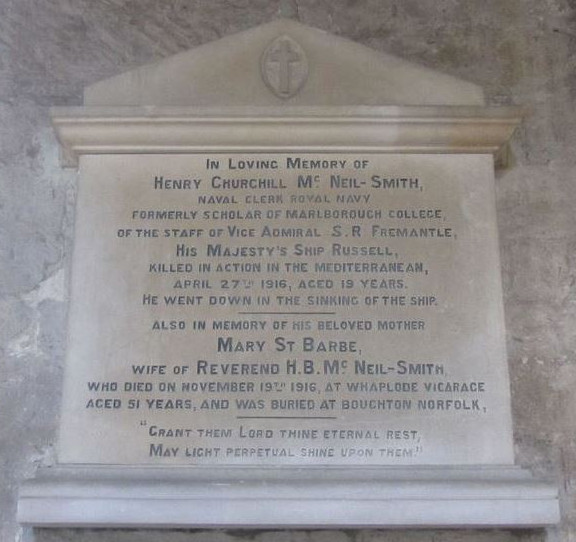
Memorial at St Mary's Church, Whaplode, Lincolnshire.
Henry Churchill McNeil-Smith was born in Taunton, Somerset, on 19th May 1896. He was the son of Henry Basil McNeil-Smith, a Canadian-born Church of England Minister, and Mary St Barbe Churchill. The family frequently moved around the country and found themselves in Hollinwood, Oldham, in 1904 when McNeil-Smith, at the age of 7, attended Oldham Hulme Grammar School for a year. In 1907 he was at the Grange Preparatory School in Stevenage, Hertfordshire, where he became head boy. He won a foundation scholarship to Marlborough College and remained there until 1913 when, at the age of 17, he joined the Royal Navy as Assistant Clerk in the Paymaster's Department on HMS King Edward VII. His brother Edward made a career in the Royal Navy from 1916 to 1949.
McNeil-Smith was attached to the Admiral's Secretary on HMS Russell when, on 27th April 1916, off the coast of Malta, it hit a mine. Although some of the crew survived, McNeil-Smith was not among them. He was 19 years of age. He is commemorated on the Chatham Naval Memorial and at St Mary's Church, Whaplode, Lincolnshire.
Gerald Clay Megson was born in Oldham on 5th January 1900, the son of H Megson, a leather merchant. After a private education he came to Oldham Hulme Grammar School in September 1912 for three years. His occupation after leaving school is not known.
He was granted a commission as 2nd lieutenant with the East Kent Regiment on 30th December 1918 (after the end of the war).
In 1939 he was the managing director of a leather belting manufacturing company in Oldham. He died in Oldham in 1982 at the age of 82.
John Bernard Meldrum was born in Oldham on 27th June 1885, the son of John Wesley Meldrum, an engineer. After attending Waterloo Higher Grade School he came to Oldham Hulme Grammar School when it first opened in May 1895, remaining until Easter 1897. He later joined his father's firm as a mechanical draughtsman and engineer.
He attested as a private with the Royal Garrison Artillery in the summer of 1916 but shortly thereafter was seconded to Cammell & Laird at Birkenhead where he remained until December 1918.
After the war he continued to work for his father's company and travelled to Trinidad in 1925 and Tangier in 1934. In 1939 he was engineer and managing director of their works in Knutsford, Cheshire. As a keen hiker and climber he joined the Alpine Club in 1922 and was made an honorary life member on his 100th birthday. He married for the first time at the age of 90, and died at Bournemouth in 1992 aged 107.
Allan Starkie Mellor was born in Oldham on 25th May 1888, the son of John James Mellor, a book-keeper. After attending Werneth Board School he came to Oldham Hulme Grammar School in April 1901, remaining until July 1903. In 1911 he was a sketch artist for a newspaper.
He served from March 1916 as a private with the Loyal North Lancashire Regiment. Although no further records remain, his medal card shows that he served overseas.
In 1939 he was working as a cartoonist and living in Macclesfield. He died in the Stockport area in 1951 at the age of 63.
Edward Eric Mellor was born in Royton on 14th December 1892, the ninth of eleven sons of John Francis Mellor, a solicitor. Eight of the sons attended Oldham Hulme Grammar School. Edward Eric and his brother John Gerald were killed while in service within a month of each other in 1916, George Herbert died (cause unknown but not war related) in 1916, and Arthur Seville died in the influenza pandemic in 1918. Another brother Robert Oswald founded Mellor and Jackson Solicitors in 1920.
Edward Eric was educated privately before coming to Oldham Hulme Grammar School in April 1904 for 7 years. He was a member of the Hulme Old-Boys' Association Council. At the time of his death he was under articles with his brother Robert Oswald, a solicitor.
He enlisted in September 1914 as a private with the 20th Battalion (Public Schools) of the Royal Fusiliers and was deployed to France on 15th November 1915.
He was killed in action at the Somme on 20th July 1916 at the age of 23. He is commemorated at Thiepval, the memorial to the missing of the Somme, and on Royton War Memorial.
John Gerald Mellor was born in Royton on 24th September 1889, the seventh of eleven sons of John Francis Mellor, a solicitor (see previous entry above for further information). He was educated privately before coming to Oldham Hulme Grammar School in September 1900 for five years. In 1911 he was a student at the Diocesan Training College in Exeter, after which he taught at St Paul's School, Royton.
He enlisted as a private with the 4th Battalion of the Devonshire Regiment and was deployed to Mesopotamia on 12th August 1915. He was later promoted to lance corporal and appears to have been attached to the Royal West Kent Regiment.
He died in Baghdad on 26th June 1916 at the age of 26 whilst a prisoner of war. The cause of death is not known. He is commemorated at Baghdad (North Gate) Cemetery and on Royton War Memorial.
John Holt Mellor was born in Oldham on 29th June 1898, the son of Thomas Mellor, a confectioner. After a private education he came to Oldham Hulme Grammar School in September 1910 for three years. He worked as a clerk after leaving school.
He attested with the Royal Flying Corps for four years from 21st February 1917 and worked as an air mechanic at Farnborough. He served in France after the war from 8th June 1919 to 9th August 1919. Although he was placed on reserve in March 1920 he was again called to service at RAF Flowerdown in 1921. He appears to have served two 4-year terms with the RAF, finally being discharged on 20th February 1925.
He died in the Aberconwy area of Wales in 1979 at the age of 81.
John Wrigley Mellor was born in Oldham on 15th May 1898, the son of J Mellor, a coal merchant. After attending Waterloo Secondary School he came to Oldham Hulme Grammar School in January 1910 for two years. He became an apprentice to a chemist.
He attested on 17th May 1916 with the Royal Engineers and was mobilised and posted as a pioneer to a signals depot on 9th October 1916. He served overseas at a cable section from 20th August 1917 until 25th November 1918.
In 1939 he was working as a motor driver at Poulton-le-Fylde and died at Fleetwood in 1979 at the age of 81.
Richard Mellor was born in Hebden Bridge on 29th July 1897, the son of Cyril Mellor, a salesman. He attended the Municipal Secondary School before coming to Oldham Hulme Grammar School for two years from September 1910.
He enlisted as a private with the Royal Fusiliers and was granted a commission in November 1916 with the 2/5th Battalion of the Manchester Regiment. He served in France as 2nd lieutenant from February 1917.
He was killed in action in the Pas de Calais area on 16th June 1917 at the age of 19. He is commemorated at Cambrin Military Cemetery, and on Royton War Memorial.
William Alan Mellor was born in Royton on 13th October 1887, the son of John Francis Mellor, a solicitor. After a private education he came to Oldham Hulme Grammar School in September 1900 for three years. In 1911 he was working as a clerk in a cotton mill.
He attested as a private with the Public Schools Battalion of the Royal Fusiliers and was granted a commission as 2nd lieutenant with the Manchester Regiment on 26th June 1917. He served overseas.
In 1939 he was a cotton yarn salesman living in Royton. He died in the Middleton area in 1957 at the age of 69.
James Taylor Middleton was born in Oldham on 21st July 1887, the son of James Middleton, a grocer. After attending Bourne Street British School he came to Oldham Hulme Grammar School in September 1896 for six years. By 1911 he was working as a solicitor in Oldham.
He attested as a private with the Royal Welsh Fusiliers but was granted a commission on 23rd January 1916 as lieutenant with the London Regiment. He served in France from 3rd December 1915.
He continued his work as a solicitor and in 1937 joined the governing board of Oldham Hulme Grammar School. He was chairman of the governors from 1955 until his death in 1957 at the age of 69.
John Middleton was born in Mirfield, West Yorkshire, on 17th May 1900, the son of William Victor Middleton, a card clothing manufacturer (a manufacturer of carding products for cloth production). After attending Wheelwright Grammar School he came to Oldham Hulme Grammar School in 1914 for six months.
When he joined the Royal Air Force on 10th May 1918 he was living in Cleckheaton. He was posted to the Cadet Distribution Depot and, after being declared fit for pilot training transferred to the Officer's Technical Training Wing. He attended a School of Aeronautics and an Armament School. However, by the time his training was complete the war was over. He was demobilised on 20th January 1919 and granted the honorary rank of 2nd lieutenant.
Records for his whereabouts in 1939 or his death have not been found.
Arthur William Midgley was born in Kirkburton, West Yorkshire, on 22nd February 1894, the son of John A Midgley, a book-keeper. After attending Delph Wesleyan School he came to Oldham Hulme Grammar School in September 1906 for seven years. He became a school teacher.
He attested on 28th December 1914 as a private with the 20th Battalion (Public Schools) of the Royal Fusiliers. He was posted to France on 14th November 1915 but returned to England eight months later after receiving a gunshot wound to the left thigh on 20th July 1916. After recovery he was placed in medical category C1, fit only for service at home and, as teachers were desperately needed by the Educational Arm for instruction of recruits, he was requested for employment in that capacity.
After the war he returned to teaching and in 1939 was at an Elementary School, living in Cheshire. He died in the Wirral area in 1967 at the age of 72.
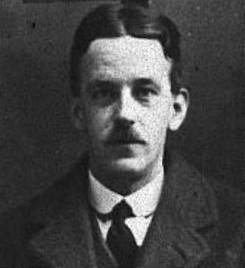
Photograph from Merchant Navy Records.
Victor Thomas Millington was born in Cefn-y-Bedd, Flintshire, on 13th January 1890, the son of William Wyatt Millington, a civil and mining engineer. He was educated at home prior to coming to Oldham Hulme Grammar School in September 1900. He left school after six years and became an engineer's draughtsman.
He joined the merchant navy either before or during the war and served aboard ship as a marine engineer 3rd class.
He married in London in 1919 and continued as a marine engineer.
He also served in WW2 as chief engineer in the merchant navy aboard the S.S. Empire Milner belonging to the British Tanker Company Ltd. As a result of serving on a ship which carried armaments to the Soviet Union, he was awarded an OBE for brave conduct when his ship encountered enemy ships, aircraft, submarines or mines, and a Medal for Valour by the Presidium of the Supreme Council of the Union of Soviet Socialist Republics for courageous services.
He died on 23rd October 1958 aged 68.
William Ernest Wyatt Millington was born in Cefn-y-Bedd, Flintshire, on 24th September 1882, the son of William Wyatt Millington, a civil and mining engineer. He attended Werneth Collegiate School before coming to Oldham Hulme Grammar School on the day it opened in May 1895. He remained at school until 1897.
The following year he took up an apprenticeship with Messrs Ferranti Ltd of Hollinwood, gaining their scholarship and a Whitworth Exhibition to attend Manchester Technical School. He also became a student of the Institution of Civil Engineers. After his apprenticeship he took a position as draughtsman with Messrs Williams and Robinson of Rugby, and took evening classes in Steam and Applied Mechanics at Rugby Technical School. In 1905 he joined the drawing office staff of the Engine and Pump Department of Messrs Mather and Platt Ltd, Manchester.
In 1908 he was elected an associate member of the Institution of Mechanical Engineers and in 1909 he joined Messrs Holden and Brooke Ltd, taking charge of the centrifugal pump department and all design and manufacture within the department.
In 1911 he married Susan Cordelia Lees; she had attended Oldham Hulme Grammar School from 1895 to 1902. They had six children between 1912 and 1922.
When the war started in 1914 he took charge, for the duration, of the whole of the works at Messrs Holden and Brooke Ltd, including two foundries, and was responsible for all design and manufacture.
After the war he became a consulting engineer and was elected a full member of the Institution of Mechanical Engineers in 1919.
He died on 6th July 1964 aged 81.
William Bradley Mills was born in Oldham on 28th March 1884. He received a private education before coming to Oldham Hulme Grammar School in January 1898 for a little over two years. After leaving school he worked as a railway clerk and, by 1911, was a clerk for a cotton spinning company.
He attested with the Royal Garrison Artillery on 13th June 1917 and on 25th October 1917 was posted as a gunner with the 18th Anti-Aircraft Company. He appears to have served in the UK.
In 1939 he was secretary of a cotton mill in Oldham and died there in 1959 at the age of 73.

The Military Cross,
awarded to officers for gallantry during
active operations against the enemy.
Hubert Vincent Mitchell was born in Crompton on 22nd December 1892, the son of Thomas Mitchell, an analytical chemist. He attended Shaw Wesleyan School before coming to Oldham Hulme Grammar School in September 1905 for two years. After leaving school he became a clerk in a cotton mill and by 1911 was assistant secretary.
He attested as a private with the 21st Battalion of the Royal Fusiliers and served with them in France from 2nd December 1915. On 5th August 1916 he was granted a commission with the East Kent Regiment and in 1918 awarded the Military Cross: "At Montauban, on 25th August 1918, for gallant resource during the advance, when his men were held up by a nest of hostile machine guns. Regardless of heavy fire, he crawled forward and located the post, which was then destroyed, thus enabling the advance to continue." He was later promoted to captain with the Royal West Kent Regiment.
He died in the Rochdale area in 1934 at the age of 41.
Hardman Mitton was born in Oldham on 14th May 1883, the son of William Thomas Mitton, a traveller. After attending Waterloo Higher Grade School he came to Oldham Hulme Grammar School when it first opened in May 1895. When he left school in December 1897 he trained as an architect's draughtsman. However, between 1911 and 1915 he changed career paths to become a cotton merchant.
He attested as a private with the Royal Fusiliers on 9th May 1915 and was placed on reserve until 4th March 1916. He was promoted to lance corporal, initially serving in the UK before joining his battalion in France on 29th August 1916, remaining there until 22nd March 1917 when he returned to the UK. It is not known if he was injured at this time. He served for a second time in France from 28th November 1917 until he was wounded by a gas shell on 19th March 1918, resulting in tachycardia. This was attributable to his service and he was judged to have 40% disability as a result. He was transferred to the London Regiment on 4th October 1918, serving in the UK until he was demobilised on 19th February 1919.
After the war he resumed his occupation as a cotton merchant and travelled to New York in 1930. He died in Salford in 1937 at the age of 54.
John Sydney Moore was born in Ambleside, Cumbria, on 29th October 1893, the son of Robert Henry Moore, a joiner. After attending Waterloo Council School he came to Oldham Hulme Grammar School in September 1906 for three years. He joined the Post Office when he left school and, in 1911, was a sorting clerk and telegraphist.
He attested with the Royal Engineers on 17th April 1915 and was examined at Aldershot where he was found to be a competent telegraphist. He was posted to the 42 Signal Company and served in France from May 1915. He received ten days leave in September 1917. He was admitted to hospital and then returned to England on 6th March 1918, but it is not known if he was ill or injured.
After the war he returned to his work with the Post Office and in 1939 was an executive officer working in Epsom, Surrey. He retired to Worthing, Sussex, where he died in 1984 at the age of 90.
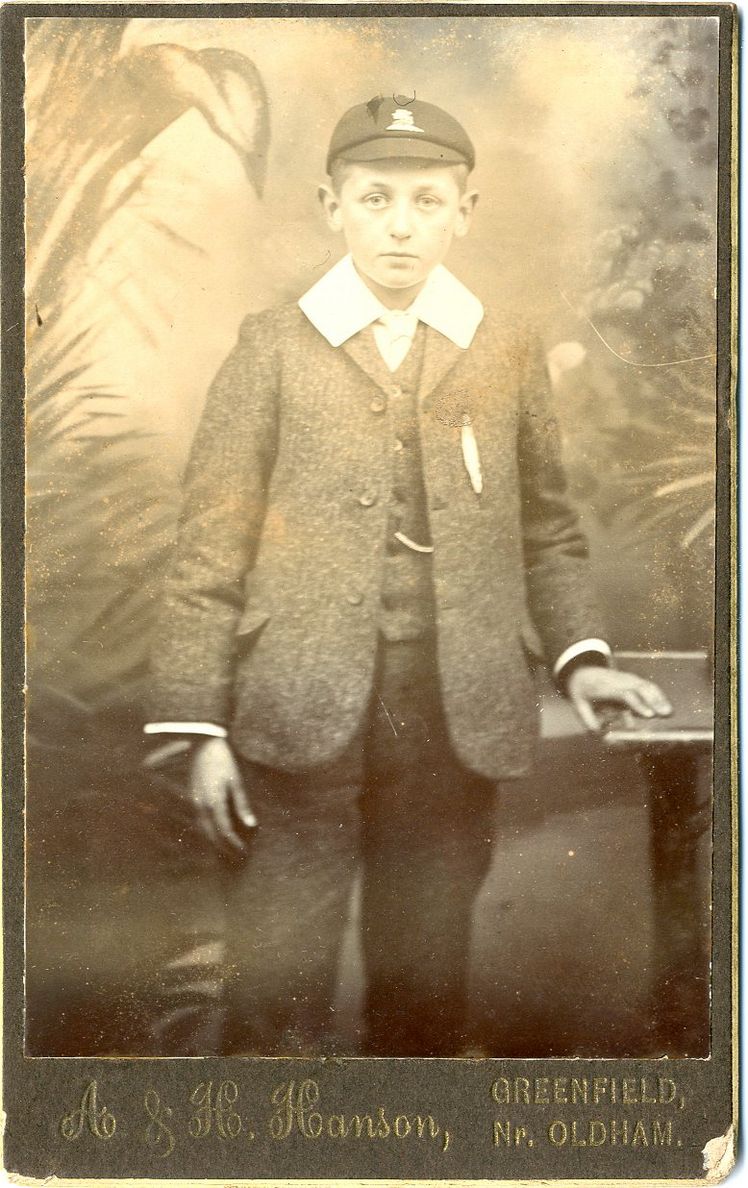
Stanley Moore in school uniform, circa 1904. Photograph donated to our archive by Brian Kenworthy.
Stanley Moore was born in Dobcross, Saddleworth, on 23rd August 1891, the son of Walter Moore, a textile loom tuner. He attended St Mary's School, Greenfield, before coming to Oldham Hulme Grammar School under a West Riding Scholarship in September 1904. After leaving school in July 1907 he worked for the Manchester and County Bank at 55 King Street, Oldham.
He enlisted as a private with the West Yorkshire Regiment in December 1915 and was promoted to Lance Corporal in July 1916. He was later transferred to the Lincolnshire Regiment. He served overseas where he received a gunshot wound to the left thigh.
After the war he married and returned to his work at the bank. He later moved to the Lancaster area where he died in 1972 at the age of 80.
George Cecil Mort was born in Stroud, Gloucestershire, on 13th July 1881, the son of the Reverend S Mort, a clergyman. After attending Kingswood School in Bath, he came to Oldham Hulme Grammar School in September 1897 for a year. In 1899 he entered Manchester University, qualifying MD in 1905 and receiving the Diploma in National Health (Liverpool) in 1909. In 1911 he was head surgeon at Liverpool East Dispensary.
He temporarily joined the Royal Navy in December 1914 as a lieutenant surgeon. He served at Haslar Hospital, a Royal Navy hospital in Gosport, before serving aboard HMS Cochrane, part of the 2nd Cruiser Squadron. From 15th January 1917 he served at the Royal Naval Cadet College at Dartmouth.
In 1939 he was H M Coroner for the City of Liverpool. He died there in 1957 at the age of 76.
Archie Steele Myatt was born in Longport, Staffordshire, the son of Benjamin Myatt, a station master. He attended Waterloo Board School before coming to Oldham Hulme Grammar School in September 1899 for three years. After leaving school he was employed by the Union Bank of Manchester in Oldham.
He attested on 10th December 1915 as a private with the 26th (Bankers) Battalion of the Royal Fusiliers and was placed on reserve. On 14th February 1917 he was transferred to the 15th Battalion of the London Regiment and later attached to the 17th King's Royal Rifle Corps. He served in France from 4th October 1917 until 31st December 1917. He was injured by a gunshot wound to the right hand on 20th September 1917 which caused a fracture. He was discharged from the army on 31st December 1917 as no longer fit for war service.
He died on 10th August 1939 at Chorley aged 51.

The Military Cross,
awarded to officers for gallantry during
active operations against the enemy.
Ernest Myatt was born in Prestbury, Cheshire, on 13th November 1892, the son of Benjamin Myatt, a station master. After attending Waterloo Council School he came to Oldham Hulme Grammar School in September 1905 for three years. In 1911 he was an apprentice engineering draughtsman.
He was granted a commission as 2nd lieutenant with the 4th Battalion of the King's Own Royal Lancaster Regiment in December 1914 and a year later appointed lieutenant. He served overseas and was awarded the Military Cross in 1917.
In January 1920 he emigrated as a qualified engineer to work in Buenos Aires, Argentina. He made occasional trips back to the UK and appears to have worked in Cuba for a while in the 1950s. He died in Buenos Aires on 15th September 1967 at the age of 74.
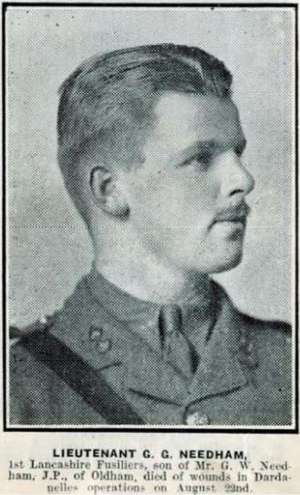
Photograph from the "Oldham Chronicle,
4th War Supplement", 25th September 1915.

The Military Cross,
awarded to officers for gallantry during
active operations against the enemy.
George Geoffrey Needham was born in Oldham on 8th July 1895, the son of George William Needham, an engineer. He was educated privately before coming to Oldham Hulme Grammar School for three years from January 1904. From 1907 to 1914 he attended Oundle School in Northamptonshire as a boarder.
In February 1914 he entered Sandhurst intending on a military career and quickly rose to the rank of cadet-sergeant. He was granted a commission in October 1914 to the Lancashire Fusiliers and proceeded in March 1915 with the 1st Battalion to the Dardanelles where he was involved in the "Lancashire Landing".
He was awarded the Military Cross for his actions on 28th April 1915 "during operations south of Krithia, for acting with great dash and gallantry during the attack on Krithia." He was also promoted to Lieutenant.
He was wounded when he was shot in the foot in May 1915 and was sent to Malta to convalesce. He then returned to his battalion where, after two months of hard fighting, he was injured and died from his wounds on 22nd August 1915. He was 20 years of age.
He is commemorated at the Hill 10 Cemetery in Turkey.
After the war, his brother Keith Needham, a pupil from 1900 to 1904, presented the school with the Needham Memorial Trophy in memory of his brother George and of his father Sir George W Needham, a governor of the school between 1902 and 1928. This elegant trophy is awarded annually to the winning house in the House Competition.



Keith Needham was born in Oldham on 27th May 1890, the son of G W Needham, a director at Platt's. After a private education he came to Oldham Hulme Grammar School in September 1900 for four years. In 1909 he entered Manchester University but further details are not known. In 1911 he was listed as an articled architect's clerk.
During the early days of the war he worked as a volunteer at Ashway Gap Red Cross Hospital in Greenfield. He had taken a prominent part in the inauguration of the first Red Cross Hospital in Oldham. While at university he joined the Officer Training Corps and when he was granted a commission on 11th May 1915 he was listed as a "Gentleman Cadet from the Royal Military College". He was posted as a lieutenant with the 6th Battalion of the Dragoon Guards and served overseas.
After the war his career appears to have taken a new route and he became a dairy farmer in Ellesmere, Shropshire. He died in the Oswestry area in 1975 at the age of 85.

The Military Cross,
awarded to officers for gallantry during
active operations against the enemy.
Alexander Theodore Newboult was born in Lucknow, India, on 3rd January 1896, the son of the Reverend A W Newboult, a Wesleyan Minister. When he came to Oldham Hulme Grammar School in September 1904 for three years, his previous school was listed as Schola Internazionale in Naples, Italy. It is known that he also attended Oakham School, Rutland, and Kingswood School, Bath at some point.
On the WW1 roll for Oxford University's Exeter College it is noted that he served in the ranks before being granted a commission. However, the only information available lists him on 25th April 1917 as Officer Cadet Leading Seaman, Royal Naval Division, to commission as 2nd lieutenant, 3rd Duke of Cornwall's Light Infantry. He served in Gallipoli, France and Belgium where, after 29 months with the field force, he sustained a gunshot wound to the left shoulder on 26th December 1917 and was treated at Brighton for 79 days. He was awarded the Military Cross: "For conspicuous gallantry in action. He was badly wounded early in an attack, but continued to command his company, and remained with them, sending back excellent reports of the situation until the line was firmly established, when he was carried back on a stretcher. He showed a splendid example of determination and endurance, which greatly inspired his men."
He joined the colonial civil service in Malaya after the war and progressed through the ranks. During WW2 he was captured at the fall of Singapore and taken a prisoner of war. In 1946, when he was awarded the Order of Companion of St Michael and St George, he was the Deputy Chief Civil Affairs Staff Officer in Malaya. He was awarded a Knighthood in 1948 when he was the Chief Secretary of the Colonial Administrative Service of the Federation of Malaya.
On 12th July 1948 as the officer administering the Federal Government of Singapore (His Excellency Sir Alexander Theodore Newboult, Knight Commander of the Most Excellent Order of the British Empire, Companion of the Most Distinguished Order of Saint Michael and Saint George, upon whom has been conferred the Decoration of the Military Cross, holder of the Efficiency Decoration) he was responsible for declaring that a state of emergency now existed due to members of the Malayan Communist Party sabotaging British-owned interests.
He retired to Bodmin, Cornwall, and died there on 5th January 1964 at the age of 68.
Harold Oliver Newboult was born in Lucknow, India, the son of the Reverend A W Newboult, a Wesleyan Minister. After being educated at home he came to Oldham Hulme Grammar School in April 1906 for a year and a half. He continued his education at Kingswood School, Bath.
He postponed his university entry to join the army and, according to his biography, served initially in the ranks. On 26th February 1917 he was granted a commission as lieutenant with the Royal Garrison Artillery and served with them in Italy, Mesopotamia, Egypt and Salonika.
After the war he took up a mathematical scholarship at Balliol College, Oxford University and remained there as a teacher. In 1925 he was elected a fellow and tutor of Merton College.
He died on 11th August 1949 at Oxford at the age of 52.
Frank Leslie Newton was born in Oldham on 26th August 1889, the son of Frank Newton, a cotton spinner and mill owner. After a private education he came to Oldham Hulme Grammar School in January 1899 for five and a half years. He studied medicine at Manchester University from 1907, qualifying MB ChB.
During the war he served with the Royal Army Medical Corps, initially in France from 22nd April 1917 as a lieutenant attached to the Welsh Border Mounted Brigade Field Ambulance, and later as a captain.
After the war he resumed his medical career, living in Malvern. He died in the Cirencester area in 1971 at the age of 82.
Geoffrey Robson Newton was born in Oldham on 3rd August 1884, the son of Frank Newton, a cotton spinner and mill owner. After a private education he came to Oldham Hulme Grammar School in September 1896 for three years. He continued his education at Rossall School, a boarding school in Fleetwood. After leaving school he worked for the family company as a cotton spinner and mill owner.
Newton had been a member of the Manchester Regiment's Territorial Army since 1903. He was granted a commission in April 1906 and on 1st April 1908 was promoted to captain and appointed to the 10th Battalion. He served from the beginning of the war, leaving the UK for Egypt in September 1914 as the captain in charge of D Company until he was injured on 26th June 1915 by a gunshot wound. He was treated at Queen Alexandra's Military Hospital at Millbank, London, where he remained for 149 days.
He then joined the Royal Flying Corps but was not fit for home duty until June 1917 when he was appointed in an administrative role as adjutant with the 30th Training Wing. He served during 1918 at the Western Group Headquarters and the Midland Area Headquarters before his appointment as major with the British Expeditionary Force in France in February 1919. He returned home on 24th February 1920.
He remained a member of the Territorial Army until he retired with the rank of colonel. In May 1940 he was appointed Deputy Lord Lieutenant of Anglesey. He lived at Menai Bridge during his retirement but died in the Wirral area in 1966 at the age of 81.

The Military Cross,
awarded to officers for gallantry during
active operations against the enemy.
Kenneth Newton was born in Oldham on 2nd March 1885, the son of J E Newton, a mill owner. After attending a private school in Lytham he came to Oldham Hulme Grammar School in January 1897 for three years. He continued his education at Rossall School in Fleetwood. In 1911 he was working as an electrical engineer.
On 22nd February 1915 he was granted a commission with the Royal Garrison Artillery and served overseas. In September 1918, while he was serving as captain, he was awarded the Military Cross: "For conspicuous gallantry and devotion to duty. When heavy casualties were stopping fire, in utter contempt of fear, he went in to the barrage and himself worked a gun. He set an example of supreme devotion to duty and indifference to danger which inspired his men to continuous fire for many hours, during part of which he bandaged the wounded with a promptness and skill that saved many lives."
It would appear that he moved to Wimbledon immediately after the war and, in 1939 (and possibly since the war), was employed as a Professor of Engineering at the War Office in London. He died there in 1968 at the age of 83.
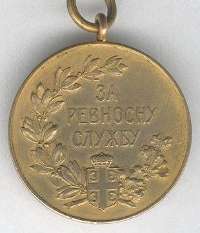
Serbian Gold Medal,
awarded by King Peter of Serbia
for zealous services in war.
Harry Noble was born in Saddleworth on 13th November 1892, the son of Joseph Noble, a draughtsman of Dobcross. He attended Saddleworth Parochial School before coming to Oldham Hulme Grammar School in September 1905 for three years. He worked as an engineer's iron turner until at least 1911, but at some point after that and prior to 1914 he became a wireless operator on the ocean liner Mauritania, sailing between Liverpool and New York.
He joined the Royal Naval Reserve on 12th August 1914 as a warrant telegraphist, serving initially on the squadron supply ship Palma. At some point, probably in late 1914, he was sent to Belgrade, Serbia, to work on the installation of wireless stations in the capital which had been retaken (temporarily) by the Serbian Army from the Austro Hungarian Army on 15th December 1914.
His work there, which lasted until 4th February 1915, earned him the award of the Serbian Gold Medal, presented by King Peter of Serbia for zealous services in war. He was also made an honorary lieutenant in the Serbian Army.
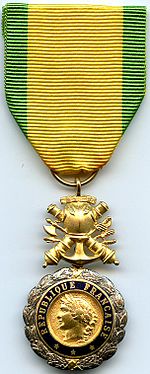
Médaille Militaire,
awarded by the French President for acts
of bravery in action against an enemy.
From 24th August 1915 he served on the Europa, a flagship at the port of Mudros on the Greek Island of Lemnos, and from 16th May 1917 he served on the Pelorus which was at anchor at Suda Bay in Crete.
From 21st December 1917 he served at the Signal School in Portsmouth. However, it would appear that he also served in French waters as he was awarded the Médaille Militaire by the President of the French Republic for distinguished services rendered in 1918.
He returned to Saddleworth to marry Alice Hermione Whitehead in 1919. They had two children who were both born in Portsmouth.
He joined the civilian staff of the Royal Navy at Portsmouth, remaining there until his death in 1955.
He started as an engineer grade 1 at the Experimental Division of the Torpedo and Mining Depot Signal School, becoming a technical officer on 1st August 1924. By 1937 he was senior technical officer and in 1945 was appointed chief technical officer.
During WW2 he served with the Royal Navy Volunteer Reserve as an acting sub-lieutenant, serving in 1941 on the Wolfe, a depot ship at Portsmouth, in 1942 on the troopship Invicta, and in 1945 on the Olna, a tanker supplying oil to Royal Navy vessels in the Japanese war.
Returning to civilian life, in 1948 he was appointed as senior principal scientific officer for the Department of Operational Research, Royal Naval Scientific Service. He was awarded the OBE in 1954.
He died on 17th May 1955 at the age of 62.
James Hall Noble was born in Saddleworth on 12th November 1894, the son of Joseph Noble, a draughtsman. After attending Saddleworth Parochial School he came to Oldham Hulme Grammar School in September 1905 for six years. He became an accountant after leaving school.
During the war he served with the Royal Naval Reserve in the Paymaster's Department, firstly as temporary assistant paymaster and then as paymaster sub-lieutenant on the base ship HMS Thalia.
In 1939 he was working as an accountant living in Warwickshire. He died in Macclesfield on 21st April 1962 at the age of 67.
John Wood Noble was born in Saddleworth on 4th October 1899, the son of Joseph Noble, a draughtsman. After attending Saddleworth Parochial School he came to Oldham Hulme Grammar School in 1911 and remained until 1917. The following year he started a dentistry degree at Manchester University.
While at university he joined the Inns of Court Officer Training Corps as a cadet and was commissioned on 10th October 1918, shortly after his 19th birthday as 2nd lieutenant with the Royal Field Artillery. There is no evidence that he served overseas.
He relinquished his commission on 11th January 1919 to continue with his studies. He qualified in 1923, and in 1925 became senior house surgeon at Victoria Dental Hospital, Manchester.
He died in 1964 at the age of 65.
Wilfred Noble was born in Saddleworth on 22nd January 1897, the son of George William Wilfred Noble, a printer. He attended Uppermill Council School before coming to Oldham Hulme Grammar School in September 1908 for three years. After leaving school he worked in the office at Pearl Mill, Oldham.
He enlisted in Uppermill as a private with the 7th Battalion of the Duke of Wellington's West Riding Regiment. It is not known when he was first posted overseas but he was wounded at Bailleul whilst with this regiment. He was transferred to the Loyal North Lancashire Regiment and again wounded.
He was then transferred to the 7th Battalion of the Border Regiment and served with them in France. He was killed in action on 20th October 1918 at the age of 21.
Saddleworth 1914 - 1919 has the following information concerning his death: The third local man in this division to die was Wilfred Noble of Uppermill. With the German defenders resisting strongly, Neuvilly was proving a very difficult objective, and the division paused for a week to consider another means of attack. Instead of the largely improvised methods which had caused the failure of earlier assaults, the staff used the time to plan what became very much a set piece attack. The ineffective barrage which had cost the 7th East Yorkshire so dearly, was replaced with a rolling barrage supported by tanks and contact aeroplanes. Noble's battalion, the 7th Border, attacked in rain, was held up, forced its way into the adjacent village of Amerval, and was driven out until, in a final burst of desperate bravery, it re-took and held the village. Noble, who was wounded at Bailleul with the 7th Dukes and then posted to the Border regiment, was buried in the British extension to the local cemetery alongside many others killed that day.
He is commemorated at Amerval Communal Cemetery, Solesmes, France, and also at Pots and Pans Memorial, Saddleworth Churchyard, St Chad's Church and the Ebenezer Church.
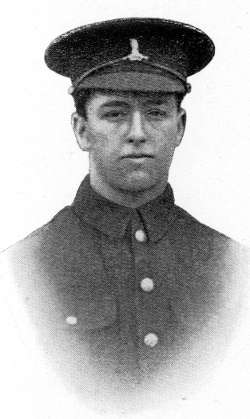
William Noble.
Photograph from "The Oldham Hulmleian", July 1915.
William Noble was born in Oldham on 26th July 1895, the son of James Noble, a cotton warper. He attended Waterloo Council School before coming to Oldham Hulme Grammar School in September 1907 for three years. On leaving school he became a junior clerk.
He enlisted with the 11th Hussars at the outbreak of war. Whilst training on Salisbury Plain he contracted pneumonia and did not recover. He died on 9th January 1915 at Cambridge Military Hospital, Aldershot. He was 19 years of age.
He was buried at Greenacres Cemetery, Oldham.
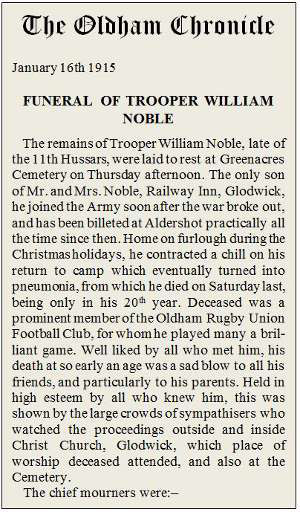
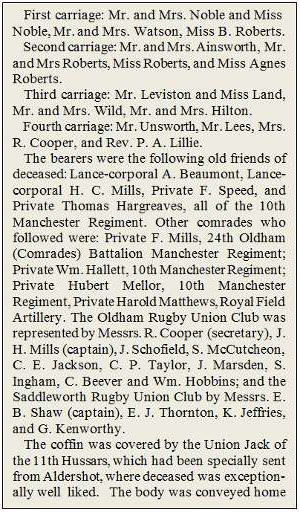
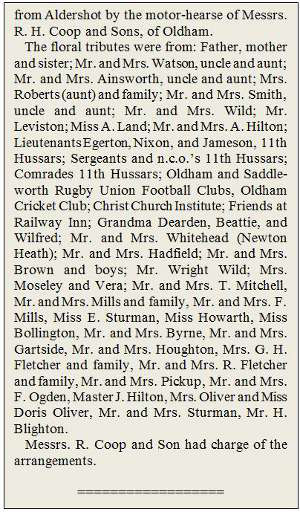
Gerald Lees Stafford Nuttall was born in Oldham on 20th January 1893, the son of J S Nuttall, a machinist. After attending Belfield House School in Bowden he came to Oldham Hulme Grammar School in May 1905 for one term. In 1911 he was working as a motor mechanic but by 1915 described his occupation as engineer.
He attested on 1st March 1915 with the Royal Flying Corps where he was appointed air mechanic 2nd class. He was promoted to air mechanic 1st class on 1st July 1915 and to corporal on 1st December 1915. After serving in the UK he was discharged to a commission with the Royal Engineers on 26th December 1915. He was stationed at Colchester but his work appeared to take him to other parts of the country. As part of his duties as an officer he was in charge of a cheque book belonging to the regiment. According to newspaper reports he then decamped, wrote a number of cheques signed in different names and was only apprehended after he had cashed a cheque at a bank, again using a different name, which was then returned unpaid. A warrant was issued for his arrest and he was brought before the court at Sunderland where he pleaded guilty to obtaining money by false pretences. He was sentenced to three months in jail.
It would appear that he lost his commission and was sent overseas with the Royal Army Service Corps as a private.
He married a lady ten years his junior in December 1918 and a child was born the following month. On 21st November 1919 he departed unaccompanied by ship to Mombasa, listing his occupation as engineer and stating that he intended to make his future home in British East Africa. He cannot be traced after this date.
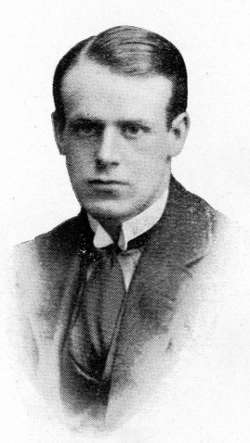
Arthur Ogden.
Photograph from "The Oldham Hulmeian", July 1915.
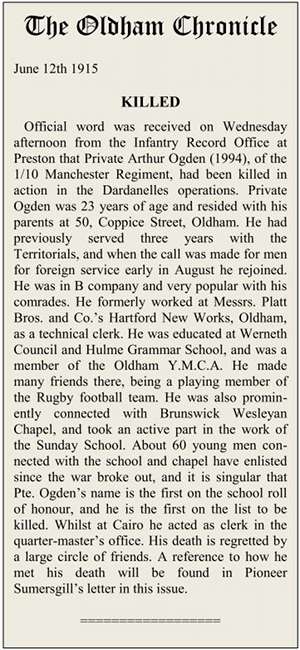
Arthur Ogden was born in Oldham on 14th December 1891, the son of William Ogden, an overlooker. He attended Werneth Council School before coming to Oldham Hulme Grammar School for just over a year from September 1906.
He became a technical clerk with Messrs Platt Brothers and Company at the New Hartford Works. He was a member of the Oldham YMCA and played rugby for their team. He was also connected with the Brunswick Wesleyan Chapel.
Prior to the war he had been a territorial member of the 10th Battalion of the Manchester Regiment. He re-joined the battalion as a private and may have served with them in Egypt although this is uncertain. In May 1915 he served with them in Gallipoli. As quartermaster clerk he was not directly in the firing line but, just two weeks after arriving in Turkey, he was killed instantly by a shell while attempting to drag a wounded comrade out of danger. He died on 21st May 1915 at the age of 23 and is commemorated at the Helles Memorial in Turkey.
Harold Leach Ogden was born in Royton on 25th March 1898, the son of William Ogden, an insurance agent. He attended Royton Council School before coming to Oldham Hulme Grammar School in September 1910 for five years. When he left school at the end of 1915 the war was underway. He started a course at Manchester University and, whilst there, joined the 28th Battalion (Artists Rifles Officer Training Corps) of the London Regiment as a private on 2nd June 1916, shortly after his 18th birthday.
He was found to be unfit for service overseas and was placed on the reserve list. He is believed to have served at home until 20th February 1919 when he returned to university. He graduated BA, MA, 1922 and obtained the University of Oxford Diploma in Education. He became assistant master at Tilstone Fearnall Council School in Tarporley, Cheshire.
He died on 10th August 1980 aged 82.
John Ogden was born in Oldham on 18th September 1891, the son of Thomas Ogden, a gentleman living on private means. He received a private education before coming to Oldham Hulme Grammar School in September 1905 for two years. After leaving school he became a clerk in a cotton mill but by 1915 was working as a blowing room operative.
Prior to the war he had served four years with the Territorial Army. He attested as a private with the Royal Garrison Artillery on 9th December 1915 and was posted as a gunner on 17th May 1916. He served with the British Expeditionary Force in France and with the Rhine Army from 5th October 1916 to 11th September 1919.
In 1939 he was working as a dairyman in Alsager, Cheshire. He died in the Crewe area in 1970 at the age of 78.
Samuel Ogden was born in Lees on 12th February 1883, the son of Thomas Ogden, a gentleman. After a private education he came to Oldham Hulme Grammar School when it first opened in May 1895. He left in November 1897 to join his father's company. In 1911 he was manager of a cotton mill.
He attested on 17th December 1915 as a private with the Royal Army Medical Corps but was not called upon for duty until April 1917. He was sent to France on 11th September 1917 with the Cyclist Brigade of the RAMC and remained there until 27th August 1919.
He died in Lees on 13th September 1925 at the age of 42.
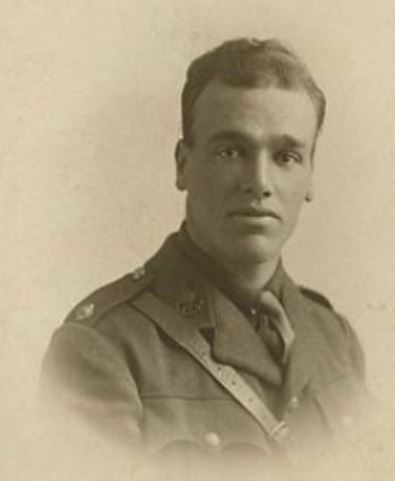
Source: greatwarforum.org, originally from King's College Review, December 1918.
George Ormrod was born in Oldham on 9th January 1888, the son of John Ormrod, a retired police inspector. After attending Waterloo Board School he came to Oldham Hulme Grammar School in September 1899 where he quickly made his mark by winning both the form prize and mathematics prize two years running. In summer 1902 he passed the Oxford Junior Local Examinations, division 1 and, a year later, was awarded an Assheton Scholarship (granted by the School's governors) to allow him to remain in school for a further year. He was also a member of the School's 1st XI, playing centre-half for three years. Critiques of his abilities on the soccer field include: "Though small and light he tackles and passes well. A really promising player," "By far the best man on our team, and indeed he hardly ever fails to be a thorn in our opponent's side" and "Knows the game well, is always in place and has proved a very effective pivot for the team." He also excelled in his earlier years on the athletic field winning in 1901 the under 14 long jump and 100 yards, and coming 3rd in the quarter-mile race which was open to all ages.
Ormrod left Oldham Hulme Grammar School in the summer of 1904 to continue his education at the Oldham Pupil Teacher Centre. After three years at King's College, London, he graduated in 1909 with 1st class honours in Maths, Latin, Greek and French. He was also awarded Professor Spiers' Scholarship to the Alliance Française. Whilst at King's he made a name for himself as a first-rate athlete and an enthusiastic footballer; he played centre-half in the Soccer First XI and captained the team in the 1908-1909 season. After university he had a succession of short-term teaching posts at Rastrick, Hertford and Brighton Grammar Schools. He married Margaret Alice Cooper at Cleckheaton before joining Maidstone Grammar School in 1914 to teach French and English.
A year later, in autumn 1915 he left to join the army and apparently after undergoing surgery to make him fit for service, he trained at the 8th Cadet School at Lichfield. He was granted a commission with the 5th Battalion of the Royal Sussex Regiment and proceeded to France as a lieutenant in August 1916. Much of his service over the next two years was at the Somme, at Nieuport and at Passchendaele.
On 18th September 1918 he took command of his company which was responsible for the capture of prisoners and machine guns, his captain having been wounded earlier. His work during the day was highly praised by his commanding officer but during a night-time attack he had stopped to help a fellow soldier when both he and the soldier were caught in a round of machine gun fire, killing them.
He was 30 years of age and is commemorated in King's College Chapel, London.
Edwin Owen was born in Oldham on 9th August 1887, the son of Charles Owen, a free librarian. After attending Northmoor Wesleyan School he came to Oldham Hulme Grammar School in September 1899 for two and a half years. In 1911 he was working as an accounts clerk.
He attested for service as a private with the Public Schools Battalion on 8th December 1915 but was immediately transferred to the Army Service Corps. He served at Woolwich from 1st March 1916 as a driver, and was promoted to lance corporal on 1st October 1918 and to acting sergeant on 17th February 1919. He was demobilised on 21st March 1919.
He died on 30th November 1925 in Ossett, West Yorkshire, at the age of 38.
Walter Armitage Owen was born in Oldham on 27th July 1897, the son of William Edwin Owen, an insurance agent and councillor for Chadderton from 1907 to 1925. He attended Waterloo Senior School before coming to Oldham Hulme Grammar School in September 1910 for two years.
On 31st January 1916 he applied to join the Royal Engineers Special Reserve Motor Cyclist Section and was found to be sufficiently skilled. At the time he was working as a clerk with the Swan Spinning Company at Middleton Junction.
He was posted as a despatch rider at pioneer rank to a Royal Engineers Signal Depot on 2nd October 1916 and promoted to corporal in February 1917. He embarked from Southampton on 12th April 1917, arriving in Basra, Iraq, on 13th May when he was posted to the Army Signal Company at Margil, Iraq. On 10th June 1917 he was sent as reinforcement to the signal company in Baghdad. He served in Persia from 20th October 1918, and embarked from Basra on 25th January 1920 to return home. He was transferred to Class Z reserve on 29th March 1920.
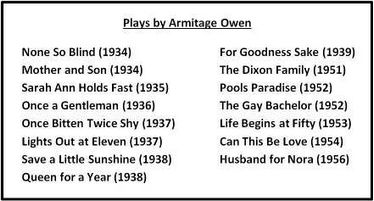
After returning to civilian life he joined a local steeplejack business, and later carried on the concern himself. In his spare time he wrote plays, using the name Armitage Owen. His first 'Lancashire Comedy', a dialect play in three acts, Sarah Ann Holds Fast, had its premiere at the Grand Theatre in Oldham in 1928. It was the first of many successes. Note: the list of his plays shows the year in which the plays were published by Samuel French Ltd, London. Many of the plays were broadcast on the radio.
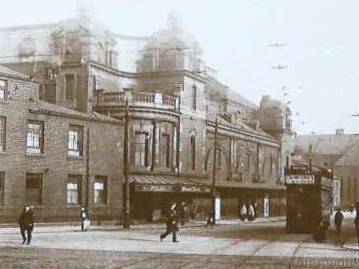
The Grand Theatre, Oldham. Photo: cinematreasures.org
He later formed the Armitage Owen Repertory Company and, in 1935, he became the business manager of Manchester Repertory Company. Comedian Ronnie Barker worked for the company in his early days of performing. The company eventually moved to Rhyl where it remained until the 1950s. His wife, Ceinwen Hiraddng Williams, was headmistress of Lily Lane Girls' School, Monton, for 18 years.
He died in the Harrogate area in 1960 at the age of 62. The Oldham Chronicle called him "once Oldham's most celebrated playwright."
Alexander Park, known as Alec, was born in Ashton-under-Lyne on 27th February 1897, the son of James Mather Park, a bank manager. He attended Waterloo Senior School before coming to Oldham Hulme Grammar School in September 1909 for four years. After leaving school he became a bank clerk.
He enlisted as a private with the 6th Battalion of the Manchester Regiment on 27th April 1915, shortly after his 18th birthday. In September 1916 he embarked from Folkestone to France.
He was admitted to hospital on 30th March 1917 with a septic heel, and had further spells in hospital in both August and September 1917, each time being discharged back to his unit.
On 13th February 1918 he was promoted to the rank of corporal and transferred to the 9th Battalion of the King's Liverpool Regiment.
In 1939 he was working as a bank clerk in Stockport. He died in 1972 at the age of 75.
Douglas Park was born in Hurst near Ashton-under-Lyne on 9th January 1894, the son of James Mather Park, a bank manager. After attending Albion School in Ashton he came to Oldham Hulme Grammar School in September 1905 for five years. He left school to take up an apprenticeship in textile machinery.
He had been a territorial member of the 10th Battalion of the Manchester Regiment for some time before the war and was granted a commission as 2nd lieutenant. He served in Egypt from September 1914. In May 1915 when the battalion left Egypt he was invalided back to the UK. It is thought that he probably returned to his Battalion, either in the Dardanelles or later in France. He was promoted to lieutenant, backdated to 5th August 1915, and later promoted to captain. There is no further information on his wartime service.
During the 1920s he worked as a ship's purser. He died in 1976 at the age of 82.
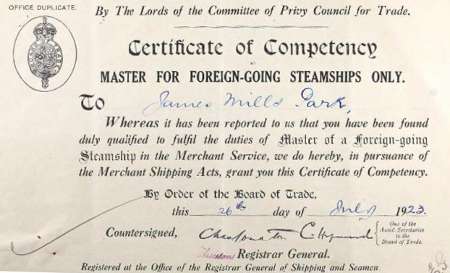
James Mills Park: Certificate of Competency, Master for foreign-going steamships only.
James Mills Park was born in Ashton-under-Lyne on 23rd October 1899, the son of James Mather Park, a bank manager. After attending Waterloo Secondary School he came to Oldham Hulme Grammar School in September 1912 for a year and a half.
On leaving school in early 1914 he became a merchant seaman. He joined the Royal Navy Volunteer Reserve in 1916 as a midshipman and served from 6th May 1916 on the Calgarian, a commissioned merchant vessel. From 16th May 1917 he served on the Royal Navy Battleship Hindustan, and from the end of 1918 on the Royal Navy Ship Harvester.
After the war he progressed through the ranks of the Merchant Navy, receiving his certificates of competency for foreign-going steamships, second mate on 29th March 1919, first mate on 30th May 1921 and master on 26th May 1923.
He remained a member of the Royal Navy Volunteer Reserve until his retirement on 30th June 1937.
However, he returned when the second world war was declared, serving as lieutenant-commander on HMS Canton, a requisitioned passenger ship of the P&O line. While part of the Freetown Escort Force, he was killed on 21st October 1940 at the age of 40. He was buried at sea.
He is commemorated on the Portsmouth Naval Memorial.
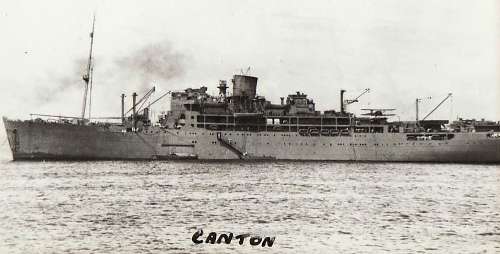
HMS Canton, WW2.
James Parker was born in Oldham on 1st July 1892, the son of Sarah Parker. After attending Derker Council School he came to Oldham Hulme Grammar School in September 1904 for four years. He studied at Manchester University for a BSc, followed by teacher training. From 1913 to 1920 he was assistant master at Derker Council School. In 1920 he moved to teach at the Municipal Secondary School for Boys at Barrow-in-Furness before returning to Oldham in 1926 as headmaster of the Selective Central School in Oldham. He remained there until after 1939.
His Teachers' Registration card states that he served during the war from 1916 to 1919. However, it has not been possible to identify his records.
He died in the Fylde area in 1967 at the age of 75.
Alan Sterling Parkes was born in Castleton on 10th September 1900, the son of Ebenezer Parkes, a bank manager. He attended a school in Rochdale before the family moved to Oldham. He came to Oldham Hulme Grammar School in September 1909, leaving four years later to attend a boarding school.
At the age of 18, shortly before the end of the war, he was called up and joined the Young Soldiers Battalion of the Manchester Regiment where he served for three months. After the war he took a circuitous route to Cambridge University.
His biography calls him "one of the most influential figures in the field of reproductive biology in the twentieth century. He played a leading role in the spectacular rise of reproductive endocrinology in Britain in the 1920s and 1930s. Even more pioneering was his research in low-temperature biology in the years after WW2. His research launched a new branch of biological science which became known as cryobiology." He received a knighthood in 1968.
He died in Cambridge on 17th July 1990 at the age of 89.
Matthew Peacock was born in Guisborough, Yorkshire, on 14th September 1884, the son of William Henry Peacock, a general carrier. When he came to Oldham Hulme Grammar School in September 1896 for two years he was in the care of his uncle, Robert Peacock, chief constable of Manchester. After continuing his education elsewhere he joined the Edinburgh Police Force in 1903. In 1911 he was promoted to a chief clerkship with the rank of lieutenant.
He served during the war with the Royal Scots Regiment and was granted a commission with them. He served in France as a lieutenant and acting captain from 3rd August 1916. He was later transferred to the Labour Corps.
After the war he returned to the Edinburgh Police Force and, at the time of his early retirement in 1927 due to ongoing health problems caused by his war service, was a superintendent. He moved to Croydon in Surrey where, in 1939, he is listed as an ARP officer. He died at King's College Hospital, London, on 1st June 1966 at the age of 81.
Charles Henry Pickford was born in Oldham on 18th January 1887, the son of Charles Henry Pickford, a mill manager. After attending St Margaret's School, Hollinwood, he came to Oldham Hulme Grammar School for almost four years from April 1899. After leaving school he became a secretary of a cotton mill.
He enlisted as a private with the Artists Rifles, the 28th Battalion of the London Regiment, on 11th December 1915 and was placed on reserve until 31st March 1917. At his own request he was transferred to the 478 Siege Battery of the Royal Garrison Artillery as a gunner on 16th November 1917 and posted to France the following week. He was later promoted to corporal.
On 5th October 1918 he returned to England to take up a commission in the Royal Artillery. From school records it would appear that he was a 2nd lieutenant in the 22nd Battalion of the Lancashire Fusiliers.
He later became a master cotton doubler and died on 21st May 1949 at the age of 62.
Norman Plant was born in Wigan, Lancashire, on 27th February 1891, the son of the Reverend John William Plant. After being educated privately, he came to Oldham Hulme Grammar School in April 1901 for three years. We have been unable to locate him in 1911; as he was 20 years of age by that time, it is likely he was at university, or possibly overseas as there appears to be some connection with India - his medal card refers to the India Office.
He enlisted at the beginning of the war as a private with the 10th Battalion of the King's Liverpool Regiment and was sent to France on 2nd November 1914.
On 1st November 1915 he was granted a commission with the Royal Field Artillery, and was promoted to lieutenant on 1st July 1917 and to acting captain for a short period at the end of 1918. When he relinquished his commission on 30th September 1920 he retained the rank of lieutenant.
He died on 4th August 1925 at the age of 35.

The Military Cross,
awarded to officers for gallantry during
active operations against the enemy.
Bevis Platt was born in Oldham on 23rd January 1889, the son of Edwin Platt, a grocer. After attending Freehold Board School he came to Oldham Hulme Grammar School in September 1902 for four years. In 1907 he entered Manchester University to study for a Master of Science degree.
He joined the Officer Cadet Corps and was granted a commission as 2nd lieutenant with the Royal Engineers Signals on 25th November 1914. He served overseas as a lieutenant with the 96th Infantry Brigade S16:32nd Signal Company and was awarded the Military Cross at the end of the war.
After the war he taught electrical science, moving to Buckinghamshire before 1924. On 9th February 1926 he emigrated to Brisbane, Australia, and in 1928 was listed on the Queensland Public Service Record as a teacher of Electrical Subjects at the Central Technical College, Brisbane.
After retirement he visited England in 1956 giving his citizenship and place of abode as Australia. He returned to England again at a later date and died in 1979 in the Trafford area at the age of 90.
Charles Frederick Platt was born in Russia on 17th April 1887. His father was a mill manager in Moscow. He was educated by a governess until the age of 11 when he was sent to England to attend Oldham Hulme Grammar School in September 1898. During his time at school a relative was appointed guardian but he appeared to board with three other boys at the house of Richard Pardoe, a master at Hulme. He left school in July 1903 to returned to Moscow.
By the time he was called up for service in 1918 he was married with children, employed as a mill manager in Moscow. He was placed on the general list and granted a commission, serving as 2nd lieutenant in Northern Russia for a short time at the end of the war.
He appears to have retired to Southport, where he died in 1976 at the age of 89.
Seville Platt was born in Lees on 11th January 1884, the son of John Platt, a minder. After attending Waterloo Board School he came to Oldham Hulme Grammar School from May 1897 until July of the following year. In 1901 he was working as a clerk, in 1911 as a master tin plate worker and in 1916 as a car salesman.
He initially served in 1916 with the Army Service Corps Motor Transport section as a driver but transferred to the Royal Flying Corps as an air mechanic from 21st March 1917. He served with the 35th Squadron in France from 28th April 1917 until 11th February 1919.
He died in Ashton-under-Lyne in 1930 at the age of 46.
John Platts was born in Manchester on 24th November 1896, the son of John Platts, a plasterer. After the family moved to Dobcross he attended Dobcross National School. He came to Oldham Hulme Grammar School from September 1909 to July 1913.
He may have initially joined the West Riding Regiment as a private but in 1918 was serving overseas as a sergeant with the machine gun corps. He was wounded in April 1918 and transferred to hospital in Leicester.
He died in Ashton-under-Lyne in 1929 at the age of 32.
Frank Cyril Pollard was born in Oldham on 26th November 1896, the son of Frank Pollard, a wholesale stationer. After attending Werneth Council School he came to Oldham Hulme Grammar School in January 1908 for five and a half years.
He attested as a private with the Honourable Artillery Company on 3rd May 1916 and served in France and Italy with the 2nd Battalion from 19th November 1916 to 31st January 1917, from 8th September 1917 to 25th November 1917 and again in 1919.
He died in Rochdale in 1931 at the age of 35.
Harry Hampson Potts was born in Oldham on 6th June 1886, the son of Walter Potts. He attended Waterloo Board School before coming to Oldham Hulme Grammar School for just over a year from September 1900. After leaving school he worked as a farmer and pig breeder.
He joined the Royal Army Veterinary Corps as a private in early December 1916 and, three weeks later, was sent to France.
In 1939 he was working as a clerk for West Riding County Council and living at Elland. He died in the Calder area in 1951 at the age of 65.
Frederick William Pressley was born in Oldham on 22nd April 1888, the son of Francis Pressley, an ironmonger. After attending Coppice Board School he came to Oldham Hulme Grammar School in January 1901 for two and a half years. He went into the family business when he left school.
During the war he served overseas as a private with the West Riding Regiment. No further information is available.
In 1939 he was working as a heating engineer and ironmonger in Saddleworth. He died in Bangor, North Wales, in 1962 at the age of 74.
Harold Ratcliffe was born in Marple, Cheshire, on 13th July 1896, the son of Arthur Ratcliffe, a railway goods clerk. After attending Freehold Council School he came to Oldham Hulme Grammar School in September 1908 for four years. He initially worked as a railway clerk but by 1916 was working for a bank.
He attested as a private with the Manchester Regiment on 9th December 1915 but at the medical examination was found to have 'hammer toes' and was not considered fit for service in an active unit. He was posted on 1st February 1916 to the 1st Garrison Battalion in India. These battalions were composed of men too old or unfit for full military service; they took over garrisoned areas leaving others free to take an active part in the war. On 21st July 1918 he was transferred to the Lincoln Regiment Garrison Battalion which was also in India. He finally returned to England at the end of 1919. At some point during his duty in India he caught smallpox and spent ten weeks in hospital; it seems that he had not been vaccinated.
In 1939 he was working as a bank cashier in Oldham and died there in 1973 at the age of 77.
Frederick James Richmond was born in Oldham on 12th June 1888, the son of Frederick James Richmond, a veterinary surgeon. After attending Waterloo Board School he came to Oldham Hulme Grammar School in January 1901. In July 1903 he left school to become a veterinary student, most probably working with his father.
Although no records exist apart from his medal card, it shows that he was granted a commission as lieutenant with the Royal Army Veterinary Corps on 30th November 1914 and served in France from 28th February 1915. An article in the Oldham Chronicle reported that in July 1916 whilst serving as a captain he received a facial injury after he attempted to rescue a horse tangled in wire. He returned to England for treatment.
In 1939 he was a veterinary surgeon in Beddington, Surrey. He died there on 6th June 1965 at the age of 76.
Frederick Maurice Roberts was born in Delph on 12th July 1892, the son of Dr Thomas Harrop Roberts, a medical practitioner. He was educated privately before coming to Oldham Hulme Grammar School in April 1906 for three years. After leaving school he took up an engineering apprenticeship.
He appears to have served in the army reserve from 9th May 1912 but there is no indication of overseas service during the war.
On 22nd December 1917 he joined the Royal Flying Corps. He was transferred to the Central Flying School on 27th August 1918 and then to the 2nd School of Navigation and Bomb Dropping on 18th January 1919. A month later he was transferred to the Royal Air Force reserve.
He died in 1968 aged 76.
Thomas Geoffrey Roberts was born in Delph on 18th March 1890, the son of Dr Thomas H Roberts. After a private education he came to Oldham Hulme Grammar School in April 1903, leaving in the summer of 1908. In 1911 he was working as a clerk for an insurance company.
According to an article in the Oldham Chronicle he was granted a commission as 2nd lieutenant with the West Riding Regiment. He served overseas and was wounded in the head and leg in May 1917. No further information is available.
He died in Saddleworth in 1927 aged 37.
Bernard Robertson was born in Oldham on 4th June 1883, the son of John Robertson, a cashier. After attending Waterloo Board School he came to Oldham Hulme Grammar School in September 1897 for two years. He became a bank clerk and by 1915 had risen to the position of cashier.
He attested as a private with the Oldham Battalion (24th) of the Manchester Regiment on 21st November 1914 but was almost immediately granted a commission. On the battalion's Roll of Officers dated 1915 he is listed as a lieutenant, Platoon commander of Platoon VIII of B Company. He served in France from 8th November 1915. He was later promoted to captain and transferred to the Labour Corps.
He had become an associate of the Institute of Bankers before the war and, in 1939, was a bank manager in Kirkham. He died in the Fylde area in 1945 at the age of 61.
Thomas Postlethwaite Robertson was born in Oldham on 22nd September 1890, the son of John Robertson, a superintendent of horses for a carrier. After attending Waterloo Board School he came to Oldham Hulme Grammar School in September 1903 for five years. He left school when the family moved to Lowestoft in Suffolk. In 1911 he was listed as a medical student but it is not known where he was studying.
Although no records of his military service remain, his medal card shows that he qualified as a doctor and was granted a commission on 4th June 1917 as a captain with the Royal Army Medical Corps. He served in East Africa and appears to have remained there for some time after the end of the war.
In 1939 he was working as a physician and surgeon in Birmingham. He retired to Bournemouth and died there in 1953 at the age of 62.
Edwin Clegg Robinson was born in Oldham on 20th November 1885, the son of Samuel Robinson, an overlooker. After attending Werneth Board School he came to Oldham Hulme Grammar School in September 1897 for three years. In 1911 he was a pharmacist's assistant in Camberwell, London.
He served during the war as a pioneer with the Royal Engineers and was sent to France on 20th January 1917. On 28th May 1917 he was injured by inhaling a gas. He spent a few weeks in hospital in France before being transferred to a hospital in England. He was discharged on 3rd August 1917.
In 1939 he was managing a pharmacy in Beddington, Surrey. He died in Barnet in 1951 at the age of 66.
Henry Radcliffe Robinson was born in Saddleworth on 8th March 1895, the son of William Radcliffe Robinson, a Bank Cashier. After attending Saddleworth Parochial School he came to Oldham Hulme Grammar School in September 1907 for two and a half years. In 1911 he was working as a bank clerk.
He attested as a private with the Royal Army Medical Corps on 27th October 1915 and was either in reserve or on training until the end of the year when he was sent to France. He was wounded on 9th May 1917 but appears to have remained in France until 1st December 1917 when he was transferred to Italy for four months before returning to France. He returned home on 27th May 1919.
In 1939 he was working as a private chauffeur in Saddleworth and died there in 1953 at the age of 58.
Richard Livsey Robinson was born in Oldham on 2nd April 1886, the son of Joseph Robinson, a yarn salesman. He attended Waterloo Board School before coming to Oldham Hulme Grammar School in September 1898 for two and a half years. After leaving school he became a commercial clerk for a textile machine maker.
He enlisted as a private with the 22nd Battalion of the Royal Fusiliers and served in France. No further information is available.
He was killed in action on 17th February 1917 at the age of 30. He is commemorated at the Regina Trench Cemetery in the Somme area of France.
William Henry Roebuck was born in Greenfield on 13th May 1896, the son of George Roebuck, a farmer. After attending Friezland National School he came to Oldham Hulme Grammar School in September 1909 for three years. He became a clerk after leaving school.
On 14th January 1916 he joined the Royal Navy as a writer. Responsible for administrative duties, a writer would work both at land establishments and aboard ship. He appears to have worked at various locations in the UK, at both headquarters and at training establishments. In early 1919 he was promoted to writer 2nd class and finished his service in August 1919.
In 1939 he was working as a railway clerk in Saddleworth. He died in 1974 at the age of 77.
Herbert Roseblade was born in Dobcross on 11th April 1895, the son of Eli Roseblade, a stone mason. His father died in 1904 and he continued to live with his widowed mother and eight siblings. He attended Dobcross National School before coming to Oldham Hulme Grammar School in September 1908 for six years, leaving just before the start of the war.
He became a school teacher and it is thought that he worked at a school in Ashton-under-Lyne.
He enlisted as a private with the West Riding Regiment on 2nd August 1915 but at some point was transferred to the 1st Battalion of the East Yorkshire Regiment. He progressed through the ranks, becoming a sergeant on 6th April 1916. He was posted to France in September 1918; it is not known if he had served overseas prior to this.
On 23rd October he was wounded in the left eye by a gunshot and, a week later, transported to England to undergo surgery. While it is not known if this injury caused ongoing health problems it was assessed as causing less than twenty percent disability and he was awarded £56:5/- on 31st May 1919.
He died on 3rd December 1923 at the age of 28. The implication from his obituary in the school magazine The Oldham Hulmeian was that the injury, described as 'shrapnel to the head' was the cause of his subsequent death but this has not yet been proven.
Obituary from The Oldham Hulmeian, written by Sam Richard Chaloner:
A school fellow writes - I remember 'Rosie' most distinctly as a half-kneeling figure, the body taut, the right leg vigorously shot forward and the keen eyes watching the ball and the goal, watching anxiously with the slightly imperial anxiety of a house captain, and modestly, with his own distinctive modesty, the fate of a last determined attack in a house football match. Defeat he accepted almost with fatalism; victory he granted a short, staccato laugh, scarce more than a catch in his voice.
It was his easy tolerance, both of success and disappointment, that made those of us (I mean of the 'train' boys) who were younger than he was think so much of him. We felt he could do things when he chose, and we were proud of him as we would have been of an uncle. Often enough we teased him, for most 'train' boys were in Platt house and he, fate in revenge of his scorn had always been perverse with him, was in Lees, and later captain of the house. I daresay, sometimes, we were bitter and spiteful. But he seldom replied. He was too kind to be indifferent, too wise, with the wisdom of the country bred and the roughly nurtured, not to value both our pleasantries and our foolishness accurately. His equals may have found him hard, for determination is easily taken as hardness. Wisdom and tolerance make a good prefect, and we were content.
Not that 'Rosie' wore a halo. There was no one could hold his own better in the rough and tumble of a hard-fought game. But there was no vice in it. He robbed his opponent of the ball much as Robin Hood fleeced the rich to pay the poor, and, when moved, he could bandy words as efficiently as a bargee, or tell as good a story as anyone.
'Rosie' went out into the world war soon after he had left school. He came back with a shrapnel wound in his head.
"Whom the gods love die young." Do not the gods encourage us rather to endure life with their promises of immortality, and where lies immortality, but in the fruit of our loins and our labours?
Let it be. The light is gone. Why polish the tarnished vessel? Aladdin is a myth, and there is no answering spirit of the Lamp. 'Rosie' is of the past, and the past only is immortal. What have the gods to do with this? We loved him and, though they take almost all, they can never rob us of the memory of his bitter sweet smile until we too are past. And then we shall not care.
George Ross was born in Oldham on 25th April 1896, the son of George Ross, a manager. After attending Derker Council School he came to Oldham Hulme Grammar School in September 1907 for six years. He started a degree course at Manchester University where he joined the university Officer Training Corps, leading to the granting of a commission as 2nd Lieutenant with the 13th battalion of the Highland Light Infantry.
He was wounded in the head and elbow at the Battle of Arras on 9th April 1917, and spent the following year in the military hospital at Cambridge University. He was then attached to the newly formed Aircraft Inspection Department of the Ministry of Labour before being discharged from the service on 18th February 1919 with an 80% incapacity pension.
After completing his BSc in Maths and Physics at Manchester University, and taking a postgraduate teacher training course, he worked as a schoolmaster in London and Birmingham. Returning to the local area he taught at Hollins Central School where he later became headmaster.
He died in 1975 aged 79.
Henry Robinson Rowbotham was born in Uppermill on 12th March 1886, the son of Edward Rowbotham, a solicitor. He was educated privately before coming to Oldham Hulme Grammar School when it first opened in May 1895. He left at the end of 1898 to attend another school, probably Manchester Grammar School before he continued his studies at Leeds University. In 1911 he was working as a market gardener.
Although his WW1 service records no longer exist his medal card and London Gazette entries show that he initially joined the Public Schools and Universities 3rd Battalion of the Royal Fusiliers. He was granted a commission on 15th December 1914 as 2nd lieutenant with the 7th Battalion of the Duke of Wellington's West Riding Regiment. His medal card shows that he served in France as a lieutenant from January 1917.
In 1939 he was working as a market gardener at Evesham in Worcestershire. He died there on 4th January 1953 at the age of 64.

The Military Cross,
awarded to officers for gallantry during
active operations against the enemy.
John Cheetham Selwyn Rowbotham, known as Selwyn, was born in Uppermill on 20th September 1892, the son of Edward Rowbotham, a solicitor. He was educated privately before coming to Oldham Hulme Grammar School in April 1904 for two years. He continued his education at Manchester Grammar School before entering Manchester University in 1912 to study law.
He was granted a commission as 2nd lieutenant with the 10th Battalion of the Manchester Regiment on 14th October 1914 and served with them in Gallipoli. It is possible that he was injured and it is not clear if he proceeded to Egypt with the battalion. He was later promoted to captain and served with them in France where he was awarded the Military Cross: "At Briastre on the morning of 20th October 1918, on reaching his objective he showed great skill and leadership in dealing with many hostile machine guns. In two cases he showed marked gallantry in rushing enemy posts, himself shooting the crew and capturing the machine guns. His untiring energy, leadership and personal courage ensured the successful capture of the strongly held objective."
Wichita State University in Kansas, USA, holds a collection relating to the 10th Battalion of the Manchester Regiment which they purchased from Sotheby's in 1985. Many items belonging to Rowbotham are included in the collection such as his commission papers, his Military Cross certificate, his war notebook, and a scrapbook of newspaper clippings and photographs.
After the war Rowbotham continued to serve with the territorial force; he had been promoted to major prior to 1935 and would later command the battalion after it had become the 41st Royal Tank Regiment.
Although he cannot be found in 1939, in 1946 he entered a partnership to form Messrs Heppenstall, Rustom & Rowbotham, Solicitors. He died in the New Forest area on 26th February 1971 at the age of 78.
Harry Rowley was born in Oldham on 9th April 1897, the son of Henry Rowley, a publican. After attending Westwood Council School he came to Oldham Hulme Grammar School in September 1905 for five years. In 1911 he was working as a survey office boy.
He joined the Royal Navy in June 1915 as an ordinary seaman and initially worked at the land-based Victory 1 accounting base at Portsmouth. On 11th August 1915 he was posted to the Princess Royal, patrolling the North Sea. He remained there until 23rd May 1918 then served until 6th August 1920 at various land-based facilities.
His occupation after the war is not known. He died in Birmingham in 1933 at the age of 36.
John Rob Roye was born in Chadderton on 25th July 1884, the son of Mark Roye, a cotton broker. After attending Middleton Central School he came to Oldham Hulme Grammar School in January 1896 for three and a half years. In 1911 he was working as a cotton broker.
His medal card shows that he served overseas as a gunner with the Royal Garrison Artillery and later with the Royal Engineers.
In 1939 he was a raw cotton salesman living in Crompton. He died in the Solihull area of Warwickshire in 1958 at the age of 73.
Norman Mark Roye was born in Chadderton on 24th August 1882, the son of Mark Roye, a cotton broker. After attending Middleton Central School he came to Oldham Hulme Grammar School in January 1896 for two years. In 1911 he was working as a cotton broker and living in Southport.
He appears to have served for a period during the war as a clerk at the headquarters of the Labour Corps in Iraq.
After the war he joined the Liverpool company of Pugh Lyons & Co as a cotton broker. He travelled in May 1919 from Liverpool to Quebec, crossing the border into the USA at St Albans, Vermont, before reaching his final destination of New Orleans, Louisiana. He returned from this trip in July and departed a second time in December 1919, returning in May 1920.
In 1939 he was still living in Southport and working as a cotton broker. After retirement, he emigrated with his wife to Sydney, Australia, on 12th July 1950. He died there on 15th March 1979 at the age of 96.
Herbert Arthur Rust was a master at Oldham Hulme Grammar School from 1st September 1913. He was born in London on 26th August 1888 and attended Owen's School in Islington. He graduated BSc honours, Chemistry, in 1910 from University College, London, and also received the Bachelor of Education Elementary Certificate. He taught at Hitchin Grammar School for two years and at Totnes Grammar School for a year before coming to Hulme.
On 4th November 1915 he was granted a commission as 2nd lieutenant with the Royal Garrison Artillery Special Reserve of Officers. There is no evidence that he served overseas, but he was away from school from March 1916 so he probably served in the UK.
After the war he continued teaching from 1919 at the Central Foundation School in London.
He died in 1976.
Edward Rye was born in Oldham on 13th May 1892, the son of Charles Rye, a mill manager. After attending Wavertree School he came to Oldham Hulme Grammar School in September 1901 for five years before entering the commercial world. In 1911 was assistant secretary of a cotton spinning mill.
His service record during the war is contradictory. Often when a medal card cannot be found it is an indication that the man did not serve overseas and service in the UK can usually be verified from other sources. However, it seems certain that Edward Rye did serve overseas despite the lack of a medal card; the book Amateur Soldiers, a History of Oldham's Volunteers and Territorials, 1859 - 1938 by K W Mitchinson lists him as having served in Egypt from 14th April 1915 (presumably as part of the 2/10 battalion which arrived on this date) and being invalided back to the UK when the battalion left Egypt bound for the Dardanelles a month later.
Also, it is noted in The London Gazette that he was granted a commission with the 10th Battalion of the Manchester Regiment on 14th October 1914. As there were no other men with this name in the Manchester area prior to the war it seems certain that the correct man has been identified.
The London Gazette also notes that the same officer was transferred to the Royal Field Artillery on 29th January 1916 which would fit with his returning to duty after recovery from injury or illness.
After the war he became a cotton broker, travelling in 1926 to New York. He was in partnership until 1953 as Rye, Evans and Co, Cotton Brokers.
He died on 26th March 1956 at the age of 63.
Alexander Salkeld was born in Durham City on 12th May 1883, the son of George Salkeld, a solicitor. He was the youngest of at least eight children and 19 years younger than his eldest sister Kate. His mother died when he was two years old. In 1891 he was a boarder with his brother George at a small school in Llandovery, Wales. When he came to Oldham Hulme Grammar School in September 1895 he was in the care of his sister Kate who had been living in Oldham as a 'companion' since before 1891. He left school at Easter 1897 to take up an engineering apprenticeship, returning to Durham City to live with his father.
In 1907, along with his 64 year old father George, he emigrated to Canada. He is shown on the 1911 Canadian Census as living alone at South Porcupine Township, Timmins, North East Ontario Province. He returned to England briefly in 1913, possibly with his father who died in Durham in 1917, but then made his home permanently in Canada.
During the war he served as an air mechanic 1st class with the Royal Flying Corps and Royal Air Force of Canada at their engine repair depot in Toronto. In 1921 he is shown living at North Bay, Ontario, with his wife and two children, working as a machinist, owning his own house and earning what appears to be a higher than average wage. From voter's lists for Ontario it would appear that he died between 1935 and 1949 although a death record cannot be found.
Lees Saxon was born in Oldham on 10th July 1883, the son of Lees Saxon, a butcher. After attending Waterloo Board School he came to Oldham Hulme Grammar School in September 1896 for two years. He then went into the family business with his father
During the war he served with the Royal Navy Volunteer Reserve as an able seaman. However, from 1st December 1917 he served with the Howe Division which was an infantry division serving on land in France, made up of excess reservists and volunteers. From 18th June 1918 to 18th February 1919 he served at the Royal Navy Dockyard at Pembroke.
After the war he continued to work as a master butcher in the family business. He died in Blackpool on 3rd January 1938 at the age of 54.
Arthur Elson Scawthorn was born in Oldham on 27th May 1894, the son of Fred Mellor Scawthorn, a blacksmith. After attending Dobcross National School he came to Oldham Hulme Grammar School in September 1906 for six years. He left school to become a clerk for the railway, working from 16th December 1912 for the London and North Western Railway, Commercial Handling Department, as a junior clerk at Greenfield Station. After the war he appears to have worked at Mosley Street Station.
He enlisted as a private with the Royal Marine Artillery in January 1916 and on 21st June was promoted to gunner 2nd class. He joined the East African Expeditionary Force and was promoted to gunner on 24th August 1916. At the end of the year he returned to the headquarters and from July 1917 he served on Cyclops II at Scapa Flow, where he was involved in land defences and mine sweeping. He served until 28th March 1919 and was reported to have superior ability and a very good character.
In 1939 he was a railway district inspector, living in Saddleworth. He died on 11th May 1962 aged 67.
Edward Schofield was born in Oldham on 8th June 1889, the son of John Schofield, an engineer and machine broker. After attending Zion School in Lees, he came to Oldham Hulme Grammar School in January 1900, leaving in the summer of 1902 to attend Blackpool Board School. He then returned after a year to spend a further year at Hulme.
After leaving school he became a horse breeder, living with his parents and siblings in Delph.
He enlisted in Huddersfield as a driver with the Royal Horse Artillery. A driver was responsible for two horses pulling a gun.
While training at Catterick Camp he contracted cerebro-spinal meningitis. He died there on 27th October 1917 at the age of 28 and was buried at Hipswell Parish Churchyard.
He is commemorated at Pots and Pans Memorial in Saddleworth.
Harry Schofield was born in Oldham on 1st February 1891, the son of John Schofield, an engineer of Delph. After attending Resoa Board School in Blackpool he came to Oldham Hulme Grammar School in September 1903 for two and a half years. In 1911 he was working as a motor cab apprentice.
When he attested with the Labour Corps on 11th December 1915 he was working as a farmer. He appears to have served as a private in the UK and was discharged on 15th April 1918 as no longer physically fit for service. His records show that in May 1915, prior to joining the army, he had surgery for acute appendicitis. The wound did not heal for seven months and consequently caused a ventral hernia, a bulge of tissues through an opening of weakness within the abdominal wall muscles often occurring at the healed site of a past surgical incision. This prevented him from undertaking any heavy manual work.
In 1939 he was a beam wrapper working at a cotton mill in Crompton. His death has not been identified.
James Arnold Schofield was born in Oldham on 9th November 1896, the son of W J Schofield, a joiner's machinist. After attending Waterloo Secondary School he was awarded a scholarship by United Charities in September 1909 to transfer to Oldham Hulme Grammar School. He left school at the end of 1912 to join the Civil Service as a boy clerk. On 24th September 1914 he was promoted to Clerk to the Surveyor of Taxes.
He joined an Officer Cadet Unit and was granted a commission with the London Regiment on 26th September 1917. He served as a lieutenant in the 15th Battalion in France from November 1917. His medal card shows that he was taken as a prisoner of war but no further details have been found.
After the war he returned to the Civil Service and in 1939 was H M Inspector of Taxes in Purley, Surrey. He appears to have died in Switzerland in 1984.
Thomas Schofield was born in Royton on 13th May 1898, the son of Albert Schofield, a mechanic. After attending Royton Council School he came to Oldham Hulme Grammar School in April 1908 for four years. Prior to the war he was working for an Oldham cotton waste merchant.
He enlisted as a private with the Lancashire Fusiliers on 3rd April 1917 and, from July of that year, served in France and Flanders.
He was killed in action at Achiet-le-Grand on 5th April 1918 at the age of 19.
He is commemorated at Gommecourt British Cemetery in the Pas de Calais area of France.
Whitehead Schofield was born in Oldham on 16th July 1892, the son of John Schofield, an engineer. After attending school in Blackpool he came to Oldham Hulme Grammar School in September 1903 for three years. In 1911 he was working as a book-keeper. He emigrated with his brother Harry on 28th March 1914 to Halifax, Canada, with the intention of becoming a farmer.
However, he appears to have served overseas as a guardsman with the Irish Guards from 3rd August 1917. He was discharged surplus to military requirements having suffered impairment since entry into the service on 14th December 1918.
It is not known if he returned to Canada directly after the war, but he is found as a passenger returning to Halifax in February 1937. His occupation is given as brew-master. There is no further trace of him in Canada or the UK.
Clifford Scholes was born in Oldham on 3rd August 1886, the son of Thomas H Scholes, a cashier. After attending Christ Church School in Chadderton he came to Oldham Hulme Grammar School in April 1899 for two years. In 1911 he was working as a machine fitter.
He joined the Labour Corps and appears to have been medically suitable for home service only. After enlistment on 10th December 1915 he was placed on reserve until 29th May 1917 when he was sent to the Western Command Labour Centre to await posting. On 10th November 1917 he joined 538 Agricultural Company. He had experienced problems with his eyesight before the war and suffered a detached retina causing him to be discharged unfit from the army on 10th September 1918.
In 1939 he was the proprietor of a grocery in Lancaster. When he died in 1961 in Macclesfield his age was given as 73.
Henry Scholes was born in Chadderton on 25th January 1896, the son of Thomas Scholes, a farmer. After attending Stanley Road Council School he came to Oldham Hulme Grammar School in September 1908 for two and a half years. In 1911 he was working as a clerk for a cotton spinning company.
He attested as a private with the Royal Welch Fusiliers on 1st March 1916 and was placed on reserve. He was initially posted on 5th May 1916 with training and labour battalions of the Cheshire Regiment but was transferred to the Devonshire Regiment in 1917. He served in the UK and was discharged no longer fit for duty on 2nd November 1917.
He died at Cheadle Royal Hospital on 28th September 1938 at the age of 42. He had been living at the family farm in Chadderton.
John Hallett Sciville was born in Cardiff on 14th July 1889, the son of John Sciville, a bank manager. After attending the Intermediate School in Cardiff, he came to Oldham Hulme Grammar School in January 1904 for two years. He went into banking when he left school.
He served overseas as a private with the Royal Fusiliers during the war. No further records exist.
In 1939 he was working as a bank cashier in Watford, Hertfordshire, and died there on 24th November 1981 at the age of 92.
Clifford Searston was born in Oldham on 24th July 1896, the son of George James Searston, a clerk for a grocer and sub-postmaster. After attending Derker Council School he came to Oldham Hulme Grammar School in April 1909 for a little over a year. He initially worked as a clerk for Chamber Colliery in Oldham before taking an apprenticeship as a fitter with Asa Lees.
On 20th January 1914 at the age of 17 years and 7 months he attested for four years with the 10th Territorial Battalion of the Manchester Regiment agreeing that, in the event of a national emergency he would serve overseas. He was placed on reserve until 26th January 1916 when he was released for munitions work at Taylor Wordsworth in Leeds.
On 7th May 1917 he was transferred as a private to the Royal Army Service Corps Mechanical Transport Company where he would be employed as a fitter, firstly at the 3rd Heavy Repair Shop and later with 17th Corps Troops Mechanical Transport Company. He served in France from May 1918.
After the war he became a textile fitter and in 1939 was working at Shardlow in Derbyshire. He died there in 1974 at the age of 77.
Arthur Leslie Seddon was born in Bolton on 12th October 1896, the son of Sylvester Seddon, sub-manager of a bank. After a private education he came to Oldham Hulme Grammar School in January 1905 for four years. He continued his education as a boarder at Calday Grange Grammar School in West Kirby after which he probably went into the banking profession.
He joined the Artists Rifles Officer Training Corps and was granted a commission with the 2/22nd Battalion of the London Regiment, serving with them in Egypt from July 1917. Later that year he was appointed to the 194 Training Squadron of the Royal Flying Corps which was also based in Egypt. He then moved to 113 Squadron and 23 Training Squadron before being promoted to lieutenant and posted as assistant instructor with 193 Training Squadron. He was admitted to hospital twice while in Egypt but no further details are available. He left from Port Said on 1st May 1919 to return to the UK.
It is probable that he resumed his career in banking. On 17th November 1924 he was sentenced to 12 months in prison on a charge of forgery. No further details are available except that his army rank was withdrawn at this time.
After serving his sentence he emigrated to Canada on 10th November 1926, giving his occupation as banking and intending to make his home there. There are also records of him travelling to the USA from Canada in 1935 and from the UK to Canada in 1947. On both these dates he is listed as an auditor for Sun Life Assurance but there is no indication of which country he normally resided in. No records have been found of him returning to the UK. However, it would appear that he retired to Bournemouth and died there on 5th January 1956 at the age of 59.
Joseph Eric Sellers was born in Shaw on 17th July 1890, the son of Urban Sellers, a schoolmaster. After attending Shaw Wesleyan School he came to Oldham Hulme Grammar School in September 1903 for two years. He later became a clerk in the office of a cotton mill.
He enlisted in Shaw as a private with the 9th Battalion (Ashton Territorials) of the Manchester Regiment. It is not known when he first joined his battalion overseas, but he was with them from August 1917 in the Ypres area of Belgium.
He was killed in action on 6th September 1917 at the age of 27.
He is commemorated at the Tyne Cot Memorial in Belgium, and also on Shaw war memorial and Ashton-under-Lyne war memorial.
Alec Shaw was born in Mossley on 10th July 1897, the son of Peter Shaw, an agent. After attending Central Council School in Mossley he came to Oldham Hulme Grammar School in January 1911 for two and a half years. He became an insurance clerk.
He joined the Royal Navy on 2nd January 1917 and was assigned to the training base Vivid 1 at Devonport. On 18th April 1917 he was transferred to HMS Liverpool and promoted to able seaman on 20th August 1918.
In 1939 he was a fire insurance surveyor living in Southport, where he died in 1954 at the age of 57.
Herbert Cecil Shaw was born in Mossley on 4th October 1892, the son of Peter Shaw, a businessman and local councillor. After attending Abney School in Mossley he came to Oldham Hulme Grammar School in November 1906. He left school in July 1908 to pursue a career in banking with the District Bank in Oldham.
He volunteered for the 20th Battalion (Public Schools) of the Royal Fusiliers and was posted to France in November 1915. On 19th July 1916 the battalion moved to the front line and was involved in the attack on High Wood at the Somme where he suffered concussion and shell shock. In late December 1916 he was transferred to England as his recovery was not progressing whilst he remained in France. After two months at a hospital in Manchester he returned to the regimental base in Dover where he applied for a commission as an officer, for which he was sent on a training course in Fermoy, Ireland.
He was granted a commission as 2nd lieutenant with the South Lancashire Regiment and in June 1918 was sent as an instructor to Salonika where he remained until the end of the war.
In 1939 he was working for a bank in the Preston area. He died in 1974.
Seth Shaw was born in Delph on 17th December 1895, the son of Charles Shaw, a painter and decorator. He attended Delph Provided School before coming to Oldham Hulme Grammar School in January 1910 for one year.
On the 1911 census he is shown as being 15 years of age with no occupation given.
He enlisted as a private with the Royal Army Medical Corps and served in the Balkans from 15th December 1915. There is no further information.
After the war he became a chemist and had a shop in Stretford. He died on 11th July 1956 at the age of 60.
David Henry Siddall was born in Oldham on 16th November 1893, the son of John Siddall, a brush maker. He attended Waterloo Council School before coming to Oldham Hulme Grammar School in January 1907 for a year and a half. After leaving school he went into the family business.
Prior to the war he had served in the reserve battalion of the Duke of Lancaster's Own Yeomanry and was called up at the outbreak. While serving in France he was transferred to the Lancashire Fusiliers.
On 27th November 1917 he was granted a commission as 2nd lieutenant with the King's Own Yorkshire Light Infantry. He married in early 1918 and was then again deployed to France.
He was killed in action on 16th September 1918 at the age of 25. He is commemorated at St Nicolas British Cemetery in France.
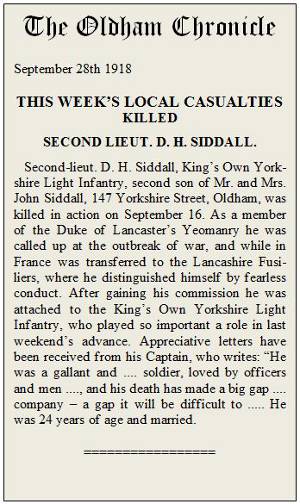
William Kershaw Slater was born in Oldham on 19th October 1893, the son of James Slater, manager of a cotton mill. As a child he suffered severely from asthma and was sent to a small school in Bournemouth. However, by the age of 14 he was sufficiently well to return to his home in Shaw. He came to Oldham Hulme Grammar School in September 1907 for four years, where he found "an inspired teacher" of chemistry. In 1911 he received a school-leaving exhibition and entered Manchester University as an honours chemistry student. He graduated 1st class in 1914 and was awarded a Leblanc Medal and University Scholarship for postgraduate research.
His attempts to join the army were not successful due to his previous asthma and his need for strong spectacles in order to see. He continued as an MSc student and became a member of the staff of the Chief Inspector of Explosives, working for the government in chemical research.
He remained at Manchester University for three years after the war before becoming, at his father's request, scientific adviser to the Belgrave Group of cotton mills in Oldham. However, he had become increasingly interested in the field of what was later named biochemistry and, through his contacts at Manchester University, was able to obtain funding from the Medical Research Council to pursue research. In 1929 he was offered the opportunity to take charge of the laboratory of the Dartington Project, a scientific approach to farming and land management, where his employers soon recognised his business acumen. His time at Dartington provided him with an ideal apprenticeship for the work that was to follow during the second world war. From 1942 he was a scientific adviser to the Ministry of Agriculture and, from 1944 to 1949 was senior advisory officer to the Ministry of Agriculture. He was later involved with the Agricultural Research Council (secretary), the Colonial Committee for Agriculture (chairman), and Unesco's International Committee on Agricultural Education (chairman). In 1961 he was appointed permanent representative of the UK on the Council for Scientific Education and Research.
He was appointed KBE in 1951. He died in Sussex on 19th April 1970 at the age of 76.
Lewis Rudolph Slight was born in Paisley, Scotland, on 15th January 1893, the son of the Reverend Lewis A Slight, a minister. The family frequently moved around the country and in 1901 were living in Northamptonshire. After attending the Royal Grammar School in Colchester he came to Oldham Hulme Grammar School in September 1907 for a year and a half. In 1911 he was a farm student living in Leicestershire.
He enlisted as a private with the Manchester Regiment, serving with them in France from 8th November 1915. No further records are available.
After the war he returned to farming and in 1920 emigrated to Canada to set up as a farmer in the area of Kitchener, Ontario. His death has not been traced.
Charles Smethurst was born in Oldham on 27th January 1896, the son of Charles Smethurst, a tin plate worker. After a private education he came to Oldham Hulme Grammar School in February 1906 for two years. He went into the family business as a tin plate worker.
He joined the Army Service Corps Motor Transport Division as a driver and embarked to Basra on 12th May 1916. He served in Mesopotamia until May 1918. He was then sent on leave to Bombay and Bangalore in India until 5th June 1919 when he left to return to the UK. His ability as a driver of a Vauxhall car was very good and he was noted as being sober, reliable and intelligent.
He died in Oldham in 1936 at the age of 40.
Harry Smethurst was born in Oldham on 26th September 1900, the son of Charles Smethurst, a tin plate worker. After attending Derker Council School he came to Oldham Hulme Grammar School in January 1908 for five years. He joined the family business as a sheet metal worker when he left school.
He joined the Royal Air Force two months before his 18th birthday on 30th July 1918 and was assigned to a training depot before being transferred to a communications squadron. He does not appear to have served overseas.
It is likely he took over the family business and, in 1939, is shown as a master sheet metal worker. He died in Oldham in 1967 at the age of 66.
Booth Smith was born in Oldham on 25th May 1886, the son of Sidney Smith, a retired machine maker. After attending Drury Lane Board School he came to Oldham Hulme Grammar School in April 1898 for three years. He later became a textile machine draughtsman.
He served during the war as a corporal with the 30th Signal Division of the Royal Engineers and was posted to France on 7th November 1915. There is no further information.
Edgar Percy Clifford Smith was a member of staff at Oldham Hulme Grammar School from 12th February 1915 until 25th June 1916. He had graduated BA 2nd class honours in Pure and Applied Mathematics from the University of Wales at Aberystwyth and started his teaching career at Heckmondwike Secondary School. Before coming to Hulme he had also taught at Hebden Bridge Secondary School, Irvine Royal Academy, and Lawrence Sheriff Lower School, Rugby.
At Hulme he was assistant to the head of the junior school, did some teaching in middle school, and was gymnasium instructor.
He enlisted as a private in June 1916 with the Oxford and Bucks Light Infantry, and later served with the Labour Corps and the Royal Engineers. No further information is available.
He died on 29th November 1963 at the age of 77.
Eric Dawson Smith was born in Oldham on 12th February 1899, the son of James Smith, a builder and contractor. After attending Salem School he came to Oldham Hulme Grammar School in April 1908 for five years.
His records from the Royal Air Force mention the 3rd Battalion of the Manchester Regiment, implying that he had previously served with them. He became a cadet at the RAF in April 1918. It was noted that he was a 1st class machine gunner. From his papers it is uncertain whether he remained with the RAF or returned to the Manchester Regiment.
In 1939 he was working as a manager, living in Manchester. His death has not been found.
John Bowers Smith was born in Oldham on 12th September 1899, the son of F A Smith, a commercial clerk. After attending Freehold Council School he was awarded a Hulme Scholarship to Oldham Hulme Grammar School in September 1911. He remained at school for three years and later joined the Royal Navy as a writer.
He is listed as serving on the Sandhurst, a UK based depot ship, during WW1. He continued in the Royal Navy, serving at establishments in the UK and, in 1939, was a Chief Petty Officer living in Woking, Surrey. He also served in the same capacity during WW2.
His death has not been found.
Lancelot William Sparrow was born in Hollinwood on 23rd July 1888, the son of Dr R Lancelot Sparrow, a doctor. He came to Oldham Hulme Grammar School in January 1899 for 5 years before continuing his education elsewhere. He studied medicine at Manchester University, graduating MB in 1912.
He was granted a commission as lieutenant with the Royal Army Medical Corps on 11th December 1914 and promoted to captain on 1st October 1915. He is listed as 'attached to other units' and it appears that he did not serve overseas.
In 1939 he was the assistant schools' medical officer in Manchester. He died there on 8th March 1946 at the age of 57.
Charles Spencer was born in Oldham on 12th March 1887, the son of Charles Collings Spencer, a contractor. After attending Waterloo Board School he came to Oldham Hulme Grammar School in September 1896 for five years.
He enlisted on 29th December 1914 as a private with the Loyal North Lancashire Regiment and served in France from 25th September 1915. He transferred to the Royal Lancashire Regiment and was discharged from the army on 9th October 1917 as he was no longer fit for service due to wounds. He died in 1927.
Charles Hubert Spencer was born in Ashton-under-Lyne on 28th April 1897, the son of C S Spencer, a physician and surgeon. After attending Albion School in Ashton he came to Oldham Hulme Grammar School in September 1911 for four years. He studied medicine, probably at Manchester.
He joined the Officer Training Corps while at university and was granted a commission as temporary 2nd lieutenant with the Manchester Regiment Training Reserve Battalion on 27th June 1917. He does not appear to have served overseas.
In 1939 he was a physician and surgeon in general practice in Ashton-under-Lyne. He retired to Bournemouth and died there in 1966 at the age of 69.
Harold Stanley was born in Oldham on 19th December 1883, the son of Thomas Stanley, a leather turner. After attending Greenacres School he came to Oldham Hulme Grammar School in May 1897 for one term. In 1911 he was working as a law clerk.
He enlisted as a private with the Liverpool Regiment but was transferred to the 59th Labour Company of the Labour Corps. He served in France and Belgium from 11th March 1917 to 19 October 1919.
In 1939 he was a solicitor's clerk living in Oldham. He died there in 1944 at the age of 60.
Edmund Stansfield was born in Royton on 22nd August 1897, the son of David Stansfield, relieving and collecting officer for Oldham Union Guardians of the Poor. After attending Werneth Council School he came to Oldham Hulme Grammar School in September 1910 for just over a year. He later became a fitter for Isaac Brierley and Company.
He enlisted as a private with the 3/10th Battalion of the Manchester Regiment on 5th July 1915, shortly before his 18th birthday. At the end of the year he transferred to the Royal Flying Corps. He probably worked as a fitter and appears to have served in India from 6th July 1916 to 1st March 1919. During that time he was treated for sandfly fever on 24th June 1918 and was admitted to hospital in Baghdad on 12th September 1918 suffering from pharyngitis.
After returning to England he attended the 2nd School of Navigation and Bomb Dropping. He was transferred to the Royal Air Force Reserve on 5th June 1921 and discharged on 2nd December 1923.
In 1939 he was working in Oldham as a registrar. He died in 1971 in the Isle of Man.
Sidney Stevenson was born in Oldham on 3rd January 1885, the son of Thomas Stevenson, a schoolmaster. After attending Werneth Board School he came to Oldham Hulme Grammar School in September 1895. In December 1897 he was withdrawn from school at the headmaster's request and continued his education at Greenhill Secondary School, Oldham (he is mentioned in their 1915 magazine). In 1901 he was working as a clerk. In October 1903 he was sued by a company in Shrewsbury for buying goods for delivery to his home address with no intention to pay, knowing he was under age to enter into such a contract. His father was ordered to pay the cost.
He joined the Royal Marines as a band boy on 2nd May 1904. His papers show a birth date of 2nd September 1886 but details of his next of kin and address are correct. He served as a musician in various locations and may have served part of this time at the China Station. In 1909 he was transferred to the School of Music at Chatham. He remained with the Royal Marines until 10th October 1911.
He then emigrated to Australia and is next found serving as a gunner with the Royal Australian Artillery from 8th June 1912 until 29th December 1913 when he transferred to the Royal Australian Navy as bandmaster. On 18th December 1914 he joined the Tropical Unit of the Australian Imperial Expedition Force as a private, serving initially as an orderly at a depot. In July 1915 he was promoted to the rank of sergeant and employed as acting post master at Rabaul in the previously German held Papua New Guinea. He was upgraded to warrant officer and then granted a provisional commission whilst at Rabaul. In February 1916 he left Rabaul on leave to return to Sydney and a month later his appointment was terminated. He re-enlisted in August 1916 for home duties only but was then discharged in October at his own request.
However, he must have enlisted again as he embarked from Sydney as a private with the Australian Imperial Expeditionary Force on 25th November 1916, arriving in Devonport on 29th January 1917. After training at Sutton Manderville and Larkhill his unit were sent to the front in France on 6th May 1917 where, two weeks later, he was wounded by a gunshot. He was treated in the field and a week later returned to duty. In August 1917 he lost eleven days' pay for overstaying his pass by two days. Three weeks later he was promoted to lance corporal.
He received treatment in the field for myalgia in December 1917 and was returned to England for further treatment at Queen Mary's Military Hospital in Whalley. He then served at a depot at Weymouth until 12th May 1918 when he returned to Australia. He was discharged from the service on 27th August 1918 as unfit due to trench fever and debility.
We have not been able to trace his death in Australia.
Allan James Stewart was born in Oldham on 13th January 1892, the son of William Allan Stewart MD, a surgeon. After attending Aberdeen Grammar School he came to Oldham Hulme Grammar School in September 1903 for a year. It is thought he continued his education in Scotland as he cannot be found in England in 1911.
His WW1 medal card shows that he joined the Royal Marines but there is no further detail. On 22nd August 1919 he joined the RAF for 12 years as a fitter, giving his civilian occupation as engineer. He was discharged on 21st August 1931 and appears to have worked as an engineer on aircraft at Farnborough. He volunteered for service again on 12th August 1939 and was sent to work on aircraft engines at Gosport. He was killed in an enemy air raid there on 16th August 1940.
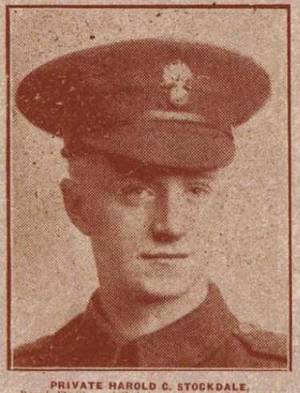
Photograph from the "Oldham Chronicle,
14th War Supplement", 23rd December 1916.
Harold Claude Stockdale was born in Oldham on 5th August 1893, the son of Leonard Stockdale, a wholesale grocer. After attending St Thomas' School, he came to Oldham Hulme Grammar School in January 1904 for five years. In 1911 he worked in the electrical industry.
He enlisted as a private with the 20th battalion of the Royal Fusiliers and was sent to France on 15th November 1915.
He was killed in action on 20th July 1916 at the age of 21.
He is commemorated at Thiepval, the memorial to the missing of the Somme, and at St Thomas' Church, Werneth.
Percy Stockdale was born in Oldham on 8th August 1885, the son of Leonard Stockdale, a grocer and tea merchant. After attending Werneth Board School he came to Oldham Hulme Grammar School in January 1896 for five and a half years. He then went into the family firm.
He joined the Inns of Court Officer Training Corps as a cadet and was granted a commission with the 2/8th Battalion of the Manchester Regiment on 27th June 1917. He served in Belgium from that date and was later promoted to lieutenant.
He died on 9th November 1951 aged 66.
Charles Gordon Stoddard was born in Oldham on 31st January 1885, the son of Wilkinson Stoddard, a master tailor. After attending St Domingo Wesleyan School he came to Oldham Hulme Grammar School in January 1896 for three years. He then continued his education at Denstone College before studying at Manchester University. Although it appears that he studied medicine there is no evidence that he practiced in this field. Certainly, by 1933, he was a wholesale clothier.
He had been a volunteer member of the Royal Army Medical Corps since 1903. He served overseas from 1915 and was promoted to honorary captain and transport officer with a field ambulance in 1916, and later to honorary captain with the Territorial Force Reserves. He relinquished his commission on 1st September 1921, retaining the rank of lieutenant.
He died on 8th January 1954 at the age of 68.
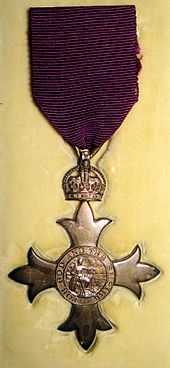
The MBE as awarded in 1918.
John Wilkie Stoddard was born in Oldham on 19th April 1883, the son of Wilkinson Stoddard, a master tailor. After attending St Domingo Wesleyan School he came to Oldham Hulme Grammar School in January 1896 for three and a half years. He continued his education at Denstone College and by 1911 was working as a schoolmaster.
He was granted a commission with the 5th Battalion of the West Yorkshire Regiment and was promoted to temporary lieutenant on 23rd February 1916. He served in France from 4th January 1917 and was promoted to acting captain on 10th February 1917 whilst employed as an assistant instructor at a school of instruction in France.
He was awarded the MBE on 3rd June 1918 for "an act of gallantry not in the presence of the enemy". On 3rd November 1920 he was promoted to the rank of captain and, on relinquishing his commission on 30th September 1921, retained the rank.
On 2nd December 1933, whilst he was a master at Flete House Preparatory School in Sussex, he was charged with being drunk while in charge of a motor vehicle. A doctor diagnosed him as being in a serious nervous condition. He died less than two weeks later on 15th December 1933 at a railway bridge. He was 50 years of age.
John Stopford was born in Rochdale on 20th September 1890, the son of the Reverend John Bird Stopford. After attending Rochdale Collegiate School he came to Oldham Hulme Grammar School in September 1901 for nine years. He attended university and, according to his father's probate record, became a schoolmaster.
He was granted a commission with the 7th Battalion of the Lancashire Fusiliers, probably in 1915 after attending an officer training course. He was sent to Mesopotamia on 20th May 1917, seconded to the Machine Gun corps, and promoted to lieutenant on 1st July 1917.
He retired prior to 1939 and moved to Lytham St Annes where he died on 22nd March 1955 at the age of 64.
George Edward Stott was born in Oldham on 20th May 1887, the eldest son of Philip Sidney Stott, later Sir Philip Sidney Stott, Baronet, architect and engineer, designer of 22 mills in Oldham, a further 55 in Lancashire and 28 overseas.
After attending Waterloo Board School he came to Oldham Hulme Grammar School in September 1899 for two years. He then continued his education as a boarder at Rossall School in Fleetwood, and in Dusseldorf, Germany. He was articled to his father from 1909 to 1914 and became a member of the Royal Institute of British Architects. He married Kate Swailes, an 'old-girl' of the school, in 1912 and had five children between 1913 and 1928.
He had been a member of the territorial 10th Battalion of the Manchester Regiment for many years. He was granted a commission with them on 15th March 1909 and was promoted to lieutenant on 14th July 1910 and to captain on 12th October 1912.
On 20th August 1914 he started training with his battalion, and left with them for Egypt on 20th September. In May 1915 the battalion was moved to Gallipoli and it is uncertain whether or not he accompanied them (as reported in a Manchester Evening News article) or was, at that time, returned to England (as mentioned in the book Amateur Soldiers, A History of Oldham's Volunteers and Territorials, 1859 - 1938 by K W Mitchinson). He appears to have been hospitalised in Alexandria in June 1915 suffering from fever and shock, and was invalided home.
It appears that he later served with his battalion in France at the end of the war.
After returning from the war he took control of his father's company. He became Baronet Sir George Edward Stott on the death of his father in 1937. He died on 11th July 1957 at the age of 70.

Officers of the 10th Manchester Regiment, August 1912. Photograph from "Amateur Soldiers" by K W Mitchinson.
Note that his name is recorded incorrectly.
George Whittaker Stott was born in Oldham on 27th March 1899, the son of Harry Stott, a cotton manufacturer. After a private education he attended Oldham Hulme Grammar School for two terms in 1907 at the age of eight. He then went as a boarder to Lawrence House Boys School in St Annes. After leaving school he worked for James Stott Ltd at Werneth Mills.
He applied, probably soon after his 18th birthday, and was granted a commission as 2nd lieutenant with the 6th Battalion of the Duke of Wellington's West Riding Regiment. He served with them in France from 22nd August 1918.
He was wounded in November 1918 resulting in his death on 8th November at the age of 19. He is commemorated at St Sever Cemetery in Rouen.
Leslie Hamilton Stott was born in Oldham on 22nd September 1891, the son of Robert Stott, a cotton spinner. After a private education he came to Oldham Hulme Grammar School in September 1902 for four years. He later became a cotton marle merchant.
He enlisted as a private with the Honourable Artillery Company, a territorial unit formed at the start of the war. He was granted a commission on 6th February 1918 with the 13th Battalion of the Royal Sussex Regiment and probably served in France in 1918 only.
On 25th April 1918 he was captured by the Germans and taken to Karlsruhe as a prisoner-of-war. He may have later been transferred to a camp at Mainz. In August 1918 a telegram was sent: "Tel. Oldham. prisoner Karlsruhe well let mother know Leslie Stott".
He was repatriated on 3rd December 1918.
In 1939 he was managing director of a cotton waste merchant. He died in 1970 aged 78.
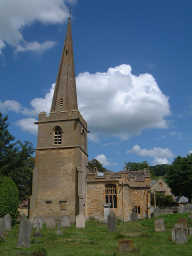
Stanton Church.
Philip Nicholson Stott was born in Oldham on 4th May 1896, the son of Philip Sidney Stott, later Sir Philip Sidney Stott, Baronet, architect and engineer, designer of 22 mills in Oldham, a further 55 in Lancashire and 28 overseas.
After a private education he came to Oldham Hulme Grammar School at the age of seven in January 1904 for four years. He then continued his education as a boarder at Rossall School in Fleetwood. The family moved to Stanton, Gloucestershire, in 1913.
He applied to the 2/10th Battalion of the Manchester Regiment which was raised soon after war started to replace the 1/10 Battalion which had been sent to Egypt, and was granted a commission with them. Whilst training at Southport he contracted pneumonia. He died there on 21st March 1915 at the age of 18.
He was buried in Stanton. In 1918, in memory of his son, Mr Philip Sidney Stott of Oldham and Stanton Court, arranged for an artistic screen and rood to be added to the Church of St Michael in Stanton.
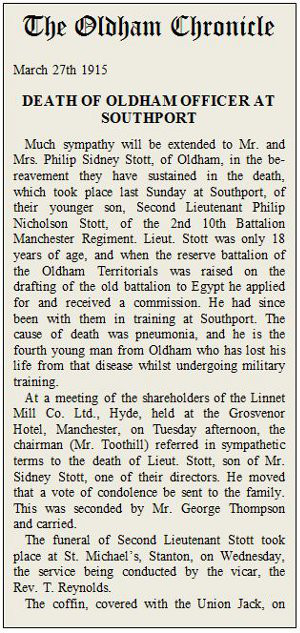
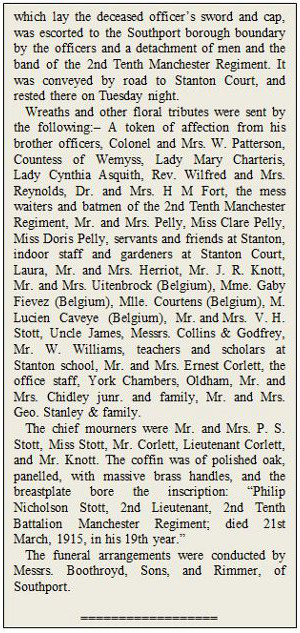
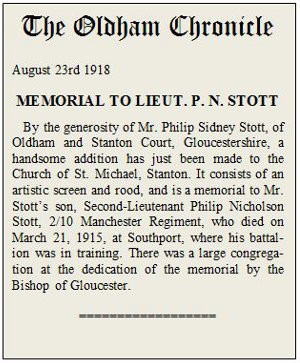
Sydney Harold Stott was born in Cross Bank, Ashton-under-Lyne, on 17th September 1898, the son of Samuel Stott, a contractor. After attending Hey St John's School he came to Oldham Hulme Grammar School in April 1909 for five years. On leaving school he became a clerk in a cotton mill.
He enlisted as a gunner with the Royal Garrison Artillery a day before his 18th birthday in September 1916 and may have served overseas later that year. On 22nd October 1917 he was posted to the cadet wing of the Royal Flying Corps. He served in France from 2nd January 1918 to 7th June 1918 but it is unclear whether he was serving with the Royal Garrison Artillery or with the Royal Flying Corps.
He was discharged on 28th December 1918 as he was no longer fit for military service due to suffering a valvular disorder of the heart (most often caused by rheumatic fever). His disablement was assessed as 30% and confirmed as being aggravated by the war.
In 1939 he was a master builder and contractor, and an estate agent, living in Lees. He died in 1982 at the age of 83.
Herbert Sutcliffe was born in Oldham on 18th October 1891, the son of Daniel Sutcliffe, a coal merchant. After attending Friezland School he came to Oldham Hulme Grammar School in May 1905 for just over one year. On leaving school he became a clerk in a cotton spinning mill.
He had been a member of the territorial 10th Battalion of the Manchester Regiment for some years prior to the war. He was granted a commission on 1st December 1909 and promoted to lieutenant on 15th March 1912. He joined his battalion for training on 20th August 1914 and, at the end of the month, he was promoted to the rank of captain.
He sailed from Southampton with the battalion on 20th September 1914 and served firstly in Egypt and then from May 1915 in Gallipoli. In June of that year he was wounded in the hand and sent to hospital in Alexandria. From there he returned home.
His description of a charge across no-man's land in Turkey was reprinted in the book Amateur Soldiers, A History of Oldham's Volunteers and Territorials, 1859 - 1938 by K W Mitchinson: "... a wonderful affair ... all the time Turkish machine guns were knocking us about, but when we got within a reasonable distance, the Turks would not stand but turned and ran as fast as they possibly could. They did not give us the opportunity to have a hand to hand engagement with them."
Also from the same book is a mention of Captain Sutcliffe being interviewed by the Oldham Standard on his return to England. He is quoted as saying that "not an Oldham man stood back when the order to do their duty was given. They have proved themselves a credit to the town... by their gallant behaviour." The editorial below capitalised on the pride so evident in Sutcliffe's account, however this appeared before the battalion's casualty list grew to an alarming length: "We have no hesitation in saying that there is no man, woman or child in the town who will not read it with feelings of pride and jubilation. It is a thrilling account of bravery displayed by a most efficient and highly trained body of men... the fierce charges against almost unassailable Turkish positions make up an experience of which the men will be forever grateful. The narrative will go far to soothe the sorrow of the Oldham homes which have suffered bereavement."
Herbert Sutcliffe died on 8th December 1971 at the age of 80.

Officers of the 10th Manchester Regiment, August 1912. Photograph from "Amateur Soldiers" by K W Mitchinson.
Alfred Swales was born in Oldham on 3rd April 1892, the son of Harry Swales, a wine and spirit merchant. After attending Werneth Council School he came to Oldham Hulme Grammar School in May 1905 for three and a half years. He then became a pupil to a civil engineer.
He enlisted at Oldham as a private with the 17th Battalion of the Manchester Regiment on 8th November 1915. He joined the expeditionary force to France on 8th July 1916 and was promoted to lance corporal on 9th December of that year.
He was killed in action on 23rd April 1917 at the age of 25.
He is commemorated at the Arras Memorial in France.
John Swales, known as Jack, was born in Oldham on 17th April 1894, the son of Harry Swales, a wine and spirit merchant. He attended Werneth Council School before coming to Oldham Hulme Grammar School in September 1905 for seven years. After he left school he continued his education at Manchester University, graduating MSc in Mathematics with second class honours in 1915.
He enlisted at Ashton-under-Lyne as a private with the 2/7th Battalion of the Manchester Regiment on 9th December 1915. Of note from his enlistment forms is the fact that he is the largest man we have found in our records at just a quarter of an inch short of six feet in height and with a chest measurement of 39 inches.
On 28th January 1916 he was mobilised and posted to a training depot. He was promoted to lance corporal on 7th March 1916 and became a musketing instructor. On 29th July 1916 he was reprimanded for not complying with an order given by a senior NCO.
He suffered some deafness attributable to musket firing and was treated at a hospital in Grimsby from 8th October 1917 to 21st November 1917 and then in Lincoln until 9th January 1918.
Once recuperated, he was posted to France arriving on 7th March 1918. Two weeks later he was captured by the Germans and taken as a prisoner-of-war. He was repatriated on 14th January 1919 when it was found that, whilst captive, he had suffered an injury to his right hand which had been treated at a hospital in Hamburg.
His medical report on demobilisation commented on both his deafness and injury: "Slight deafness both ears, left rather the worse. Was operated on in England for an intranasal condition or a ...-nasal defect, which may have been the primary reason for the deafness. Left drum slightly retracted, no perforation in either drum. Wound of right palm, and the 1st metacarpal.... operative. Destruction of ... tendon of 1st finger owing to septic infection from a ... wound on the index finger caused by injury during forced labour while a prisoner-of-war."
He became an insurance broker and in 1929 travelled on business to Santa Marta, Colombia. When he returned a year later he gave his last address as Bogota, Colombia. He died in 1980 at the age of 86.
Thomas Lord Swann was born in Royton on 21st October 1895, the son of Alfred Henry Swann, a Clerk in Holy Orders. After attending school in Worksop he came to Oldham Hulme Grammar School in January 1908 for three years. It is not known where he continued his education.
He joined the army as a cadet and was granted a commission with the 10th Battalion of the Manchester Regiment on 23rd November 1916. He served with them in France as a lieutenant from 9th January 1917. No further information is available.
In 1939 he was Assistant Relief Officer for Manchester Corporation. It was mentioned that he was a Territorial Army reservist with the rank of lieutenant. He died in Cheshire in 1965 at the age of 69.
John Frederick Tanner was born in Saddleworth on 31st January 1887, the son of Herbert Hoare Tanner, a commercial clerk who died in 1903. He attended Friezland School before coming to Oldham Hulme Grammar School in April 1900 for two years.
His occupation between 1902 and 1911 is not known. However, in 1911 he appears to have emigrated to the USA. An immigration card for Port Huron, Michigan, USA, shows that he arrived in St John, New Brunswick, Canada, on the ship "Empress of Ireland" on 5th February. When he arrived in Port Huron on 19th April he gave his last permanent address as Hamilton, Ontario, Canada, and his destination as Portland, Oregon, USA, a further two and a half thousand miles away.
His occupation is shown as electrician and his reason for entering the United States as 'to seek work'. Although we can find no record of him leaving England or returning, we know that he did return either prior to or during the war.
He married Lilian Schofield in 1916 at Marylebone, probably before he was granted a commission with the Sherwood Foresters, the 11th Battalion of the Nottinghamshire and Derbyshire Regiment. What little we know of his service record comes from the book Saddleworth 1914 - 1919 which mentions that he was wounded twice. However, we do not know the date or place of overseas service as the battalion served in both France and Italy during the war.
He died at his home in Greenfield whilst in service on 21st February 1919 at the age of 22. He is commemorated at Christ Church, Friezland, and on Pots and Pans War Memorial.

Map showing border crossings used in Canada and USA.
Frank Cooper Wild Taylor was born in Rochdale on 13th November 1882, the son of John W Taylor, a finance agent. After attending Werneth Academy, he came to Oldham Hulme Grammar School on the day it first opened in May 1895. He left in the summer of 1897 and the 1901 census shows him as a pupil teacher.
After obtaining the University of London Matriculation Certificate he trained as a teacher at Borough Road Training College, Isleworth. His first teaching post, from 1904 - 1906, was as assistant master at Beaufort Street Council School in Liverpool. He then taught at Devonshire Road Council School in Blackpool until 1908 when he became a senior assistant master at Claremont Council School in Blackpool. Five years later in 1914 he had just moved to Palatine Central School in Blackpool when war was declared.
He was granted a commission in 1915 with the 7th Battalion of the Loyal North Lancashire Regiment and sent to France on 17th July 1915. At some point during the war he was transferred to the Machine Gun Corps. On relinquishing his commission on 1st September 1921 he was granted the rank of major.
He returned to his school in Blackpool in 1919 and remained there until 1924 when he became an instructor for the Royal Air Force Educational Service. He married in 1929.
During WW2 he served as a flight lieutenant squadron leader (with the rank of major) with the RAF administrative and special duties branch, and in 1940 took control of the headquarters at RAF Oakington.
He died on 13th August 1949 while watching a cricket match, at the age of 66.
Gilbert Bradbury Taylor was born in Oldham on 29th December 1887, the son of J W Taylor, a cotton spinner. He came to Oldham Hulme Grammar School in April 1899 for five years. He continued his education at Manchester University before assisting in his father's company.
It is likely he was a pre-war territorial member of the Manchester Regiment. He was granted a commission with the 10th Battalion on 14th October 1914 and served in Gallipoli where he suffered from dysentery. He was later promoted to lieutenant and to captain, and probably served with the 10th Battalion on the Western Front. There are no further records.
In 1939 he was a merchant of cotton and cotton waste living in Manchester. He died at Cheadle Hulme in 1970 at the age of 83.
Harvey Wilson Taylor was born in Oldham on 20th February 1896, the son of William Taylor, a commercial traveller. After attending Werneth Academy he came to Oldham Hulme Grammar School in September 1905. He left three years later when his family moved to Heaton Moor. He was still at school in 1911.
He initially joined the Royal Fusiliers as a private and served with them in France from 15th November 1915. While attached to the wireless section of the Royal Engineers he was injured on 14th August 1916 and taken to the Northumberland War Hospital in Newcastle.
He was granted a commission as a sub-lieutenant with the Royal Navy Volunteer Reserve on 5th December 1917 and stationed for four months at the Royal Naval Air Service Station at Cranwell where he received special training in wireless telegraphy. It is not known where he served with the RNVR after this time although RAF records imply that he continued to study.
He joined the Royal Air Force as a lieutenant on 11th April 1918 and was stationed with the Aegean Group. It is noted on his record that he had flown as an observer in France and that he had 12 months experience at the Marconi College since joining the air service. When he returned to England from the Aegean on 9th November 1918 he continued training with the RAF until November 1919.
After the war he attended Manchester University. In 1939 he was a constructional engineer working in Manchester. He died there on 7th April 1941 at the age of 45.
James Dewhurst Taylor was born in Oldham on 25th August 1900, the son of J L Taylor, a builder's merchant. After attending Werneth Council School he came to Oldham Hulme Grammar School in September 1909. He left at Christmas 1910 when his family moved to Chorlton.
Shortly after his 18th birthday he joined the Royal Naval Volunteer Reserve as an ordinary seaman. He worked at their Mersey Division from 23rd September 1918 to 17th January 1919.
After the war he took up an apprenticeship with a merchant and on 27th January 1922 travelled to Bombay as a junior assistant. He remained in India until 3rd June 1931. In 1939 he was employed as a master baker living in Birkenhead. He died in Southport in 1967 at the age of 67.
Ralph Urmson Taylor was born in Oldham on 24th January 1895, the son of Samuel Taylor, a licensed victualler. After attending Eustace Street Council School he came to Oldham Hulme Grammar School in January 1906 for three years. In 1911 he was working as a warehouseman in a cotton mill.
He attested on 19th September 1914 as a driver with the Royal Engineers and served with them in Egypt. He was promoted to lance corporal before being granted a commission as 2nd lieutenant with the Duke of Cornwall's Light Infantry on 31st October 1917. He probably served on the Western Front at this time. He was later one of the officers of 238 company in charge of a prisoner of war camp.
In 1939 he was working as a cotton cop packer in Chadderton. He died in Oldham on 5th May 1955 at the age of 60.
Thomas Granville Taylor was born in Oldham on 7th August 1891, the son of R T Taylor, an architect. After attending Waterloo Council School he came to Oldham Hulme Grammar School in September 1904 for five years. In 1911 he was working as a carder in a cotton mill.
He joined the Royal Marines as a private on 30th August 1916 and after completing courses in Infantry, Musketry and Gunnery with a high pass rate, he was promoted to Gunner on 26th February 1917. From 6th May 1917 he served as a gunner with the Anti-Aircraft Brigade. He served overseas but the location is not known.
After the war he worked his way up through the cotton mill and, in 1939, was a manager.
Thomas Tetlow was born in Oldham on 6th March 1888, the son of William Tetlow, a machine broker. After attending Werneth Board School he came to Oldham Hulme Grammar School in January 1900. He became a textile machine fitter after leaving school and married Emily Mellor in 1911.
He served during the latter years of the war firstly as a private and then as a lance corporal with the 2nd Battalion of the East Lancashire Regiment. On 24th April 1918, when he appears to have been attached to the Manchester Regiment, he was posted as wounded and missing. He had been gassed at Villers Bretonneux in France on that day. His father, after receiving no definite news of his son, placed numerous requests for information in newspapers across the north-west during the following year. In 1920 he was declared to have died on 24th April 1918. He is commemorated at Pozieres Memorial at the Somme in France.
Wallace Thompson was born in Oldham on 16th May 1895, the son of Wallace Thompson, a commercial photographer. After attending Werneth Council School he came to Oldham Hulme Grammar School in April 1909 for just over a year. In 1911 he was working as a clerk in a cotton spinning company.
Although he initially enlisted with the King's Own Yorkshire Light Infantry he was specially selected to join the Army Pay Corps as a clerk with the rank of private working in the UK. He may, at this time, have already started on a career in the Civil Service, or possibly his eyesight caused him to be selected for non-combatant service. He served from 16th July 1915 until 6th April 1919 when he was discharged to take up an appointment as civilian acting paymaster.
In 1939 he was working as a civil servant in Oldham. He died in the Conway area in 1970 at the age of 75.
John Lawson Thornley (known as Lawson) was born in Glossop on 18th July 1885, the son of J W Thornley, a rope splicer. After attending Waterloo Board School he came to Oldham Hulme Grammar School in September 1899 for three years. In 1911 he was working as an elementary school teacher.
He served in Gallipoli as a sergeant with the Lancashire Fusiliers from 15th May 1915, and later in France as colour sergeant. However, an article in the Oldham Chronicle dated April 1915 shows that he was at that time stationed with the 6th Battalion of the Lancashire Fusiliers under Captain Marriott (former Hulme master) in Cairo, Egypt. The article mentions that their garrison included a church which had formerly been part of a palace. Here they held regular services with Lawson Thornley as their organist.
He married his French wife at Rouen in April 1918. They lived in England until 1923, after which they resided in France. He returned to work and live in England sometime before 1933.
In 1939 he was working as a school master in Caistor, Lincolnshire. He died in the Calder area of West Yorkshire in 1959 at the age of 74.
George Thorp was born in Oldham on 7th May 1896, the son of George Thorp, an inn keeper. After attending Northmoor Council School he came to Oldham Hulme Grammar School in September 1909 for two and a half years. On leaving school he became a clerk in a cotton mill and later a yarn salesman.
He appears to have been conscripted on 2nd March 1916 and approved for service as a private with the Royal Army Medical Corps on 7th August 1917. He was posted to a military hospital in Egypt on 20th May 1918 and remained there until 1920. He was discharged from the service on 2nd May 1920.
In 1939 he was working as a civil service clerk in Oldham. He died in 1981 at the age of 85.
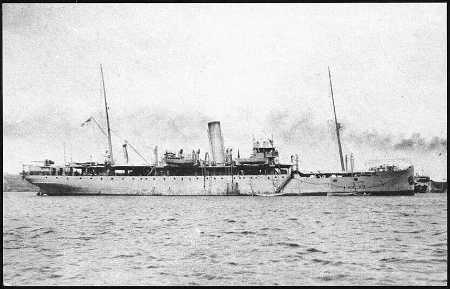
Believed to be HMS Suva. Photograph from http://www.naval-history.net
Frank Thorpe was born in Oldham on 4th June 1892, the son of Samuel Thorpe, a joiner. After attending Westwood School he came to Oldham Hulme Grammar School in September 1905 for two and a half years. On 5th September 1908 he was accepted as a learner by the Civil Service Commission and sent to Manchester Post Office. In 1910 he qualified as a telegraphist.
During the war he served as a radio operator with the Royal Naval Reserve. He appears to have served on a number of ships including HMS Suva in Bombay and Suez, and HMS Hannibal in the Mediterranean.
He died in 1972 at the age of 80.
Arthur Edward Oliphant Trewman was born in Sussex on 19th April 1893, the son of the Reverend A H C Trewman, a clerk in Holy Orders. He was educated privately before coming to Oldham Hulme Grammar School in April 1908. He left at Christmas 1909. In 1911 he was working as a farm pupil in Sussex.
When he attested in 1917 with the Gloucestershire Regiment for service during WW1 he was working as a poultry farmer in Bromsgrove. His medical condition was assessed as not being sufficiently good for overseas service and consequently he served in the UK. However, three months after joining he was discharged as permanently not fit for Army service.
In 1939 he was an unemployed poultry farmer living in Dorset. He died in Bournemouth in 1974 at the age of 81.
Percy Robinson Turner was born in Oldham on 25th May 1890, the son of Arthur Turner, an architect. After a private education he came to Oldham Hulme Grammar School in September 1903 for two years. He left school to start an apprenticeship with his father.
He attested with the Royal Engineers on 9th December 1915 and was placed on reserve until 17th May 1916 when he was posted as a sapper to a depot and then to the Hampshire Fortress. He appears to have served in the UK as an architectural draughtsman. However, on 6th October 1918 he was sent with the Royal Engineers to Northern Russia and remained there until he was demobilised on 16th September 1919.
In 1939 he was working as a chartered architect in Oldham. He died there in 1959 at the age of 68.
Harry Tweedale was born in Oldham on 6th September 1884, the son of Charles Thomas Tweedale, a solicitor. After attending Werneth Collegiate School he came to Oldham Hulme Grammar School in January 1896 for three years. In 1911 he was working as a chartered accountant's clerk.
He joined the Royal Marines as a private on 21st June 1915 and served at Chatham until 8th August 1916 when he was discharged 'invalided'. No further detail is available.
In 1939 he was a chartered accountant for the Electricity Board, living in Cheadle. He died in the Fylde area in 1969 at the age of 84.
James Twyerould was born in Oldham on 7th February 1888. He was sent to Oldham Hulme Grammar School in April 1900 for four years by the executors of his father's estate.
He served overseas during the war as a private with the Royal Army Service Corps. No further detail is available.
In 1939 he was working as an oily tallow manufacturer in Caernarvon and died there on 5th October 1955 at the age of 67.
John Maurice Underwood was born in Oldham on 19th March 1891, the son of Herbert Underwood, a post office clerk and telegraphist. After attending Werneth Board School he came to Oldham Hulme Grammar School in September 1903 for three years. He studied science subjects at Manchester University, graduating BSc in 1912. He became an assistant master at Aylwin College, Arnside from 1912 to 1914 before moving as mathematical master to Ashby-de-la-Zouch Boys' Grammar School.
In 1915 he joined the newly formed 1st Cadet Battalion of the Leicester Regiment. He is listed as an officer of the battalion and it is noted that he had three years previous Officer Training Corps experience while at Manchester University. It appears that he was not called upon to serve.
On 16th October 1918 he joined, from the Inns of Court Officer Training Corps, the RAF and was considered medically fit for becoming a pilot. However, he was demobilised on 10th November 1918.
He returned to teaching and in 1920 joined the staff of Orme Boys' School in Newcastle-under-Lyne, Staffordshire. He remained there until at least 1939. He died at Leamington Spa on 24th July 1959 at the age of 68.
Harold Austin Unsworth was born in Oldham on 18th April 1884. After attending Werneth Board School he came to Oldham Hulme Grammar School in September 1896 for two years. In 1911 he was working as a clerk in an ironworks.
Although his army records no longer exist, his medal card and medical notes show that he served as a gunner with the 48th Anti-Aircraft company of the Royal Garrison Artillery. An entry for 27th December 1917 shows that he was injured by a gunshot wound to the shoulder and also suffered from shell shock. A further entry for 8th April 1918 gives details of a 44 day hospital stay when he suffered abrasions to his leg. It would appear that, after this, he was transferred to the Royal Engineers; a form notes that he was a proficient engine driver. He received the Victory and British medals so served overseas at some point.
His address during the war was at Teignmouth in Devon and he returned to this area. In 1939 he was the proprietor of a private hotel in Torquay. He died in Totnes in 1950 at the age of 66.

The Military Cross,
awarded to officers for gallantry during
active operations against the enemy.
Charles Gilder Varley was born in Springhead, Saddleworth, on 2nd October 1893, the son of Thomas Varley, a managing director of a mill. After attending Knott Lane School he came to Oldham Hulme Grammar School is April 1902 for six years. In 1911 he was working as a clerk in a spinning mill but by 1915 had become a yarn salesman.
He initially attested with the West Riding Regiment but was posted as a private to the Machine Gun Corps in May 1916. He served in France and was promoted to corporal on 18th October 1916. He was discharged to cadet school and was granted a commission with the Machine Gun Corps on 25th July 1917. He was awarded the Military Cross for bravery in November 1917: "For conspicuous gallantry and devotion to duty. When suddenly called upon to replace officer casualties he reorganised the gun teams, and kept his guns firing for several hours under incessant shell fire, encouraging his men by going from team to team, regardless of personal danger. He rendered valuable assistance to his commanding officer under most difficult conditions."
In 1939 he was working as a cotton yarn salesman in Saddleworth. He died in Manchester on 22nd November 1954 at the age of 61.
Sydney Henry Cecil Vickars was born in Oldham on 15th July 1898, the son of Sydney Vickars, a pianoforte tuner. After attending Werneth Council School he was awarded a Foundation Scholarship to attend Oldham Hulme Grammar School in September 1910. He remained at school until the summer of 1914.
Although the records of his army service no longer exist his medal card shows that he served overseas as a private with the Lancashire Fusiliers.
He died in Oldham on 31st August 1939 at the age of 41.
Edward Viner was born in Plumstead, London, on 30th June 1889, the son of the Reverend A J Viner, a minister. After attending Werneth Board School he came to Oldham Hulme Grammar School in September 1899 for six years. He then entered Manchester University to study for a BSc degree and in 1911 was working as a mechanic on textile machinery.
Although no detailed army records are available, his rise through the ranks is listed in The Story of the Oldham Pals Battalion by K W Mitchinson and I McInnes. It would appear that he may have previously been a territorial member, possibly at university, of the Manchester Regiment and was a sergeant before the war. He was granted a commission as 2nd lieutenant on 10th December 1914 with the 24th Battalion of the Manchester Regiment and promoted to lieutenant on 1st February 1915. He served in France as signalling officer and, after promotion to captain on 2nd August 1915, commanding officer of 'B' Company. He then served as acting second in command of the battalion and was promoted to acting lieutenant colonel whilst commanding the battalion on 19th May 1917. He was mentioned in despatches on 7th November 1917 and hospitalised on 12th November 1917.
In 1919 he served as a major in command of the Cadre in Italy, for which he received a Distinguished Service Order on 3rd June 1919. After the war, he served for 18 months in the Uganda Rifle Volunteer Regiment.
According to a report in the Oldham Chronicle he became general manager of a group of mills in Mossley and Stalybridge. He died in Manchester in 1939 at the age of 50.
Harry Carlile Waddington was born in Oldham on 24th September 1895, the son of James Waddington, a factory operative. After attending Eustace Street Council School he came to Oldham Hulme Grammar School in September 1907 for two years. He worked as an accountant's clerk and trained to become an accountant.
He enlisted as a private with the Royal Army Medical Corps on 27th May 1915 and served with the 3/1st East Lancashire Field Ambulance alongside battalions of the Lancashire Fusiliers, East Lancashire Regiment and the Manchester Regiment in Egypt, Turkey, France and Belgium. He was promoted to acting lance corporal on 3rd February 1919. He served overseas for three and a half years with two brief periods of leave in 1917 and 1918. His service records give a complete diary of dates and countries as shown below.
In 1939 he is listed as an incorporated accountant and managing director, staying at the time at a hotel in London. He died in 1981 at the age of 85.
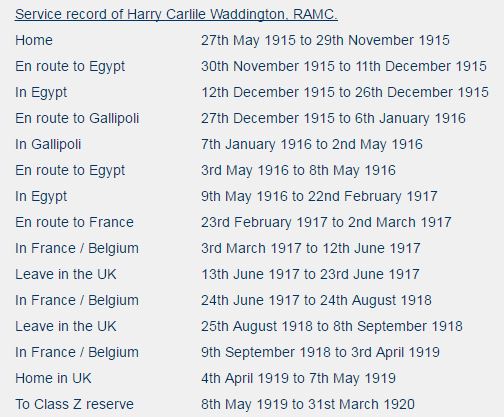
George Wade was born in Oldham on 2nd October 1886, the son of George Wade, a schoolmaster. After attending Christ Church School in Greenfield he came to Oldham Hulme Grammar School in January 1901 for two years. On leaving school he took up a career in banking.
He enlisted in Uppermill as a private with the 26th (Bankers) Battalion of the Royal Fusiliers and was deployed to France on 4th May 1916.
He was killed in action on 4th October 1916 at the age of 30.
He is commemorated at Thiepval, the memorial to the missing of the Somme, and also at Christ Church, Greenfield, and Pots and Pans Memorial.
George Edwin Wallace was born in Oldham on 15th December 1896, the son of Octavius Wallace, a carriage builder. After attending Werneth Council School he came to Oldham Hulme Grammar School in September 1910.
When he was conscripted into the army on 9th August 1916 he had only just left school, having stayed an extra year to complete his mathematical qualifications in order to enter university. He gave his preference as the Horse Transport Depot but was compulsorily transferred to the King's Royal Rifle Corps. He served in the UK until 13th January 1917 when he joined the 21st Battalion in France. He was given home leave for six months in early 1918 (it is not known if he had been injured at this time) before returning to France. He was granted three weeks leave after the sudden death of his mother due to the influenza pandemic in November 1918, but again returned to France, finally finishing his service on 20th January 1919.
It is thought that he probably went to Edinburgh University after the war. He married in the city in 1927 and died in Scotland on 13th June 1981 at the age of 84.
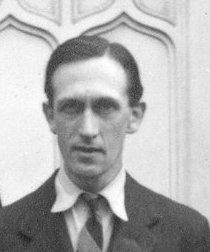
Charles Noel Walton.
Taken from a group photograph of Oldham Hulme Grammar School staff, 1942.
Charles Noel Walton, known as Noel, was born in Oldham on 14th December 1899, the eldest son of Charles Alexander Walton. He came from a musical family. His father had studied under Charles Hallé at the Royal Manchester College of Music before becoming an organist and peripatetic singing teacher - he taught at Oldham Hulme Grammar School from 1915 until shortly before his death in 1924, providing 4 singing lessons per week. Mother Louisa Maria Turner had been a singer. His brother, Sir William Turner Walton, became Oldham's famous classical composer.
Charles Noel Walton was educated privately before coming to Oldham Hulme Grammar School in April 1909 for four years. He left in 1913 to study at the Royal Manchester College of Music, graduating Associate of the Royal Manchester College of Music in 1922.
During the war he served with the Royal Naval Air Service from 27th December 1917, and transferred to the Royal Air Force on 1st April 1918 where he served as a winch driver and fitter. He appears to have served in the UK only. On his application form he gives his occupation as salesman so he was probably working part-time to finance his studies.
He finished his studies in 1922 and from 1923 he took over his father's work as a peripatetic singing teacher for Oldham Education Authority and at other schools in the area including Oldham Hulme Grammar School where he continued to provide singing lessons until 1937 when he was employed full time as music master.
He left the boys' school in 1945 to become music master of the girls' school where he remained until 1961.
He died in 1981 at the age of 81.
Sydney Warhurst was born in Springhead on 15th February 1893, the son of T S Warhurst, a commercial traveller. After a private education he came to Oldham Hulme Grammar School in January 1904. He left school in July 1909 to become a commercial traveller and representative for a corn miller.
He joined the Public Schools Battalion of the Royal Fusiliers in January 1915 as a private and served in France from November 1915. He was wounded in 1916.
In 1939 he was a salesman for a miller. He emigrated to South Africa in 1952 and died there in 1971.
Daniel Watkinson was born in Oldham on 16th November 1896, the son of Daniel Watkinson (deceased), a cotton mill engineer. The family lived in Middleton. After attending St Mark's School he was awarded a Lancashire County Council Scholarship to attend Oldham Hulme Grammar School from September 1909. He left in the summer of 1915 to take up work as a teacher.
He appeared before a tribunal at Chadderton on 13th March 1916 to appeal for exemption from military service on religious grounds; he was a teacher and studying for the Primitive Methodist Ministry. He said he was not willing to serve in the RAMC and was sent to the non-combatant force. He again appealed and at a hearing on 25th May 1916 was given ten days to find work of national importance. There are no further reports.
In 1939 he was working as a sales supervisor for a meat buyer. He died in Blackpool in 1975 at the age of 79.
William Reginald Webster was born in Oldham on 22nd January 1895, the son of J W Webster, a pharmacist. After a private education he came to Oldham Hulme Grammar School in January 1910 for one year.
He initially served in France as a private with the 25th Battalion of the Manchester Regiment from July 1916. Shortly after arriving in France he transferred to the 12th Squadron of the Royal Flying Corps as a driver. He gave his civilian occupation as chauffeur. He remained in France until February 1919.
In 1939 he was a shop keeper in Southport. He died in Sefton in 1981 at the age of 86.
Albert Mason White was born in Ashton-under-Lyne on 30th June 1899, the son of Ernest White, a travelling salesman. After a private education he attended Oldham Hulme Grammar School from February 1910 for four years. On leaving school he took up an engineering apprenticeship, possibly with the National Gas Engine Company.
He enlisted at Oldham as a private with the 3rd Battalion of the Manchester Regiment on 19th October 1915. He was sixteen years of age but claimed to be nineteen. He appears to have been a lanky lad standing at 5'9½" with a chest of 24½ inches. Whether or not his age or his skinny frame was noticed is not apparent, but he was found to be 'not physically fit for war service' due to his extremely myopic eyesight. He was discharged on 12th June 1916.
In 1939 he was a motor salesman living in Abergele. His first wife who he had married in 1922 was killed in a cycling accident in 1940 and he remarried in 1943. He died in 1958 at the age of 58.
Henry Whitehead was born in Hollinwood on 10th October 1882, the son of Joseph Edward Whitehead, an assistant overseer. After attending Denton Lane Church School he came to Oldham Hulme Grammar School on the day it opened in May 1895. He left in the summer of 1900 to start a medical course at Manchester Victoria University.
He graduated as a physician and surgeon MB ChB (Victoria) and MB BS (London) in 1907 and started his residency at Manchester Royal Infirmary in 1908. He had a paper relating to Typhoid published in The Lancet on 14th October 1911.
He was granted a commission with the Royal Army Medical Corps and served in Egypt from 20th December 1915. He was later promoted to the rank of captain.
After the war he continued to practice medicine and was appointed Medical Officer of Health for Wigan on 21st March 1921.
He died on 27th September 1964 at the age of 81.
Hervey Whitehead was born in Saddleworth on 31st December 1894, the son of Albert Whitehead, a storekeeper of Brownhill Bridge, Dobcross. He attended Dobcross National School before coming to Oldham Hulme Grammar School for a calendar year in January 1908. In 1911 he was working as an iron turner.
He enlisted at Oldham as a private with the 11th Battalion of the Royal Fusiliers. It is not known when he was sent to France and Belgium as we have been unable to find a medal card.
He was killed in action during the third battle of Ypres on 10th August 1917 at the age of 22.
He is commemorated at the Menin Gate Memorial at Ypres, the memorial to the missing of the battles of Ypres. He is also commemorated locally on Pots and Pans Memorial.

The Military Medal,
awarded to non-commissioned personnel
for acts of bravery in battle.
Joseph Whitehead was born in Royton on 2nd October 1887, the son of J E Whitehead, a cotton spinner. After a private education he came to Oldham Hulme Grammar School in May 1897. He left school at Easter 1902 to start work as a clerk in a cotton mill. In 1916 he was secretary at the Junction Spinning Company.
He enlisted with the Manchester Regiment on 5th March 1916. While serving in France he was transferred to the King's Liverpool Regiment. He was awarded the Military Medal in 1917.
In 1939 he was manager of a mill in Oldham. He died on 22nd November 1955 in Oldham at the age of 68.
Samuel Carter Whitehead was born in Oldham on 27th October 1899, the son of S Whitehead, a contractor. After attending Derker Council School he came to Oldham Hulme Grammar School in April 1908 for a little over four years.
He appears to have joined a cadet contingent shortly after his 18th birthday and was granted a commission after the end of the war on 30th December 1918 as temporary 2nd lieutenant with the Royal Regiment of Artillery. No further information is available.
In 1939 he was a cotton broker living in Southport. He died in Liverpool in 1968 at the age of 68.
Vincent Whitehead was born in Saddleworth on 27th June 1888, the son of R T Whitehead, a printer. After attending Waterloo Board School he came to Oldham Hulme Grammar School in September 1902 for a little over a year. In 1911 he was working as a stationer's assistant.
A mention in the Oldham Chronicle confirms that he served as a trooper in the Warwickshire Yeomanry but no further information is available.
He died in Saddleworth in 1935.
Edmund North Whittaker was born in Oldham on 31st January 1892, the son of S Whittaker, an agent. After a private education he came to Oldham Hulme Grammar School in September 1901 for six years. In 1911 he was working in a cotton mill as a cotton yarn tenter.
Although no service records remain we know from The London Gazette that he initially served as a private with the King's Liverpool Regiment. He was granted a commission as 2nd lieutenant with the 10th Battalion of the Manchester Regiment on 17th September 1915 and served in the Mediterranean from March 1916.
After the war he continued to learn the cotton trade and in 1939 was a yarn merchant. He died in the Stockport area in 1975 at the age of 83.
Frank Whittaker was born in Oldham on 14th December 1894, the son of H Whittaker, a pork butcher. After attending Waterloo Council School he came to Oldham Hulme Grammar School in September 1907 for six years. He was awarded a leaving exhibition to St John's College, Cambridge University in 1913.
Due to the war he had to discontinue his studies. He joined the Young Men's Christian Association, travelling to India in July 1915. He completed his studies after the war and returned to India as a Wesleyan Minister and Missionary in 1923. Much of his work was done in the city of Medak in the area of Andhra Pradesh in central southern India. He became the first head of the Normal Training College in Medak and, in 1947, the first Bishop of the Church of South India.
He died at Dornakal, India, on 10th December 1961 at the age of 66.
Frank Whittaker Wild was born in Oldham on 28th August 1890, the son of John Wild, a cashier. After a private education he came to Oldham Hulme Grammar School in April 1902 for almost three years. In 1911 he was assistant secretary in a cotton mill.
He attested at Royton on 10th December 1915 as a private with the Royal Fusiliers and was posted on 9th August 1916 with the 7th Battalion, transferring in France to the 4th Battalion. He served in France until July 1917 when he was discharged as no longer physically fit for war service due to what appeared to be an illness.
In 1939 he was a raw cotton salesman. He died on 8th March 1942 in Oldham at the age of 51.
Tom Wild was born in Sydney, Australia, on 8th January 1886. His father, John Thomas Wild, had emigrated from Oldham with his wife and two daughters in February 1884. The family returned to Oldham before 1899. Tom attended Werneth Board School before coming to Oldham Hulme Grammar School in September 1899 for a little over a year. After leaving school he initially became an apprentice to a machine fitter but by 1911 was working for his father as an oil dealer.
He joined the Royal Flying Corps as 2nd aircraft mechanic on 7th July 1916 and was promoted to 1st aircraft mechanic on 1st June 1917. He embarked to France on 4th October 1917, serving at the repair depot of 28 Squadron before being transferred to the repair depot of 82 Squadron in the Somme area of France. He was admitted to hospital in France on 10th June 1919 but no further information is available. He was discharged from the service on 30th April 1920.
In 1939 he was a shopkeeper in Bury. He probably died in Heywood in 1960 at the age of 74.
William Wild was born in Oldham on 12th September 1887, the son of A K Wild, a carrier. After attending Werneth Board School he came to Oldham Hulme Grammar School in April 1900 for one year. He joined his father's business as a carrier after leaving school.
When he joined the army in 1916 it was noted that he had lost his left eye in a machinery accident in about 1908. He was enlisted as a private with the Army Service Corps and appears to have worked as a cook at a depot in the UK. He was discharged on 14th December 1918.
He died in Shaw on 26th October 1938 at the age of 51.
William Wild was born in Failsworth on 1st December 1896, the son of Arthur Wild, manager of a cotton mill. He attended Werneth Council School before coming to Oldham Hulme Grammar School in October 1909 for a year and a half. In 1915 he was working as a clerk.
He enlisted at Oldham as a private with the Royal Fusiliers on 10th December 1915 and, the following day, was posted to the army reserves. He was then moved to the Manchester Regiment Depot on 24th January 1916.
A medical examination on 19th June 1916 noted that his visual acuity was less than normal and he was prescribed spectacles. He was posted to France and joined his battalion in the field on 5th August 1916.
By the end of December 1916 he was suffering with septic feet and, after being in a field hospital for some time, was transferred to England at the end of January 1917 and admitted to hospital suffering from 'trench feet'.
After 76 days he was discharged from hospital and granted a week's leave at home. On 13th June 1917 he was transferred to the 3rd Battalion of the Manchester Regiment and returned to France a month later. He was then transferred to the 9th Battalion of the Manchester Regiment on 28th July 1917.
He was missing in action on 21st March 1918 and was assumed dead ten days later. He was 21 years of age.
His service papers contain a letter from his father who had written to the authorities on 26th April because he had not received any communication from his son for some time. Another letter from his father dated 20th November 1919 requests information concerning his son's burial place. His personal effects consisting of a disc, wallet, broken watch with strap, national registration card and photographs were returned to his father on 10th January 1920 and his war medals were sent in May 1922.
On 28th December 1920 his body was exhumed and reburied at the Hangard Communal Cemetery in the Somme area of France.
John Howard Wilde was born in Oldham on 3rd August 1897, the son of Asa Wilde, a cotton spinner. After a private education he came to Oldham Hulme Grammar School in January 1907 for five years.
Although there are no detailed records of his army service his medal card shows that he joined the Honourable Artillery Company as a private. He was granted a commission with the Lancashire Fusiliers on 26th March 1918. He served overseas.
In 1939 he was living in Stockport and working as a raw cotton broker. He died in Manchester in 1965 at the age of 68.
Randal White Wilde was born in Oldham on 25th November 1888, the son of Herbert Wilde, JP, Merchant and Manufacturer, Mayor of Oldham in 1913 and a governor of Oldham Hulme Grammar School and many other schools and institutions.
He had a private education before coming to Oldham Hulme Grammar School in January 1899 for six years. After leaving school he graduated BSc in mathematics from Manchester University before becoming a cotton salesman.
He had been a member of the 10th (territorial) Battalion of the Manchester Regiment for some years prior to the war, and was granted a commission on 31st March 1909. He sailed with the battalion from Southampton on 20th September 1914 to serve in Egypt until May 1915 when the battalion was transferred to Gallipoli.
On 6th June 1915 he was rendered unconscious by a bursting shell and, after being on a hospital ship for a week, he was taken to the Blue Sisters Hospital in Malta. He was then transferred to hospital in England and discharged home in early July. On his return he gave an interview to the Oldham Chronicle (see below) in which he told of the conditions in Gallipoli. The earlier letter (shown on the right) to his father had also been published.
He resigned his commission due to ill health on 16th December 1917.
Shortly afterwards, on 9th January 1918, he made the first of many trips to the USA as a cotton broker. On his outward trip in May 1919 he was accompanied by his wife. From US census information she appeared to be about 13 years his junior and married at the age of 18. She was from Tennessee, but neither further details nor a marriage record can be found.
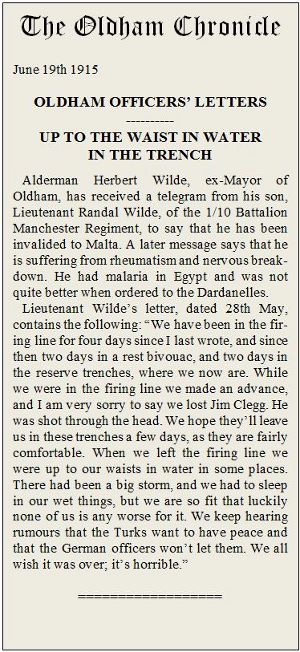
During the early 1920s he continued to travel between the UK and USA, giving his UK address as the Adelphi Hotel in Liverpool. His military medals were sent to him at the Los Angeles Cotton Exchange. His partnerships, Wilde and Bartlett, and Wilde and Kerridge, were dissolved in 1923 and 1925 respectively. On 30th October 1925 he took the first steps to becoming an American citizen (see application below). At the time he was resident in Memphis, Tennessee . He was naturalised on 25th June 1943. He received military draft registration cards in the USA for both WW1 and WW2.
After his wife died in 1950 he may have remarried. He lived in Los Angeles throughout the 1930s and 1940s. He died in 1985 at Studio City, Los Angeles, at the age of 96.
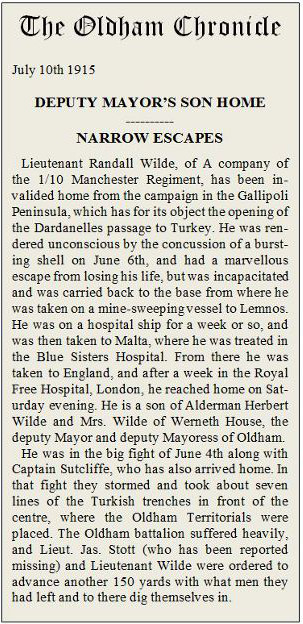
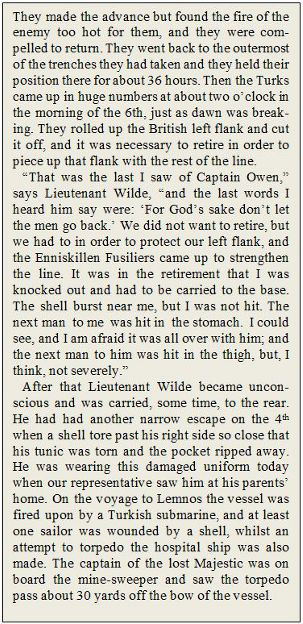
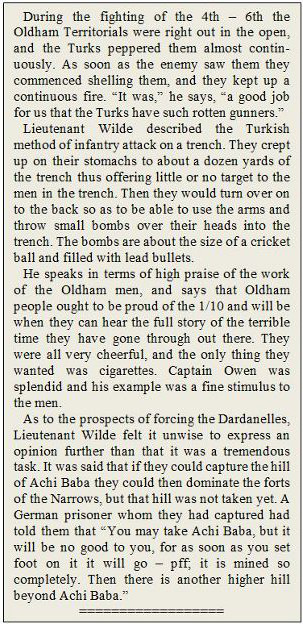
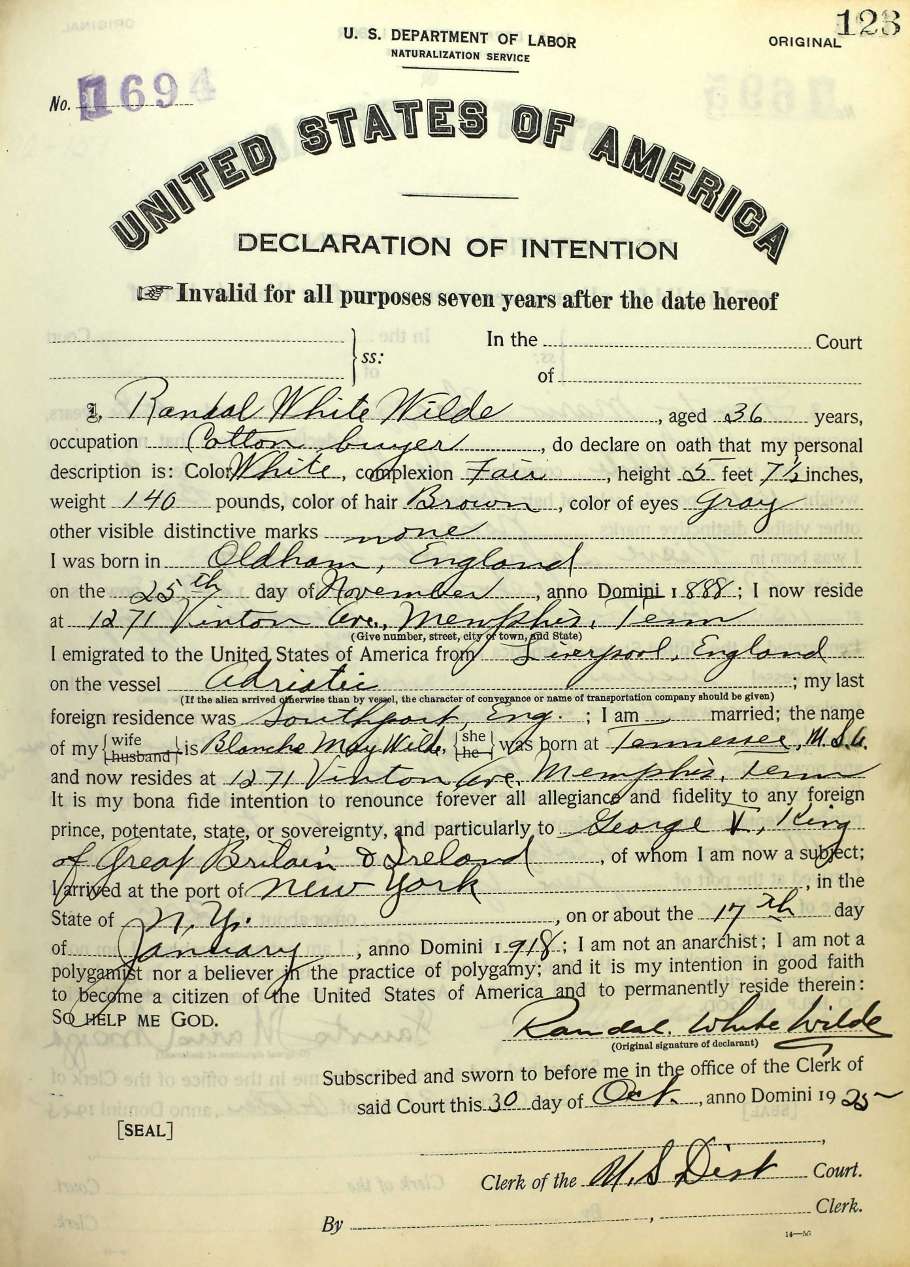
Application for American Citizenship, 1925.
Wenden Ray Wilde was born in Oldham on 16th February 1893, the son of William Wilde, a policeman and fireman. He attended Waterloo Council School before coming to Oldham Hulme Grammar School in September 1904 for five years.
He graduated in 1914, BSc 1st class honours in mathematics from Manchester Victoria University. Prior to enlisting he was senior mathematical master at Carmarthen Grammar School.
He enlisted on 10th January 1916 as a private with the 20th Battalion (3rd Public Schools Battalion) of the Royal Fusiliers in France. He was promoted to the rank of lance corporal and recommended for a commission but died before he could accept it.
He was killed in action in France on 16th April 1917 at the age of 24. He is commemorated at Arras, the memorial to the 35,000 soldiers who died in the area and have no known grave. He is also commemorated in Carmarthen.

The Military Cross,
awarded to officers for gallantry during
active operations against the enemy.
Lionel St George Wilkinson was born in the Oldham area on 29th March 1886, the son of Dr J B Wilkinson, Medical Officer of Health for Oldham Corporation. He was educated privately before coming to Oldham Hulme Grammar School for five years from April 1898. After practical training at the Whitworth Engineering Laboratory he studied at Manchester University, graduating in 1907 with a BSc Honours Degree in Engineering.
He then worked as an assistant to the Borough Engineer at Luton, Bedfordshire, before returning to Oldham in 1909 as Assistant Engineer at the Oldham Corporation Waterworks. He was awarded a master's degree in engineering from Manchester University in 1910.
In 1912 he became an associate member of the Institution of Mechanical Engineers and relocated to Huddersfield as Chief Engineering Assistant in the Borough Engineer's Department. After the war in 1919 he became a member of the Institution of Civil Engineers and relocated to Crewe where he became Borough Engineer and Surveyor.
In 1944 he was president of the Institution of Municipal and County Engineers and, at the time of his death the following year, was Borough Engineer and Surveyor for Wallasey in Cheshire.
He married in 1930 and died suddenly on 19th February 1945, aged 58.
Wilkinson, already a member of the territorial 10th Battalion of the Manchester Regiment, was granted a commission on 24th January 1911. He was promoted to lieutenant prior to the war, and to captain before 1918.
During the war he served with the 10th Manchesters in Egypt, Gallipoli, Sinai and France for a total of three years and five months. His position was that of adjutant (for 18 months) and staff captain (for 21 months); these are administrative rolls as the following excerpt from Amateur Soldiers by K W Mitchinson would suggest:
"The 10th's five-day march from Proven to the Channel coast in September had done wonders for morale. The division had passed through areas untouched by war, where the colours of autumn and the absence of gunfire lightened spirits as well as steps. Villagers welcomed them to their overnight billets and waved them a cheery farewell in the morning. With a friend in high places, the battalion was allotted some rather superior billets when it arrived at La Panne. Captain Wilkinson, one of the 10th's original officers who had served with the battalion on Gallipoli, was now a brigade staff captain. It was generally suspected that he had spied some comfortable billets and decided that they would be suitable for his former comrades." This seems to refer to a point in the latter part of 1917 when he was attached to the Machine Gun Corps.
He also served temporarily at the rank of major for three months. He was awarded the Military Cross in January 1918; the citation is not available but it was possibly for actions in an earlier campaign.

Officers of the 10th Manchester Regiment, August 1912. Photograph from "Amateur Soldiers" by K W Mitchinson.
Percy Williams was born in Crompton on 14th May 1893, the son of H F Williams, a schoolmaster. After attending Shaw British School he came to Oldham Hulme Grammar School in September 1906 for two years. In 1911 he was working as a clerk for the Co-operative Society but prior to joining the army he was a clerk for the Shaw and Crompton Council.
He served as a sapper with the Royal Engineers during the war. No further information is available.
In 1939 he was a Local Government Officer and Town Clerk of Padiham. He died in the New Forest area in 1971.
Frank Miles Williamson was born in Ashton-under-Lyne on 16th December 1899, the son of F Williamson, a printer. After attending Christ Church School in Ashton he came to Oldham Hulme Grammar School in September 1912 for two and a half years.
He joined the Royal Naval Air Service as a mechanic on 31st December 1917, shortly after his 18th birthday. He served at Crystal Palace and Wormwood Scrubs, both training depots. His service continued with the Royal Air Force when the RNAS and other services were combined in April 1918. He served in the UK.
After the war he probably went back to the family printing business. In 1939 he was working as a master printer in Stalybridge. He died in that area in 1971 at the age of 70.
Wilfred Florian Windle was born in Oldham on 17th September 1892, the son of J H Windle, a jeweller. After attending St Patrick's School he came to Oldham Hulme Grammar School in September 1907 for four terms. In 1911 he was working as a clerk in a cotton mill.
It is possible that he served in France with the Royal Engineers before transferring to the Royal Flying Corps as an aircraft mechanic on 3rd August 1917. His trade classification was given as a wireless operator and he served in France from 3rd November 1917 to 4th November 1918, during which time he was troubled by trench foot. He was placed on reserve on 10th March 1919.
After the war he worked as a watchmaker (probably the family business) before emigrating with his wife and son to Australia on 23rd April 1927. Electoral registers for New South Wales for the years 1930 to 1933 show him listed as a watchmaker. He died there on 5th October 1934 at the age of 42.
Arthur Winterbottom was born in Oldham on 31st January 1890, the son of William Winterbottom, a clerk. After attending Werneth Board School he came to Oldham Hulme Grammar School in April 1901 for four and a half years. In 1911 he was working as a bank clerk.
Arthur's family were active members of Union Street Congregational Church and he claimed absolute exemption from military service because he believed all war to be wrong and contrary to the highest religious and moral instincts of humanity. He appeared before a tribunal at Oldham on 3rd July 1916 which exempted him from combatant service only. He had to attend a medical board which declared him unfit for hard physical work, possibly due to a childhood injury. At a tribunal in Manchester he was told to find work of national importance and worked on the land in the Oldham area for the remainder of the war.
Remaining in Oldham allowed him, along with his wife and sister, to participate as conscientious objectors in peace activities in the town. On Monday 6th August 1917 he took part in a rally organised by the Independent Labour Party. Some members of the New Zealand Field Artillery who were based at Chadderton Park turned on some of the pacifists and Arthur was badly beaten. After this the meetings planned for later in the week were cancelled.
After the war Arthur, along with his wife, parents and sister moved to Congleton where he set up as a market gardener. He died there on 2nd November 1960 at the age of 70.
Fred Wolfenden was born in Oldham on 20th March 1890, the son of James Wolfenden, a foreman. After attending Freehold Board School he came to Oldham Hulme Grammar School in September 1901 for six years. In 1911 he was working as an elementary school teacher in Oldham.
He enlisted at the beginning of the war as a private with the Public Schools Battalion of the Royal Fusiliers and on 15th January 1915 was granted a commission with the 24th Battalion of the Manchester Regiment. He was promoted to captain on 7th September 1915 and placed second in command of 'e' company. He served in the Somme area of France until August 1916 when it was reported that he had been injured and captured as a prisoner-of-war at the town of Guillemont. He was taken to the POW camp at Gutersloh, some 400km away in Germany. There is no further information and it is not known when he was repatriated or if he took any further part in the war.
In 1939 he was a retired schoolmaster living in Crompton. He died in Middleton in 1941 at the age of 50.
Charles Wolstencroft was born in Crompton on 6th June 1885, the son of John Wolstencroft, a manager. After attending East Crompton School he came to Oldham Hulme Grammar School in September 1897 for four years. In 1911 he was secretary and assistant salesman for Messrs James Cheetham & Sons Ltd in Shaw.
He served as a gunner with the Royal Garrison Artillery and, after being wounded in August 1917, was taken to hospital in Helensburgh, Scotland. No further information is available.
He died in Oldham in 1926.
Edward Henry Wood was born in Oldham on 7th August 1890, the son of Mrs Wood, a publican of the Red Lion Hotel. He came to Oldham Hulme Grammar School in January 1899 for two years. It is not known where he continued his education. In 1911 he was working as a brewery clerk.
He attested on 2nd September 1914 as a private with the 1st City Battalion of the Manchester Regiment. He was transferred to the 16th Battalion and served with them in France from 8th November 1915 until the end of the war. During that time he suffered a number of minor illnesses and 'debilities', all of which were treated in the field. He received ten days leave in the UK in September 1917.
In 1939 he was working as chief dispatch clerk for a brewery in Macclesfield. He died in Saddleworth in 1950 at the age of 60.
John Buckley Wood was born in Hollinwood on 4th August 1884, the son of J B Wood, a coal merchant. After attending Bourne Street British School he came to Oldham Hulme Grammar School in September 1895 for four years. He joined the family business and took over when his father died in 1906.
Although no service records exist The London Gazette reports on 8th January 1918 that he was granted a commission as 2nd lieutenant with the Royal Garrison Artillery. His medal card shows that he initially served with them as a bombardier and was posted to France on 22nd February 1918. There is no further information.
He died in Oldham on 14th December 1937 at the age of 53.
Thomas Woolstencroft was born in Oldham on 22nd February 1892, the son of Robert Frederick Woolstencroft, a wholesale draper and milliner. After attending Arnold House School in Blackpool, he came to Oldham Hulme Grammar School in January 1905 for a little over three years. He left school to go into the family business, serving as an assistant.
He enlisted on 27th October 1915 as a driver (motor transport) with the Royal Army Service Corps. He served in France from 10th November 1915 until 1st March 1918 when he suffered a right inguinal hernia due to the heavy lifting work. He underwent successful surgery at Manchester Royal Infirmary in March 1919 and was discharged from the service on 5th June 1919.
In 1939 he managed the family business.
Arthur Walter Wooster was born in Chippenham, Wiltshire, on 26th September 1881, the son of Walter Henry Wooster, a postmaster. After attending Waterloo Higher Grade School he came to Oldham Hulme Grammar School when it first opened in May 1895. After leaving school he took up an apprenticeship with the post office and in 1901 was working in Oldham as a sorting clerk and telegraphist. By 1911 he was living as a lodger in Swindon and working as a post office clerk.
He was drafted in November 1915 and sent to France as a sapper with the Royal Engineers 63rd Signal Company on 17th June 1916. As a skilled telegraph operator his pay was raised to a higher rate.
He died in Luton, Bedfordshire in 1939 at the age of 57.
Gerald Herbert Wooster was born in Chippenham, Wiltshire, on 10th November 1886, the son of Walter Wooster, a postmaster. He attended Waterloo Board School before coming to Oldham Hulme Grammar School for five terms from May 1897. He left at the end of 1898 when his father's work caused the family to move from the Oldham area. He then attended King Edward's School in Bath before starting a career in banking.
He enlisted on 6th September as a private with the 1st Battalion of the East Surrey Regiment, having previously served four years as a volunteer reserve.
He was promoted to lance corporal on 4th February 1916 and on 14th March was fitted with an artificial denture. He embarked for France on 29th March, joining his battalion in the field on 21st April. In May he was treated for scabies but soon re-joined his battalion.
On 29th July 1916 he was wounded and listed as missing in action, later confirmed as killed in action, at the age of 29.
He is commemorated at Thiepval, the memorial to the missing of the Somme.
Sidney Charles Wormald was born in Oldham on 13th May 1881, the son of Thomas Wormald, a dentist. After attending Waterloo Higher Grade School he came to Oldham Hulme Grammar School when it first opened in May 1895. He left school in 1898 and in 1901 was working as a clerk. By 1911 he had become a commercial traveller for a clothing manufacturer.
Although no detailed records exist his medal card and London Gazette entries show that he was granted a commission with the 7th Battalion of the West Riding Regiment and served with them overseas. He was promoted to captain.
In 1939 he was a hotel proprietor living in Wiltshire; the form noted that he was a retired Territorial Army captain. He died in Blackpool in 1955 at the age of 74.

The Military Cross,
awarded to officers for gallantry during
active operations against the enemy.
James Fletcher Worrall was born in Hollinwood on 26th April 1893, the son of Walter Worrall, a cotton carder who died in 1905. He attended Waterloo Secondary School before coming to Oldham Hulme Grammar School for two years from September 1908. After leaving school in 1910 he spent a year as a pupil teacher before attending the University of Manchester, taking the intermediate examination in science. He then attended the Elementary Training Department at the university.
While at university he enrolled with the officer training corps and was granted a commission with the 8th Battalion of the King's Liverpool Regiment on 23rd August 1915. He was later promoted to lieutenant and then to captain, serving in France from 1915 to 1920. He was awarded the military cross in 1918, but no citation is available.
After the war he became 1st assistant master at Poplar Street Senior School in Audenshaw.
He died in 1942 at the age of 49.
James Wrigley was born in Crossbank, Lees, on 15th August 1892, the son of William Wrigley, a cotton spinner. He attended Hey Church School before coming to Oldham Hulme Grammar School in September 1905 for six years. After leaving school he attended teachers' training college in Sheffield and, just prior to the war, had accepted an appointment in London.
He enlisted as a private with the Royal Army Medical Corps in April 1915 and was posted to Flanders on 5th May. He was granted a commission with the Royal Garrison Artillery on 2nd February 1917 and continued to serve in Flanders.
He was killed in action on 29th September 1917 at the age of 25.
He is commemorated at Klein-Vierstraat British Cemetery in Belgium.
James Albert Victor Wrigley was born in Shaw on 12th July 1887, the son of James Wrigley, a publican. After attending East Crompton School he came to Oldham Hulme Grammar School in April 1900 for almost two years. In 1911 he was working as a clerk in a cotton spinning mill.
Although no detailed records exist his medal card shows that he served overseas as a private with the Manchester Regiment, the Labour Corps and the Lancashire Fusiliers.
He died at Shaw on 25th October 1925 at the age of 38.
Reginald Whittering Wrigley was born in Chadderton on 27th October 1899, the son of G H Wrigley, a yarn merchant. After attending Eustace Street Council School he came to Oldham Hulme Grammar School in November 1911 for a year and a half.
Although no service records exist he appears to have served as a private with the South Wales Borderers before being transferred to a Training Reserve Battalion. He then served overseas with the Cheshire Regiment. No further information is available.
In 1939 he was secretary of a cotton spinning mill in Crompton. He died in Fleetwood on 16th December 1998 at the age of 99.
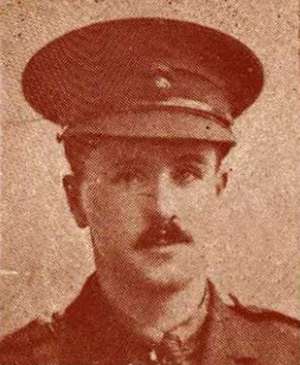
Frank Irvin Young.
Photograph from the "Oldham Chronicle,
14th War Supplement", 23rd December 1916.
Frank Irvin Young was born in Jesmond, Northumberland, on 13th January 1884, the son of Dr Ralph Young, a general practitioner. He attended Rochdale Higher Grade School before coming to Oldham Hulme Grammar School in September 1896 for three years. After some time at Knutsford Grammar School, he became a student of dentistry at Manchester University. In 1911 he was an assistant dentist living in Darlington, County Durham.
He married in 1914 and moved to Bishop Auckland, County Durham. A daughter was born in early 1916.
He was granted a commission with the 1st Battalion of the Northumberland Fusiliers in February 1915, and had probably been a reserve member prior to the war.
He was deployed to France on 11th May 1916 and killed in action on 25th July 1916 at the age of 32.
He is commemorated at the Quarry Cemetery in Montauban, France, and on Royton War Memorial.
Henry George Young was born in Royton on 18th July 1895, the son of Dr Ralph Young, a general practitioner. He attended Castleton House School in Rochdale before coming to Oldham Hulme Grammar School in January 1910 for two and a half years.
He served as part of the home guard with the 151st Protection Company of the Royal Defence Corps during the war.
He died from pneumonia at a hospital in South Shields, County Durham, while still in service on 19th December 1918 at the age of 23.
He was buried at Royton Cemetery and is commemorated on Royton Memorial.
Robert Young was born in Oldham on 2nd July 1889, the son of Robert Young, an electrician. He attended Waterloo Board School before coming to Oldham Hulme Grammar School in September 1902. He left school in July 1906 to attend Manchester University where he graduated MSc. Before the war he was a resident master at the Deaf and Dumb Institute in Newcastle.
He was granted a commission as a lieutenant with the Royal Fusiliers and later served as captain. On 31st July 1917 he was taken as a prisoner-of-war at Roulers and transferred to the Karlsruhe Prison Camp on 6th August. It is not known when he was released or if he served later in the war.
In 1925 he was working at Dinsdale Park Residential School in County Durham and, in 1939, was head teacher at a school for 'mentally defective' children in Darlington.
Walter Ernest Young was born in Newcastle, Northumberland, on 12th September 1880, the son of Dr Ralph Young, a general practitioner. He attended Rochdale Higher Grade School before coming to Oldham Hulme Grammar School when it first opened in May 1895. He left in the summer of 1897.
He spent his career as a marine engineer, serving in both the first and second world wars as a chief engineer with the merchant navy.
He died in 1952 at the age of 71.